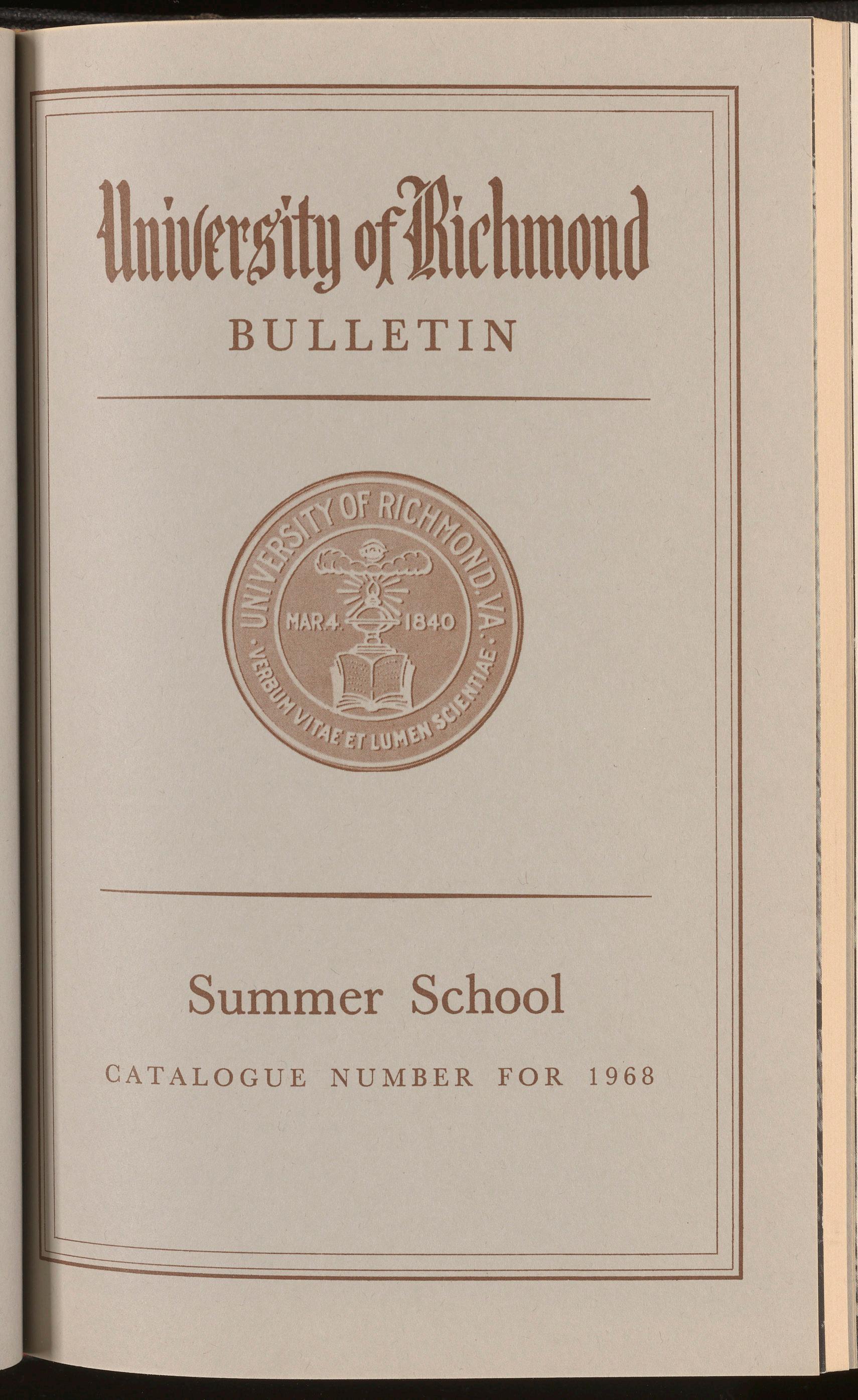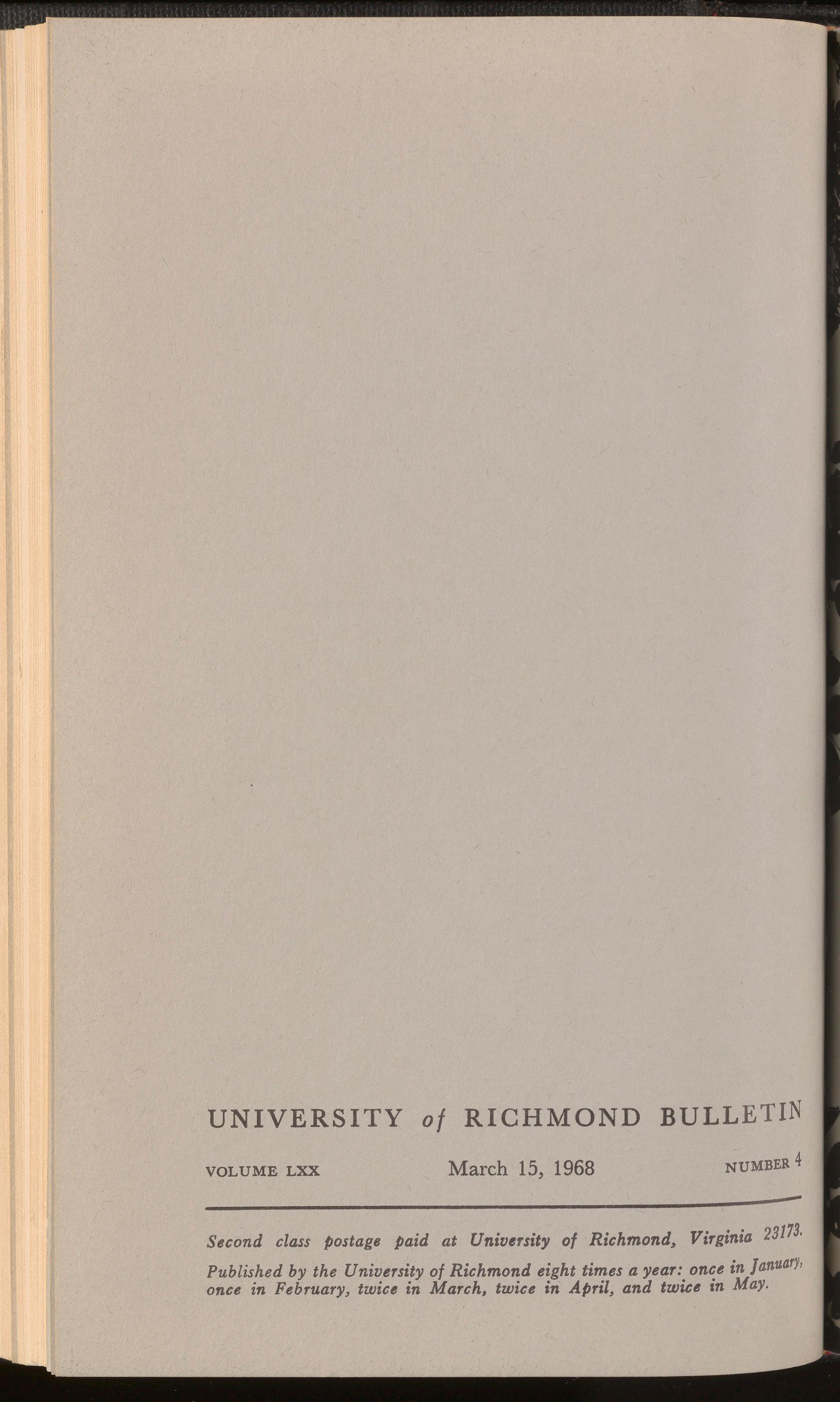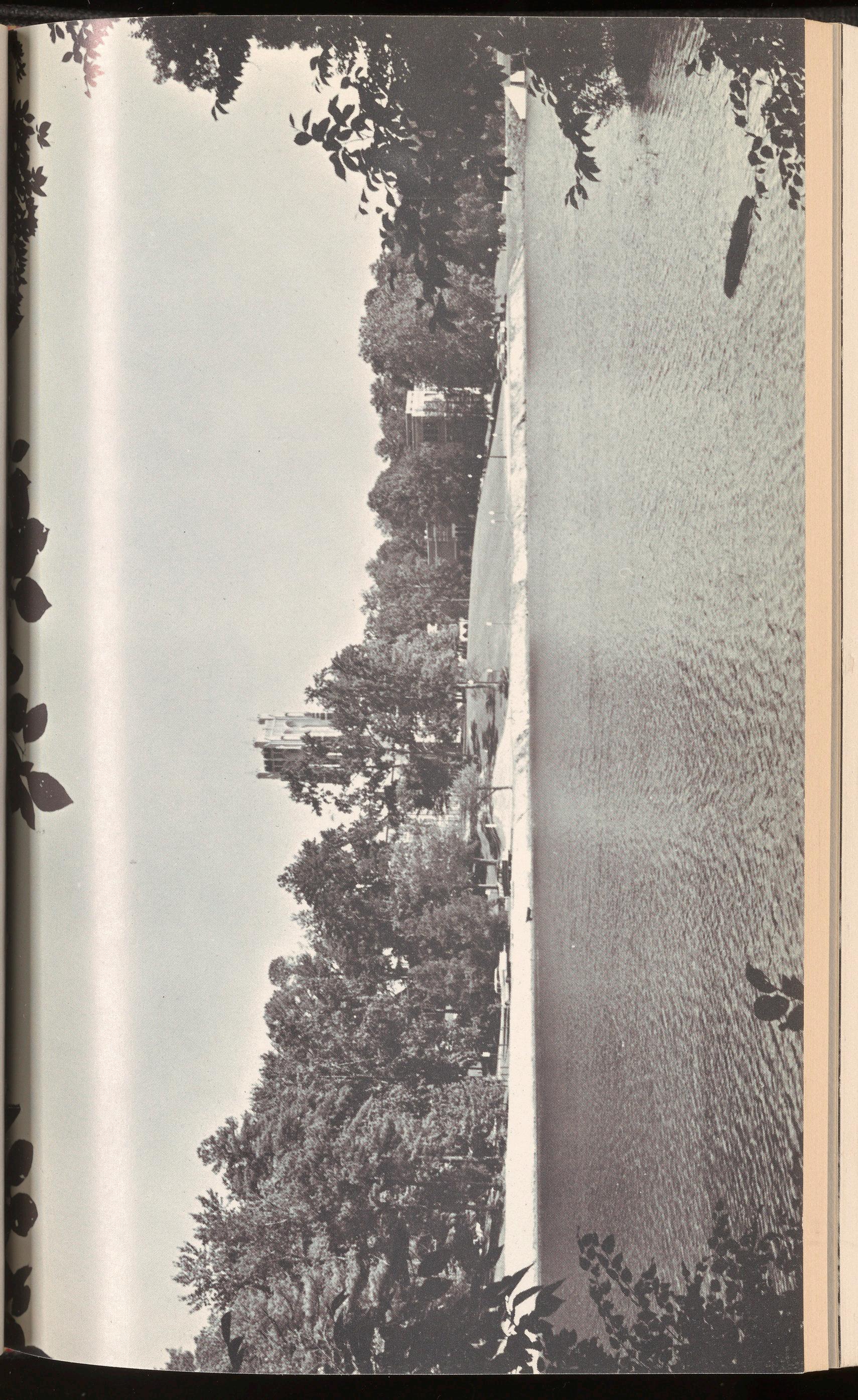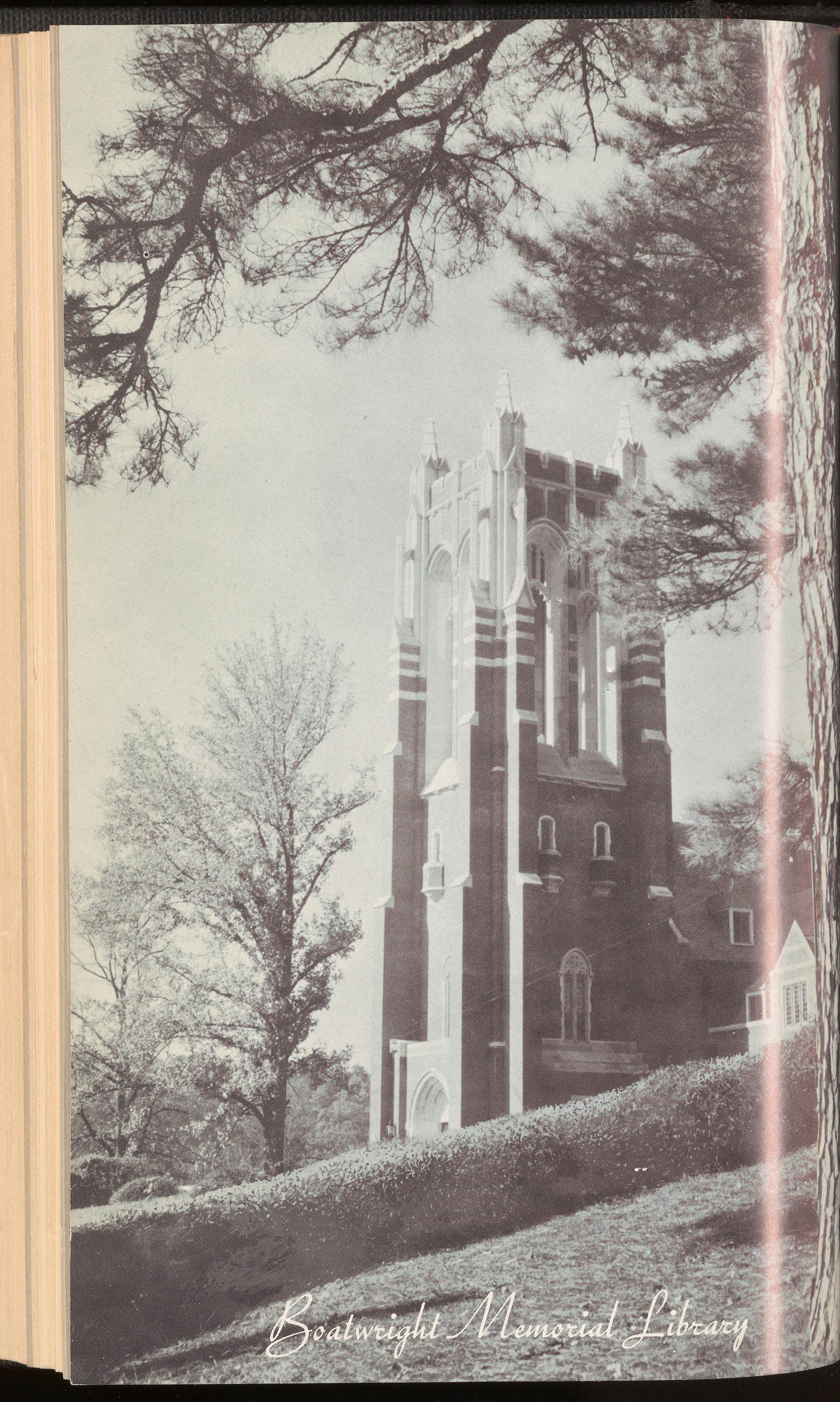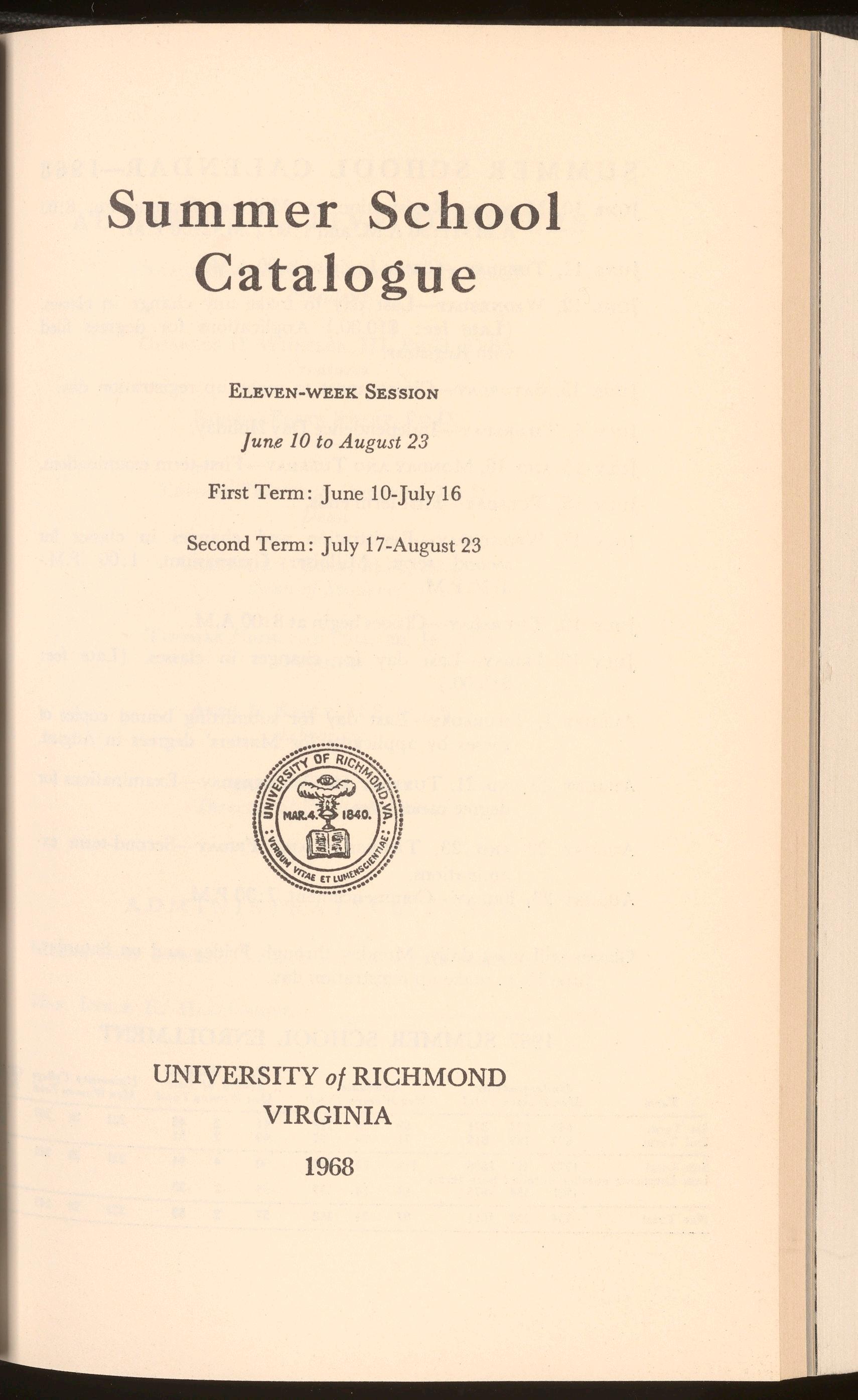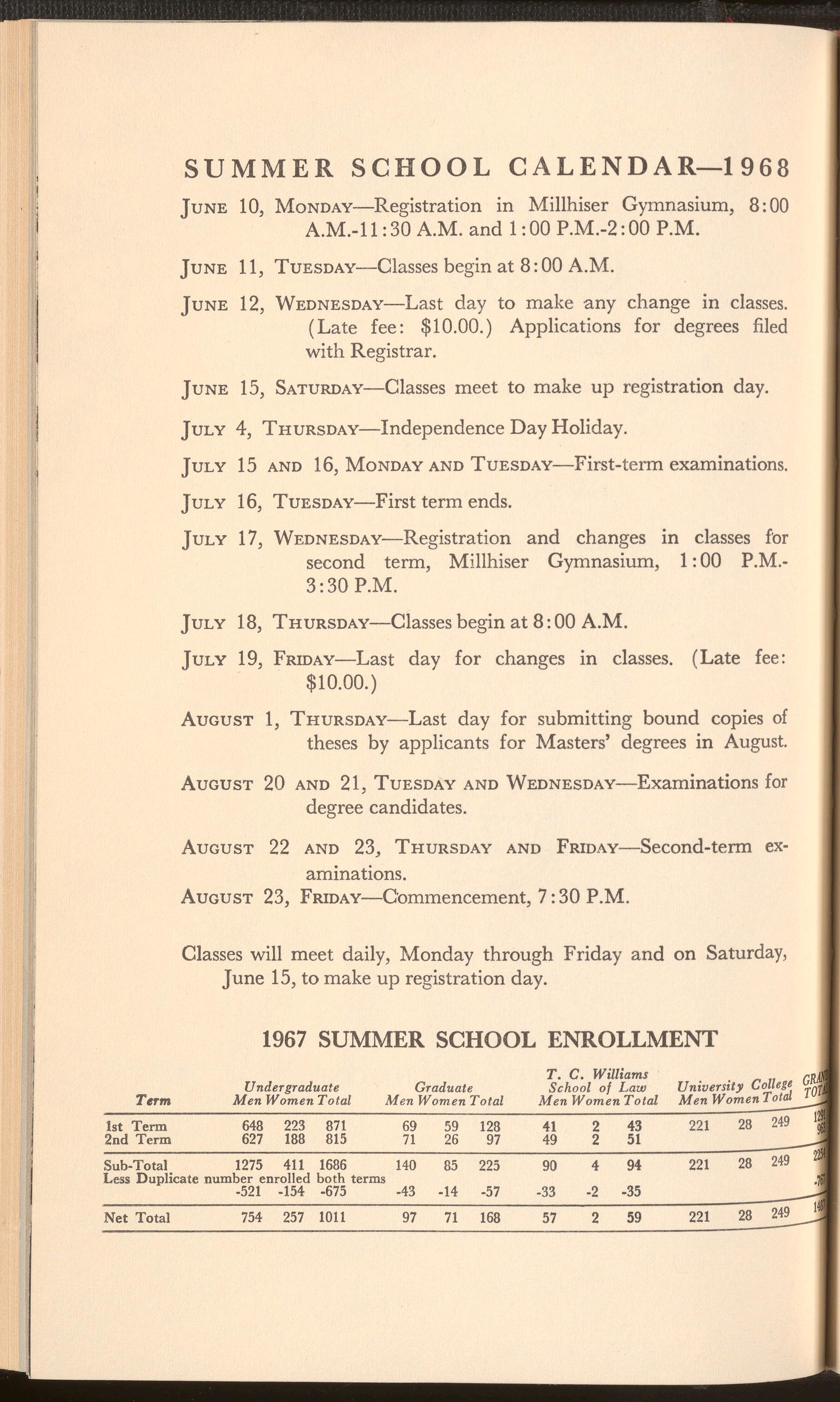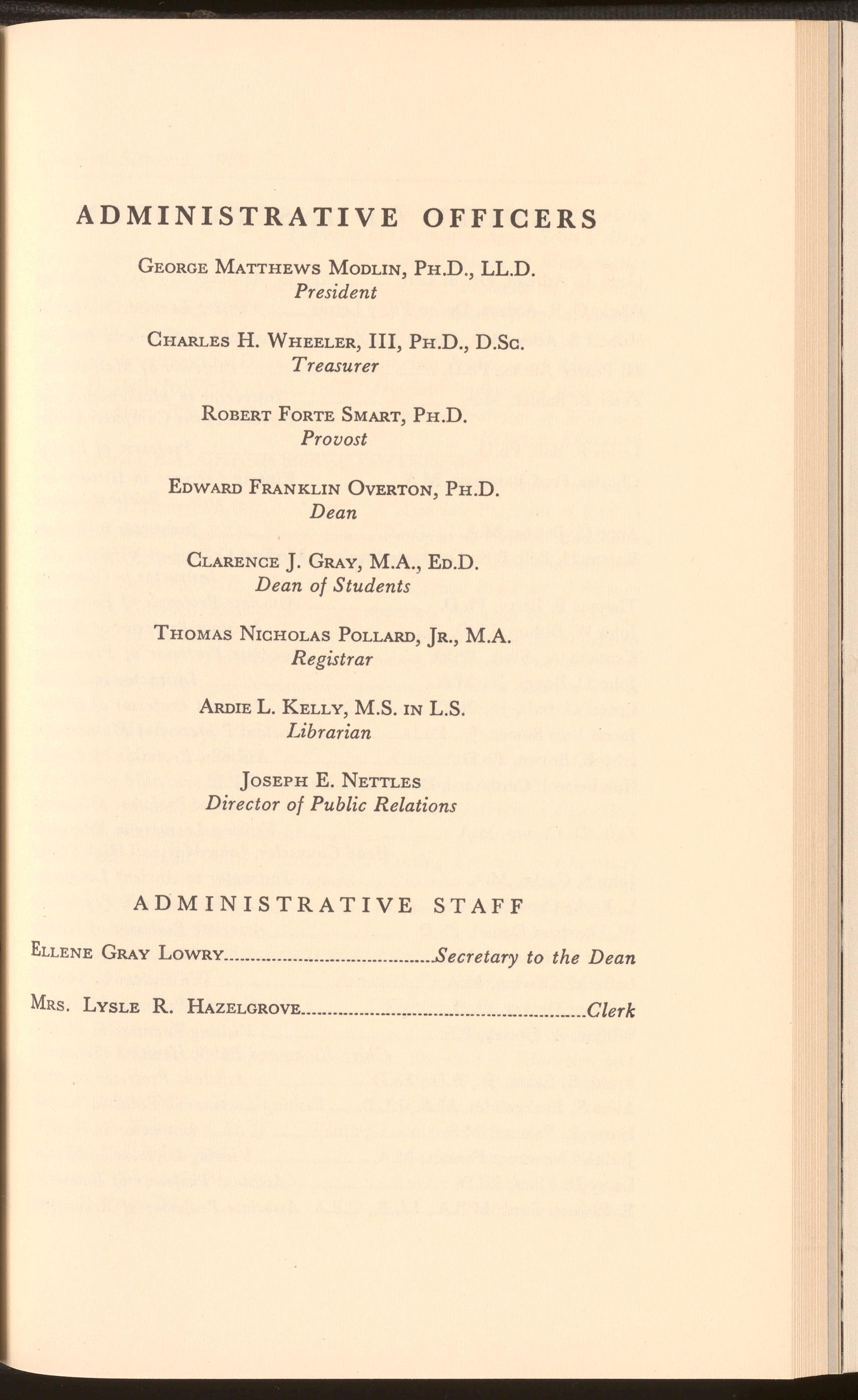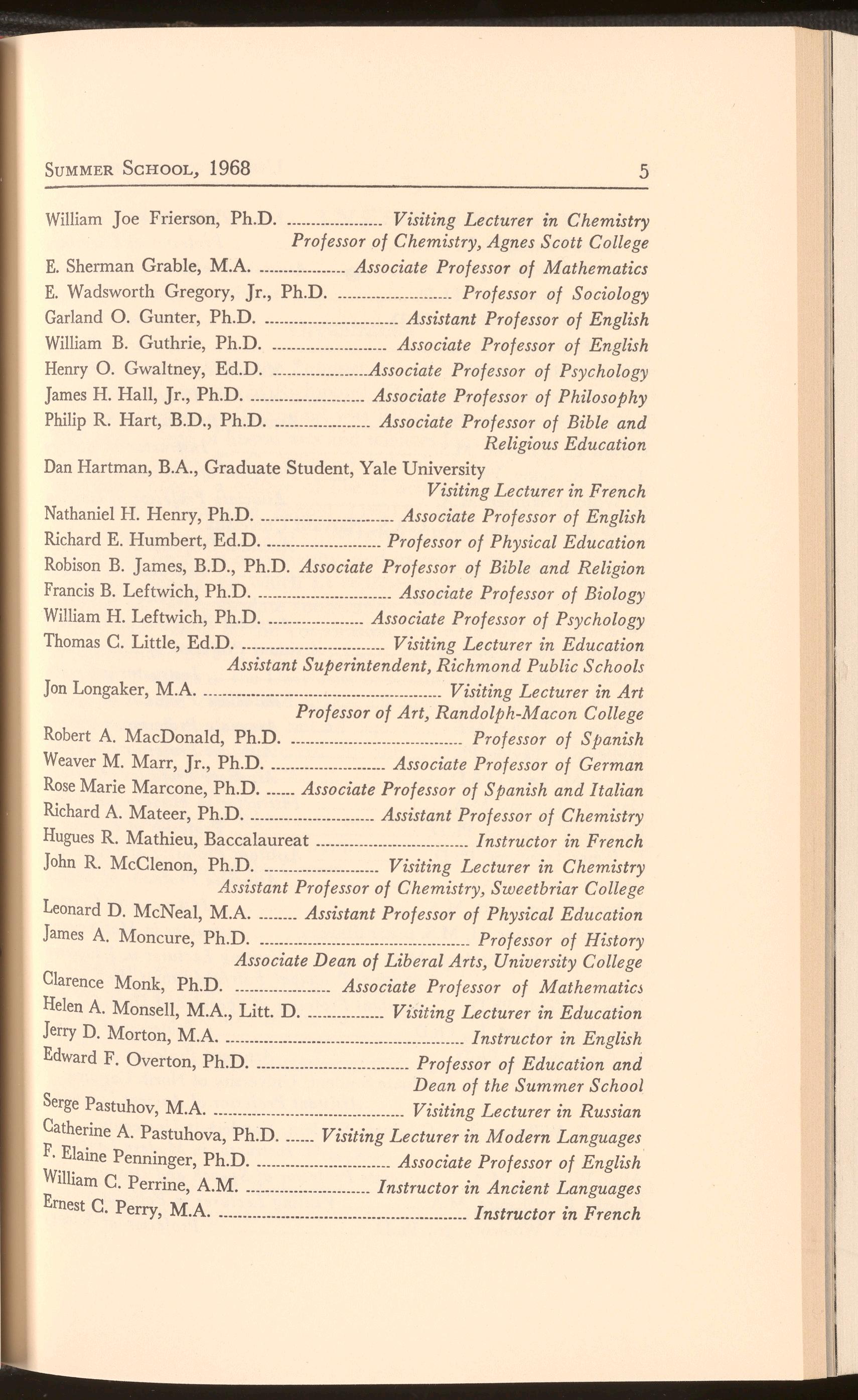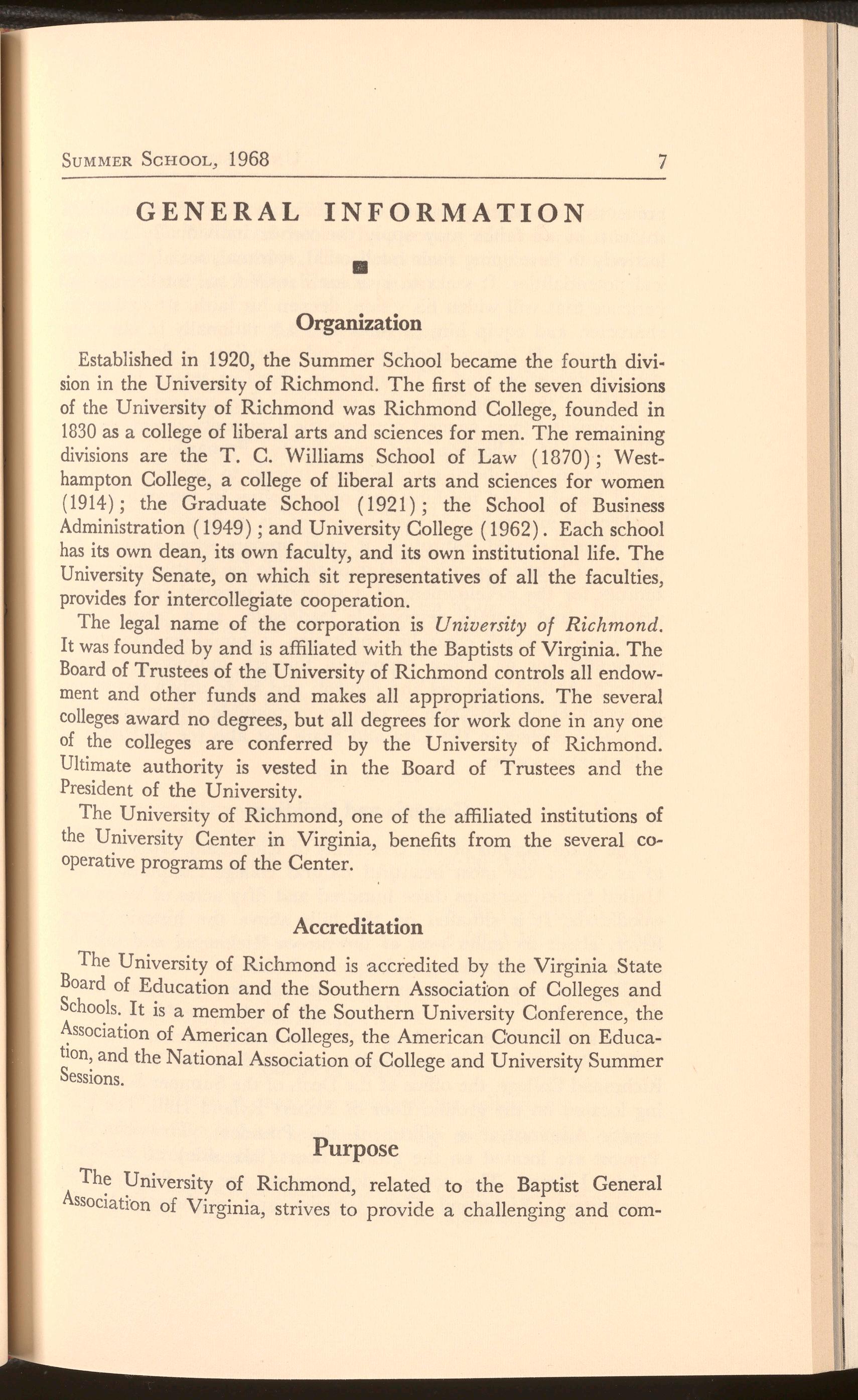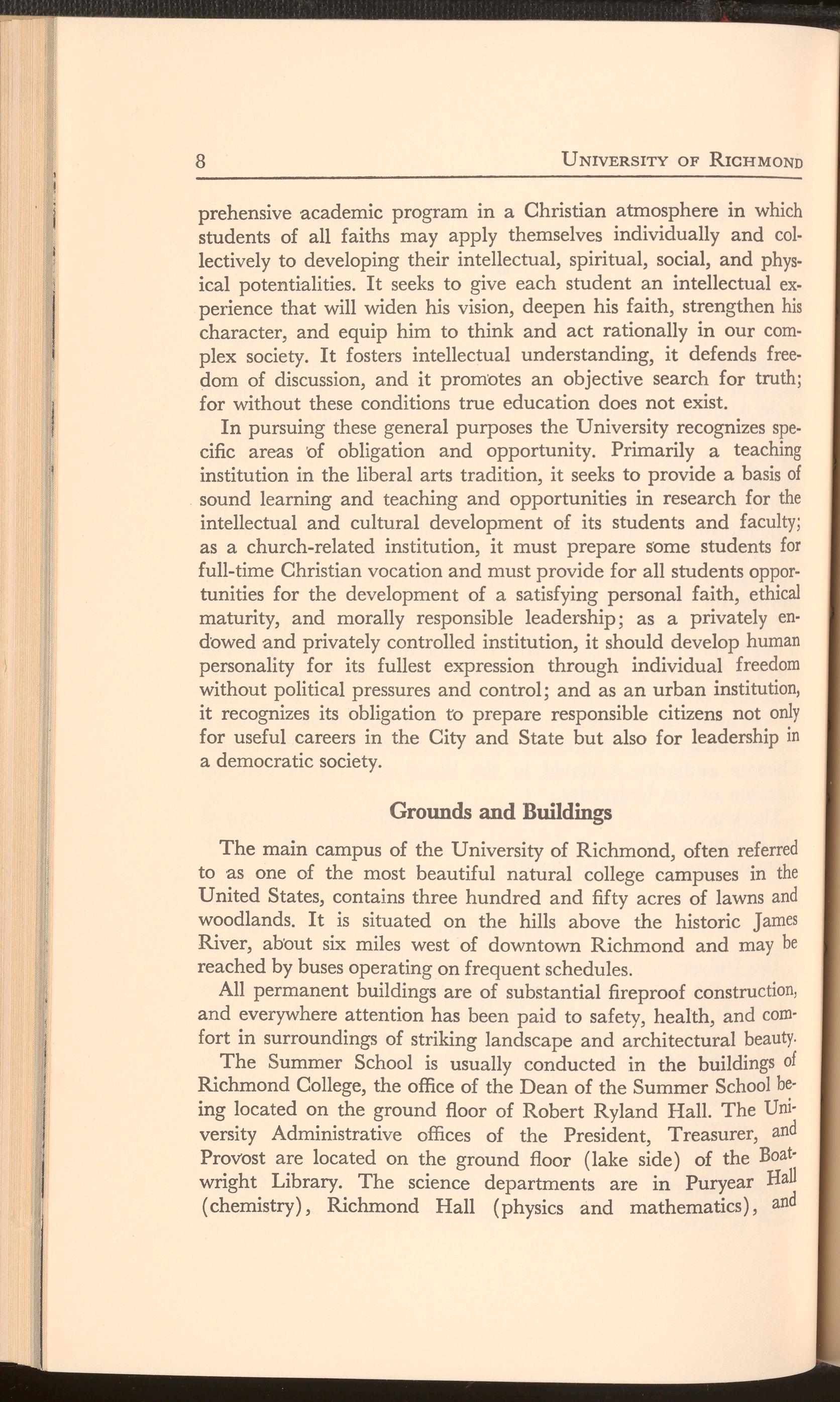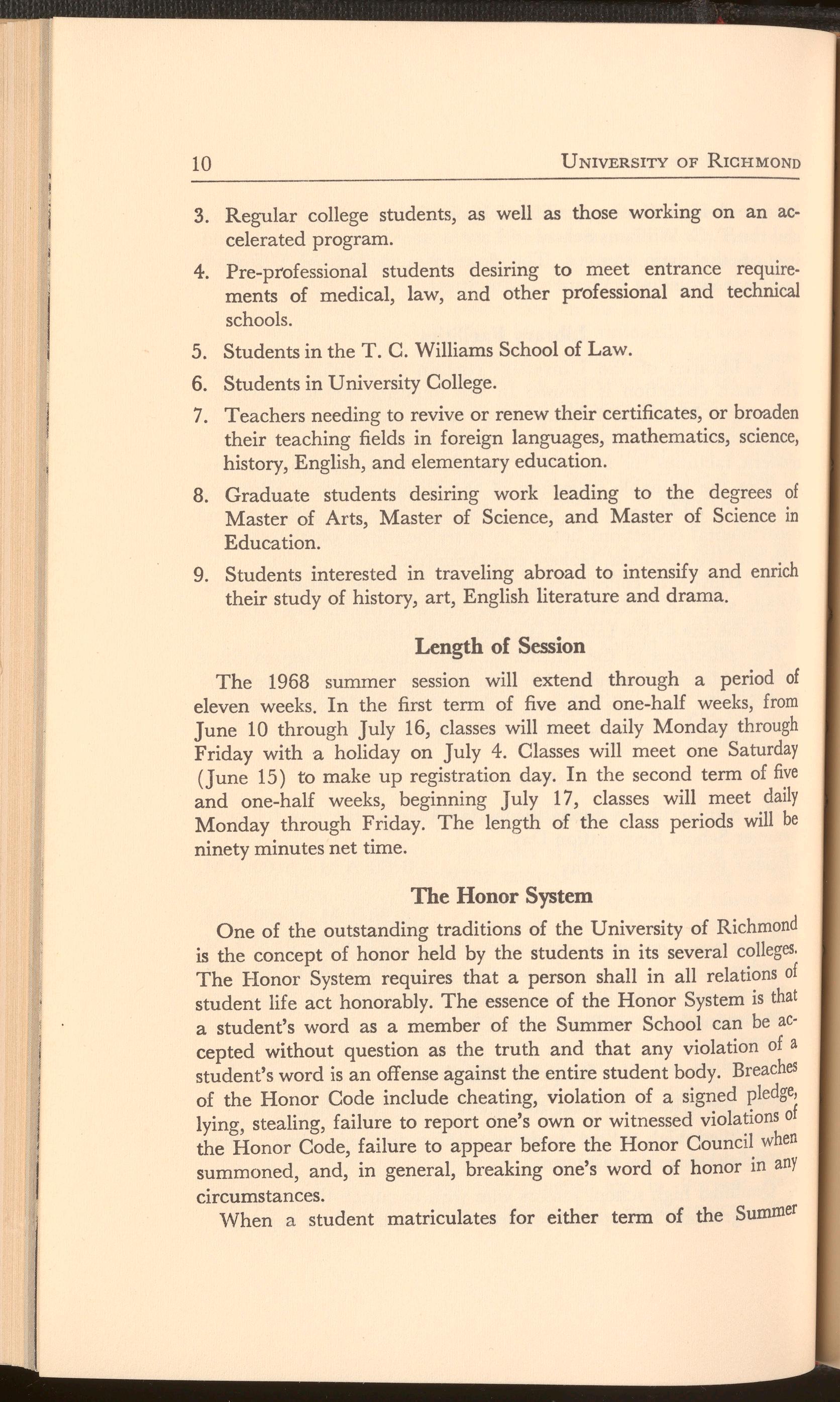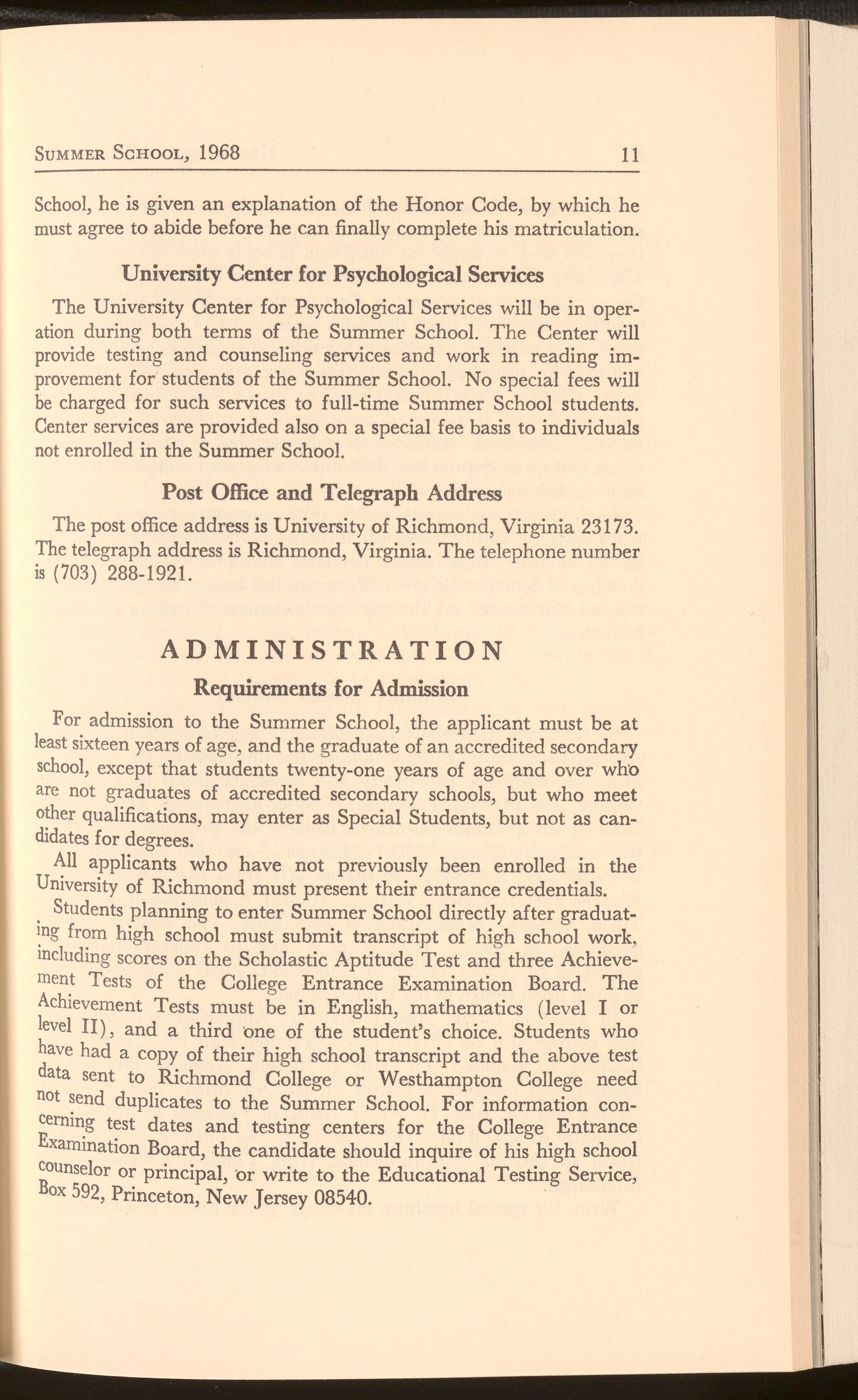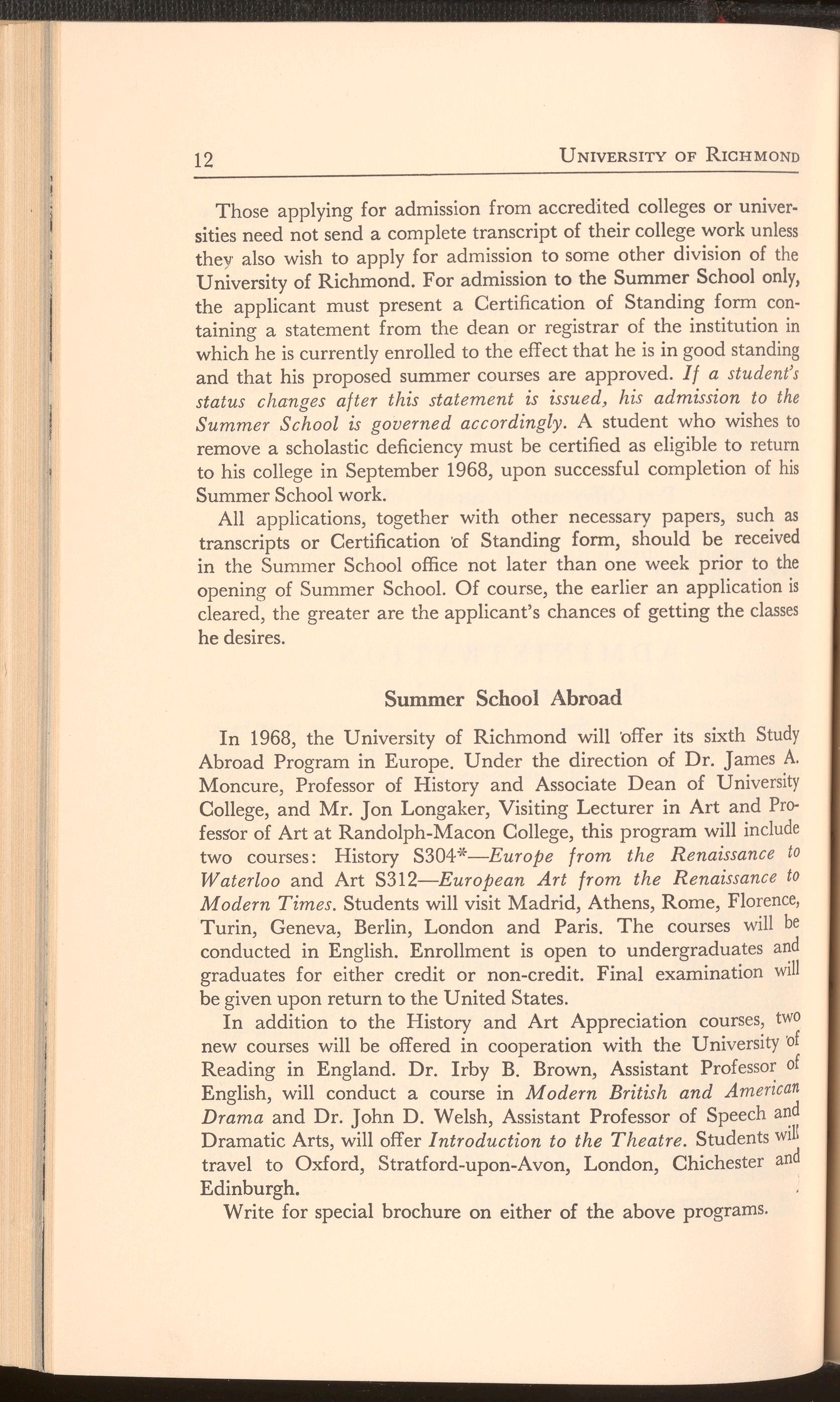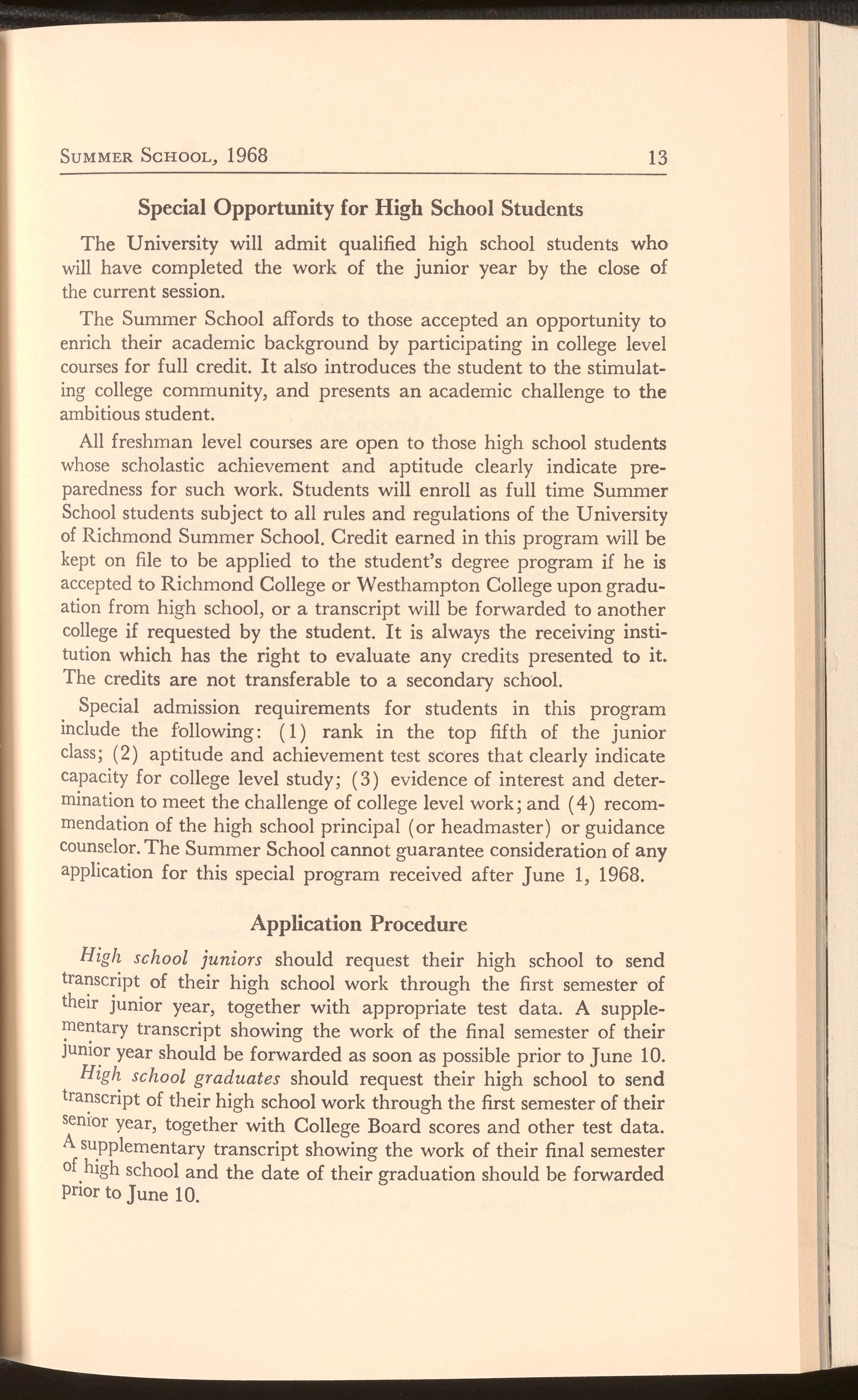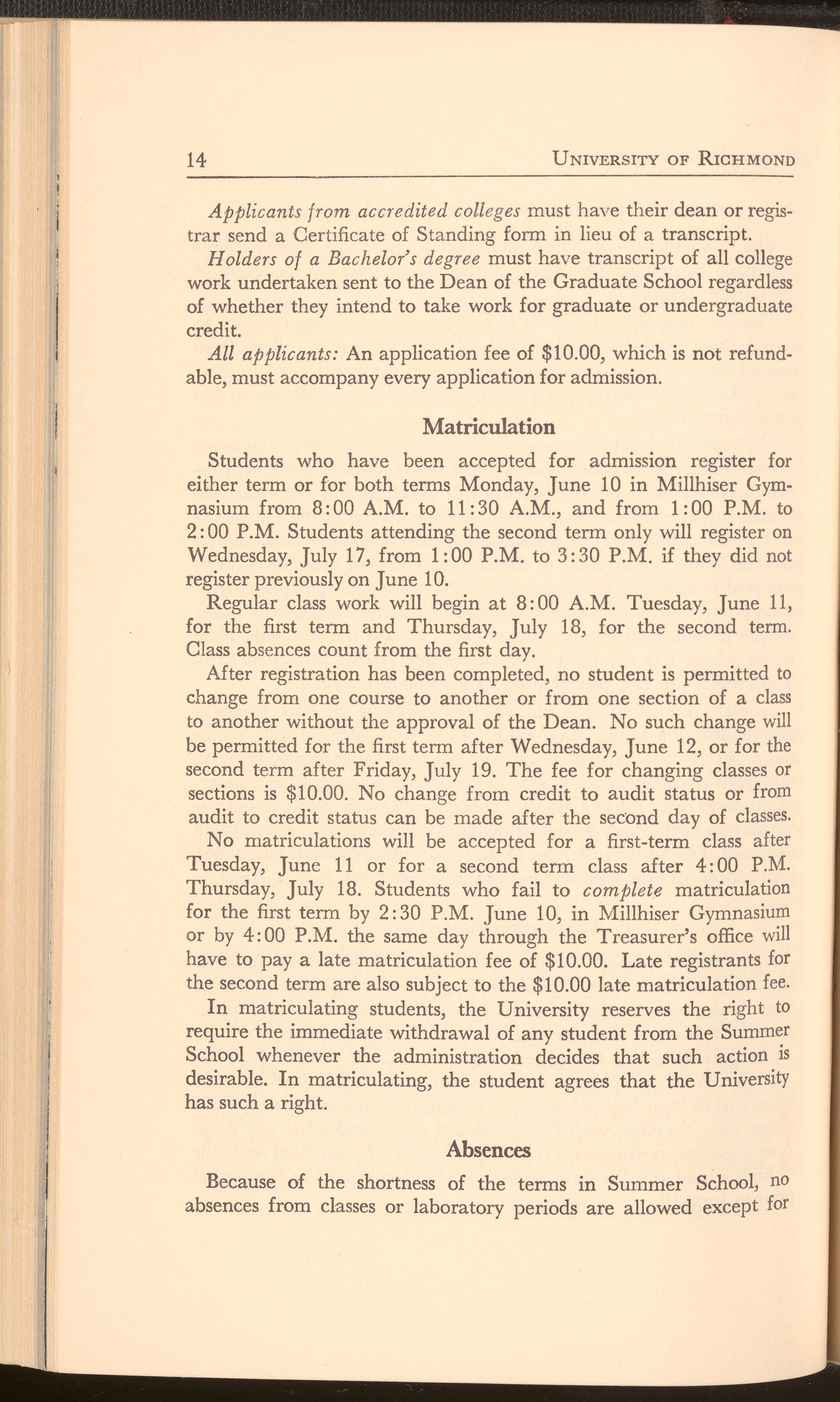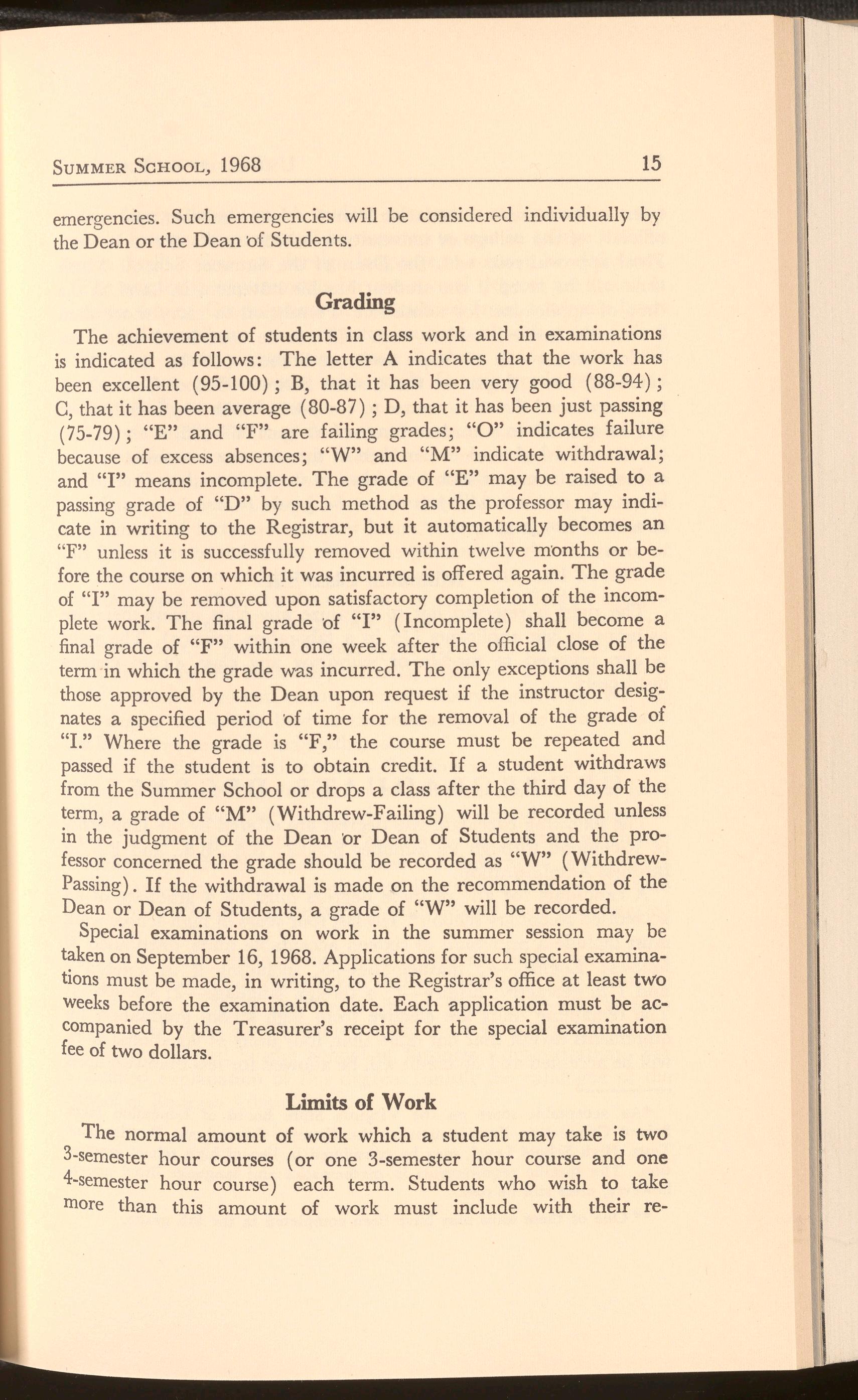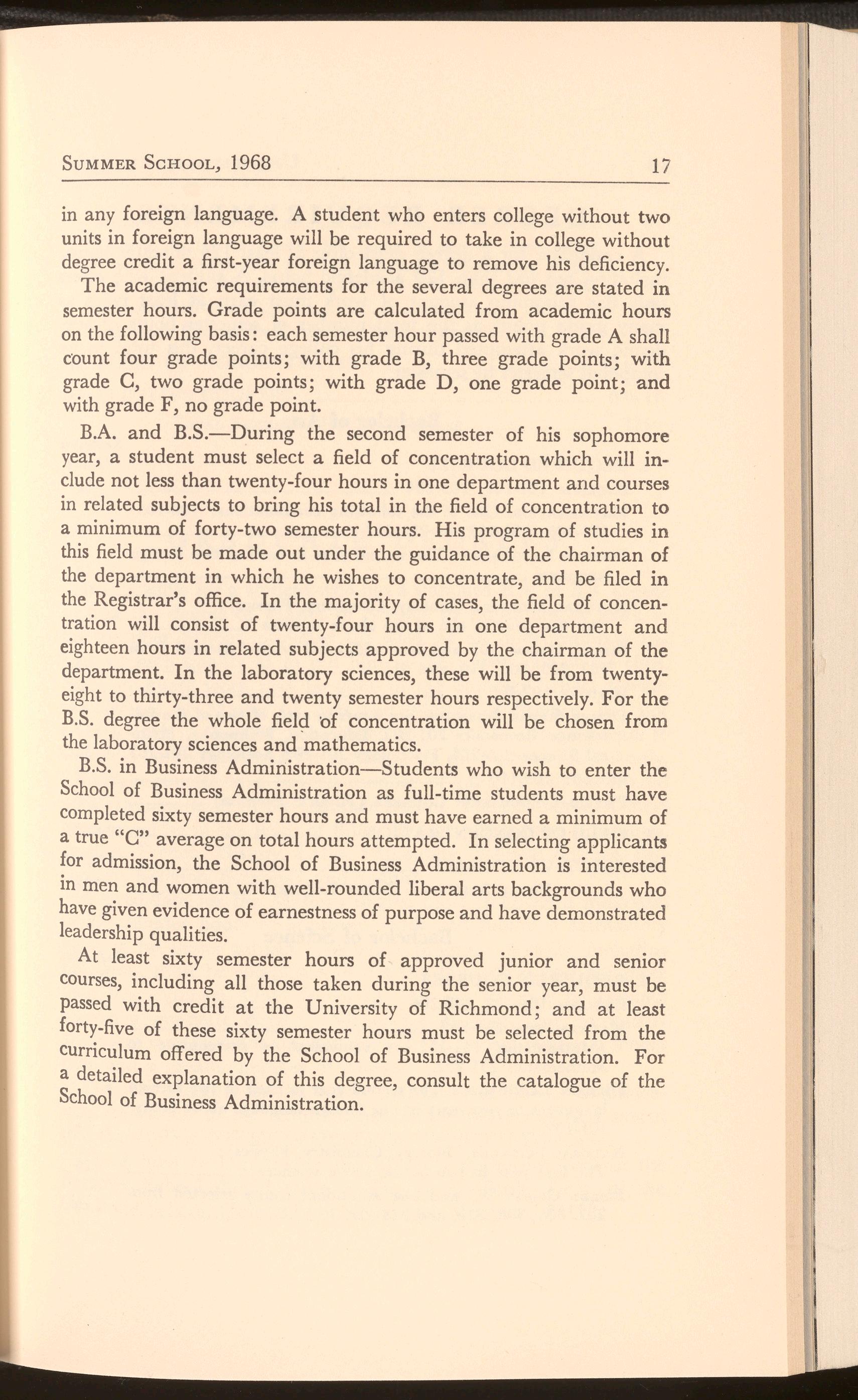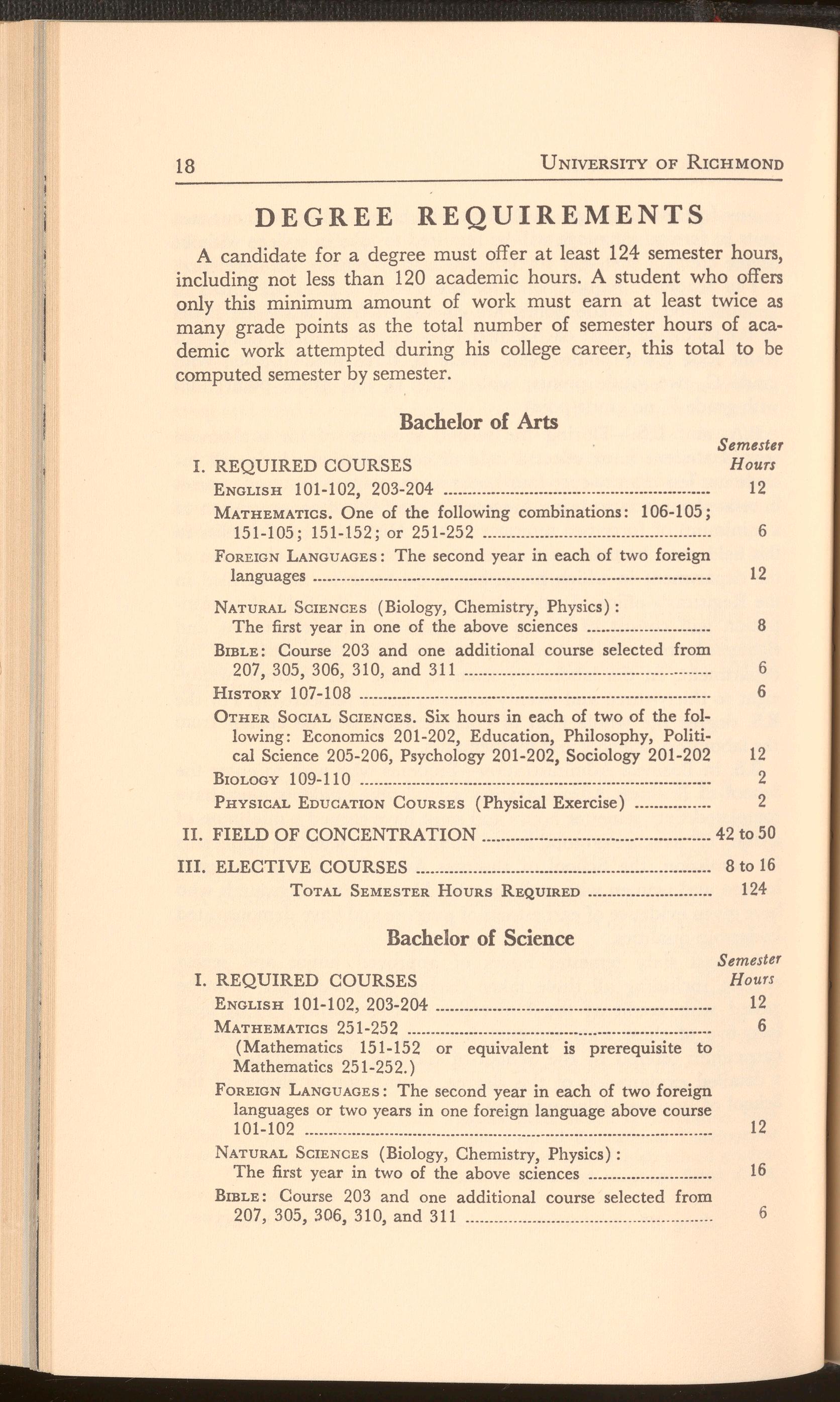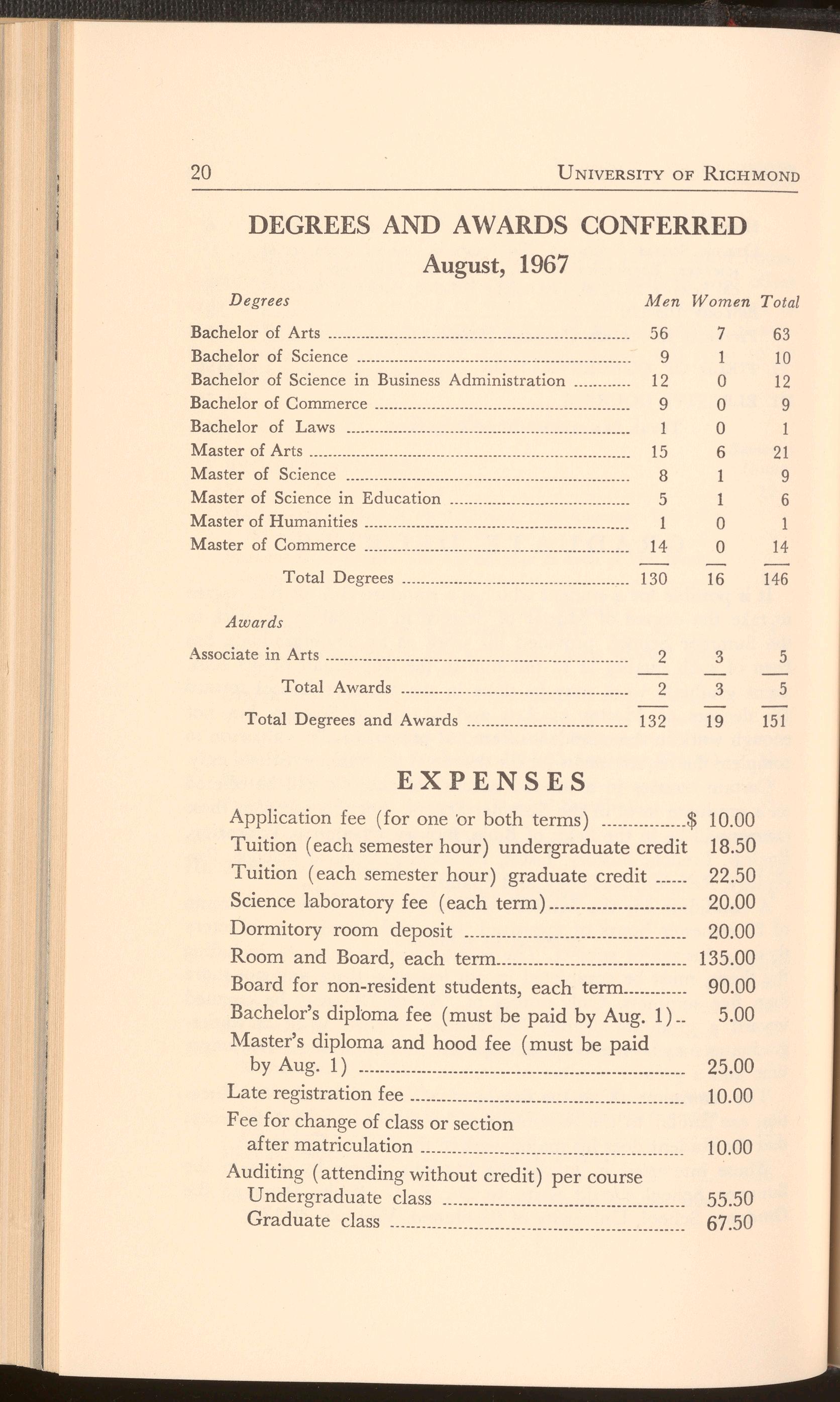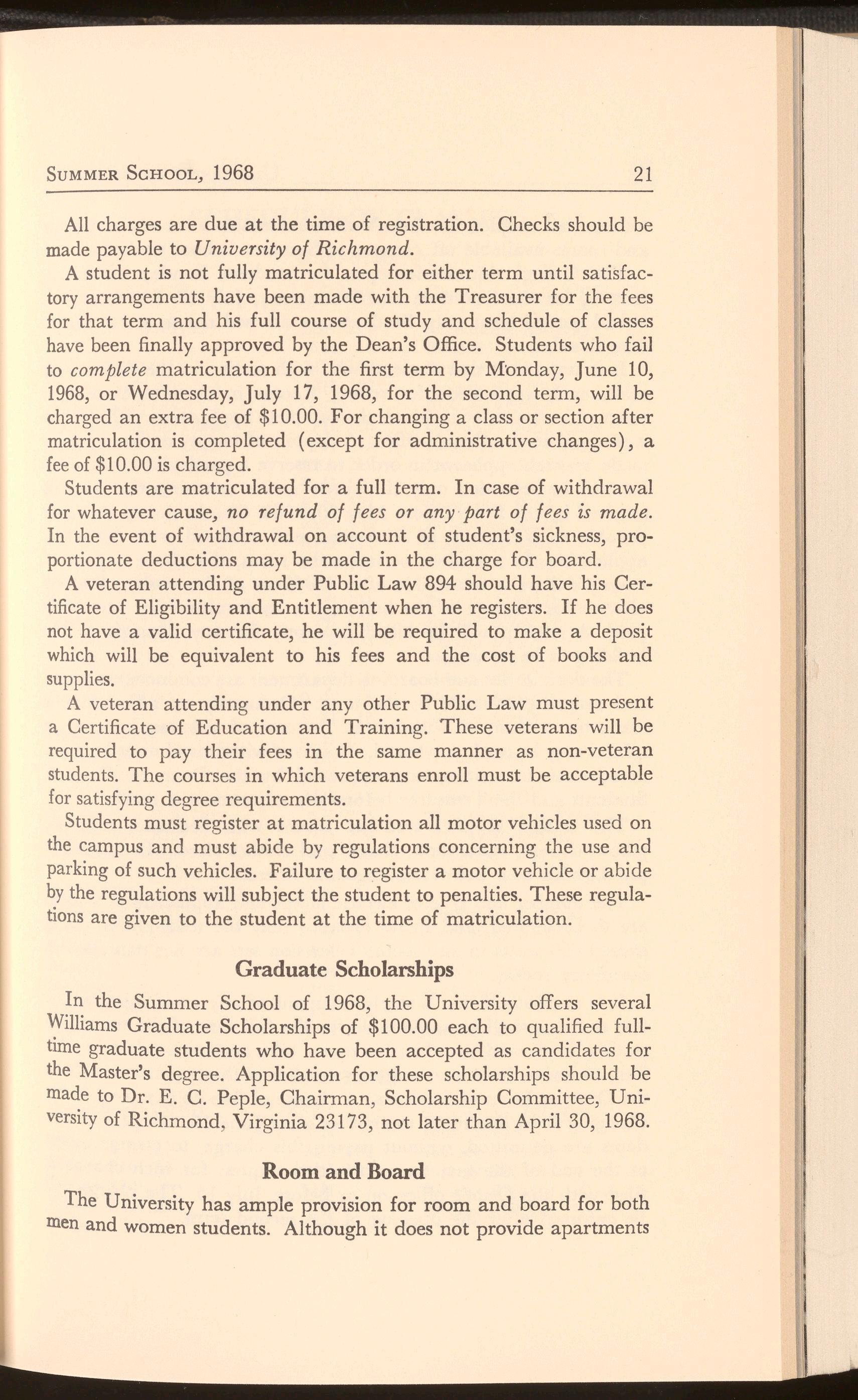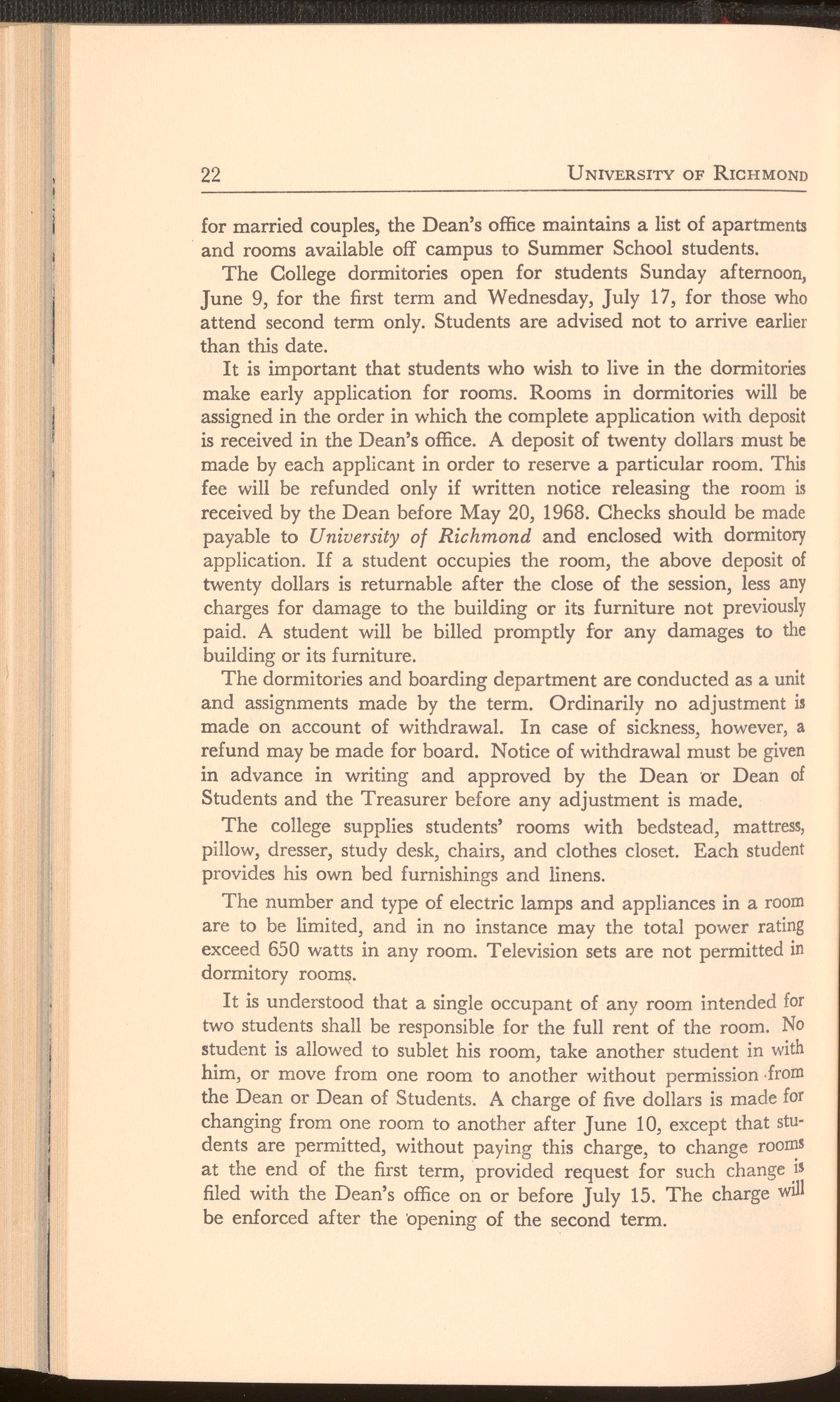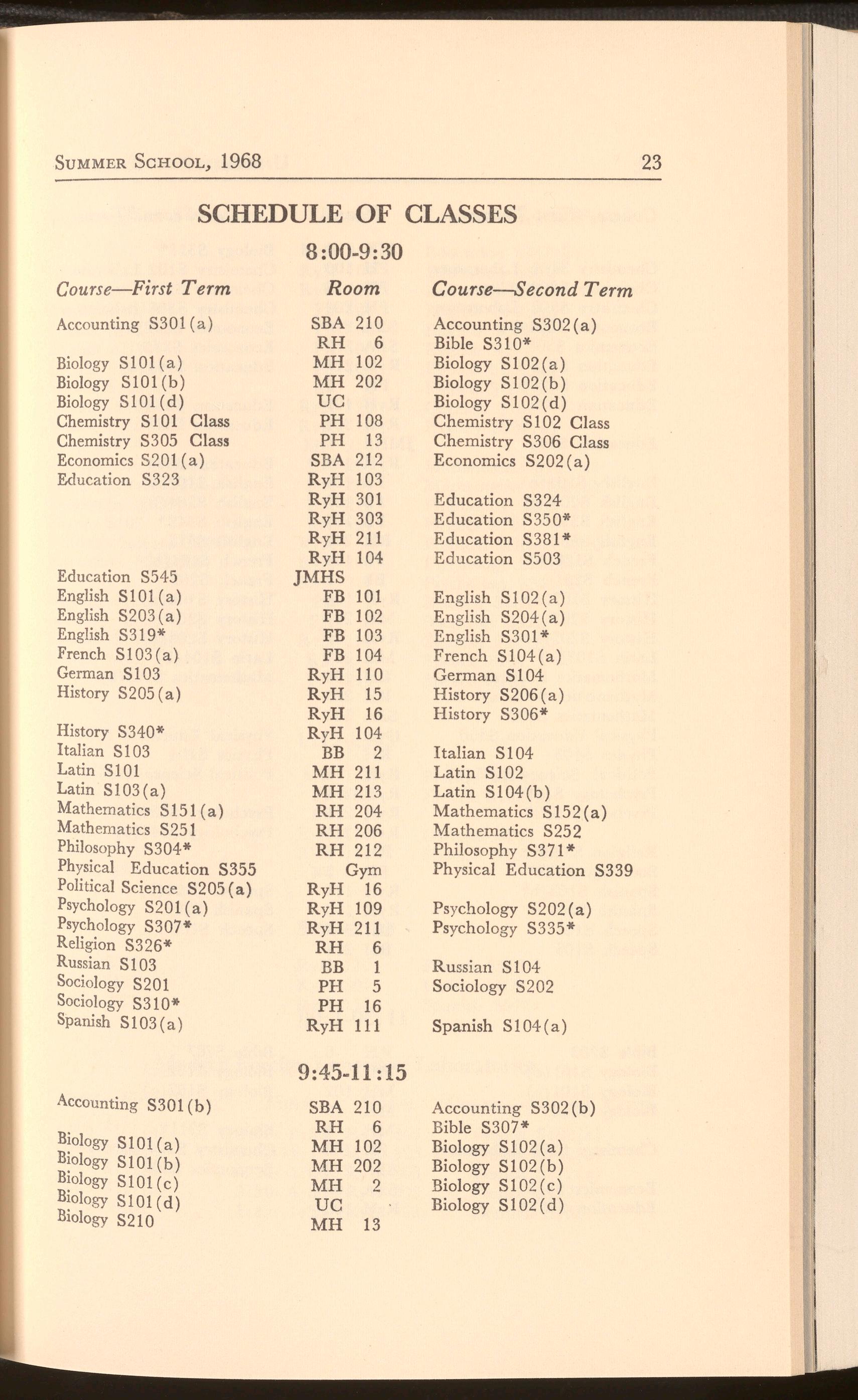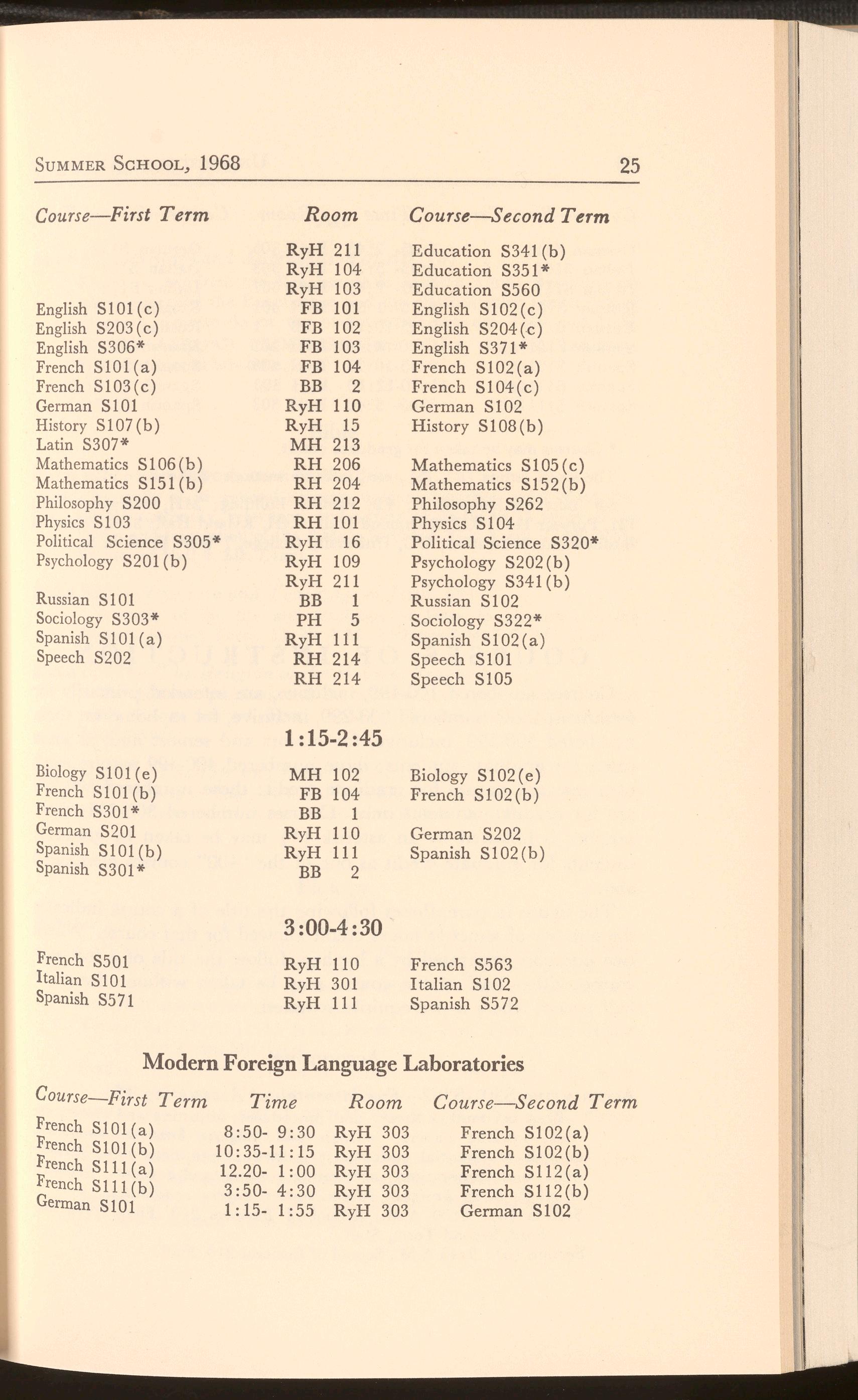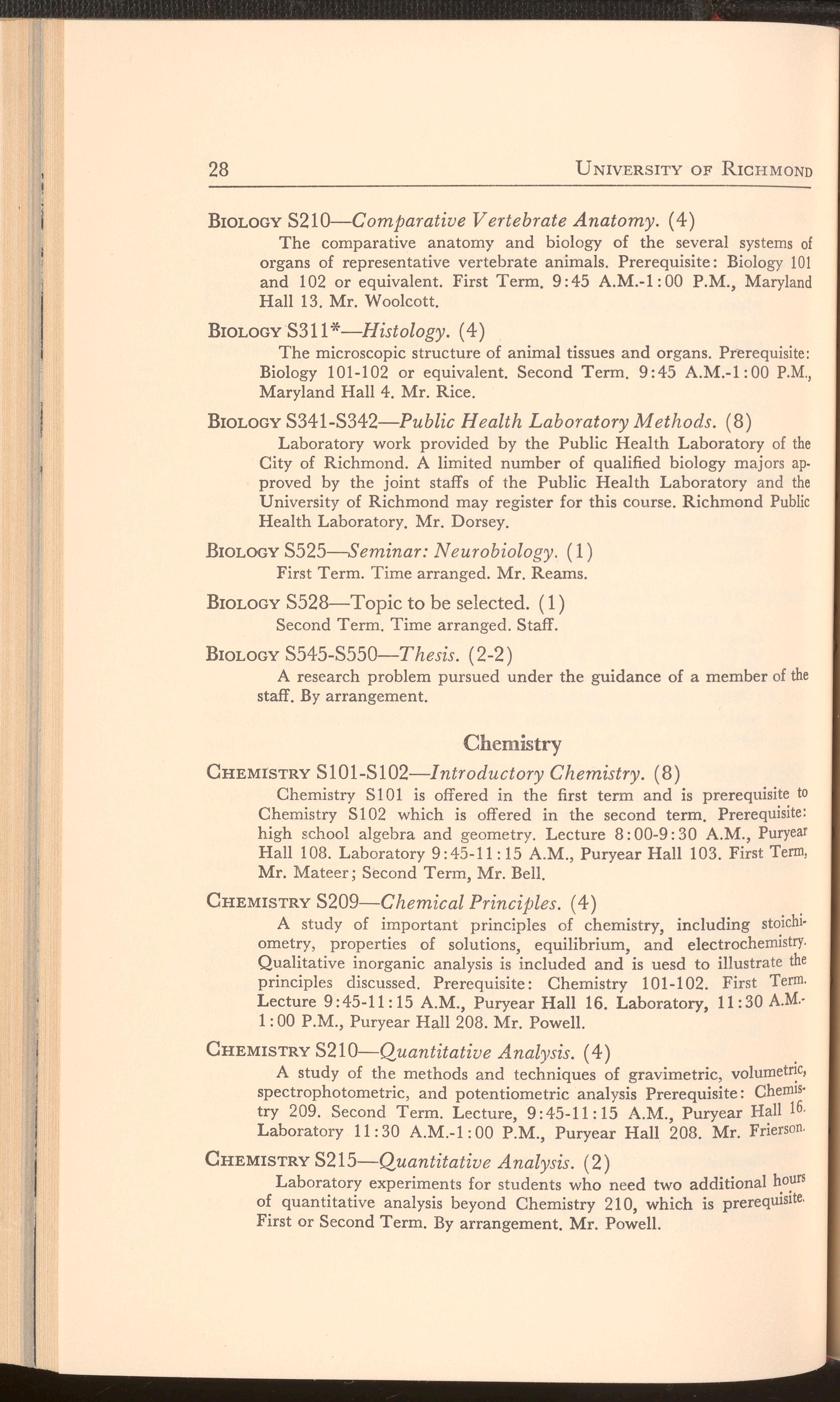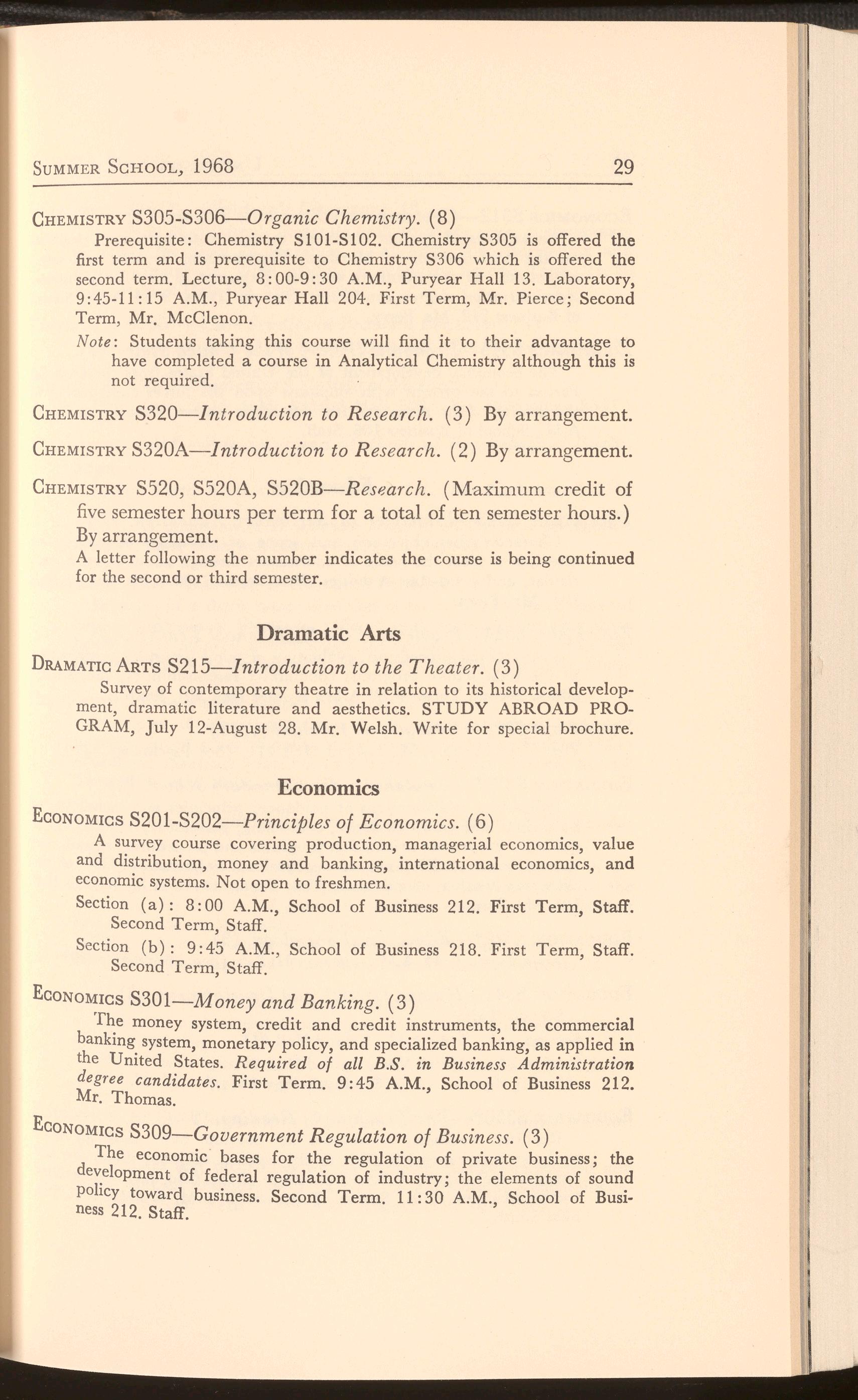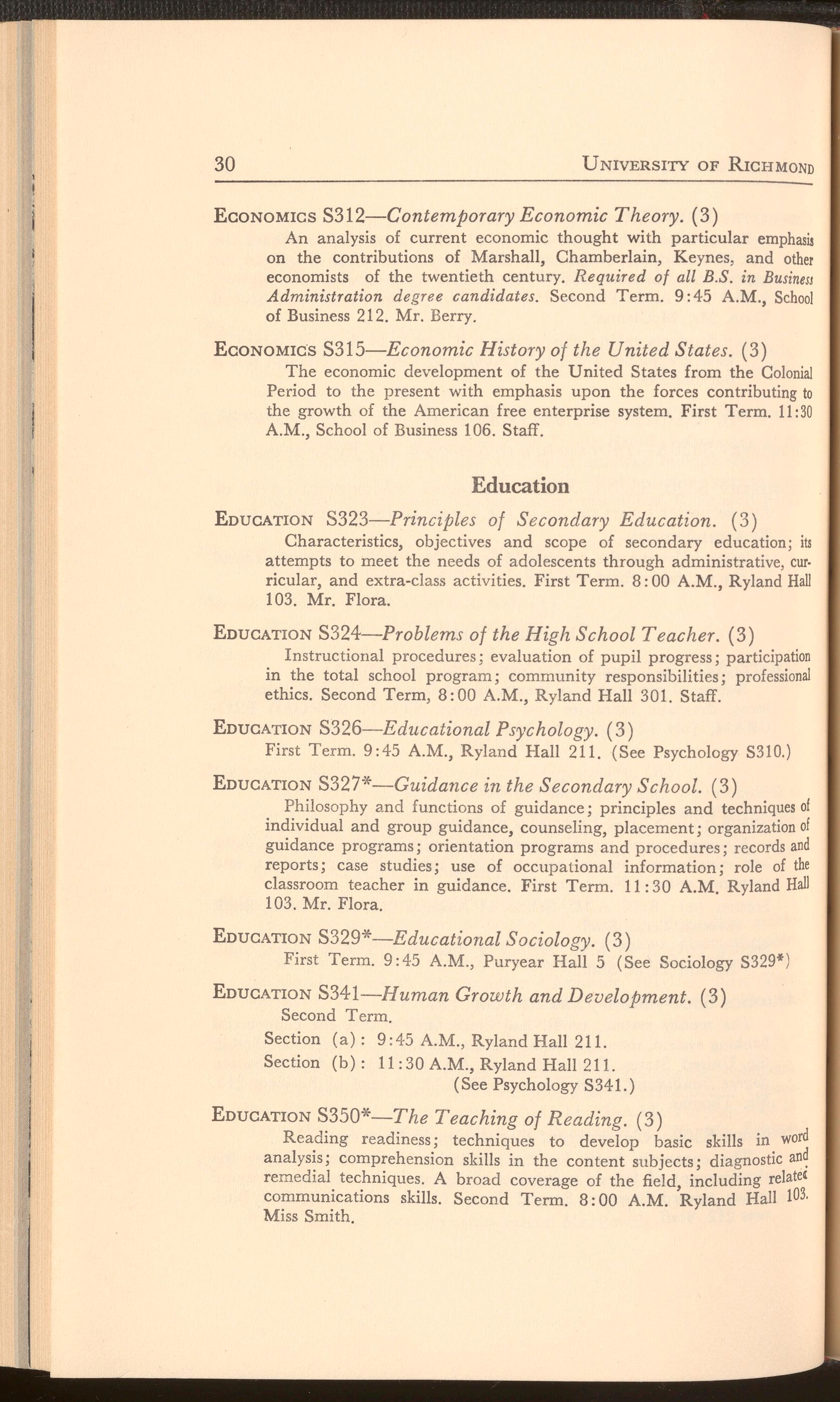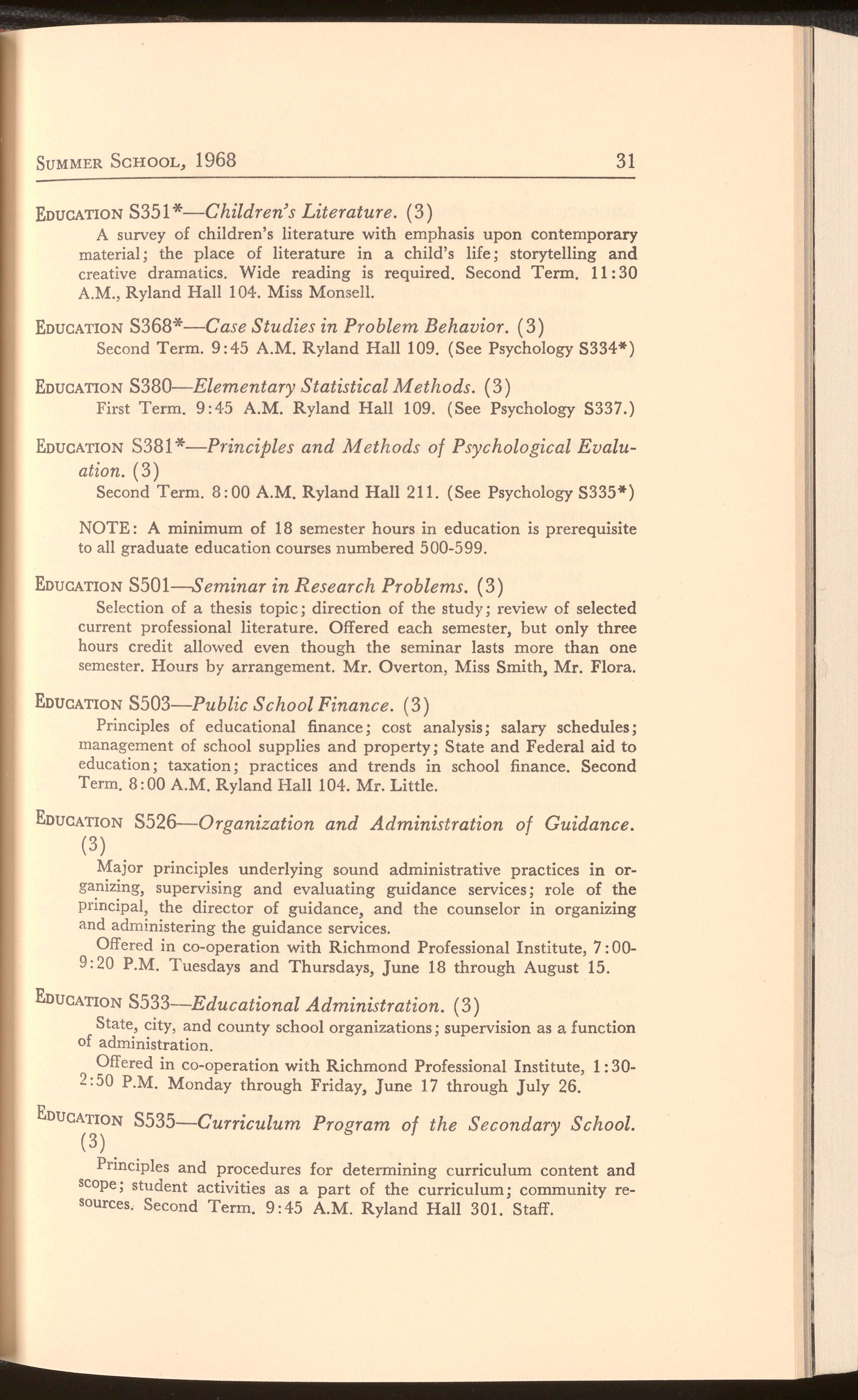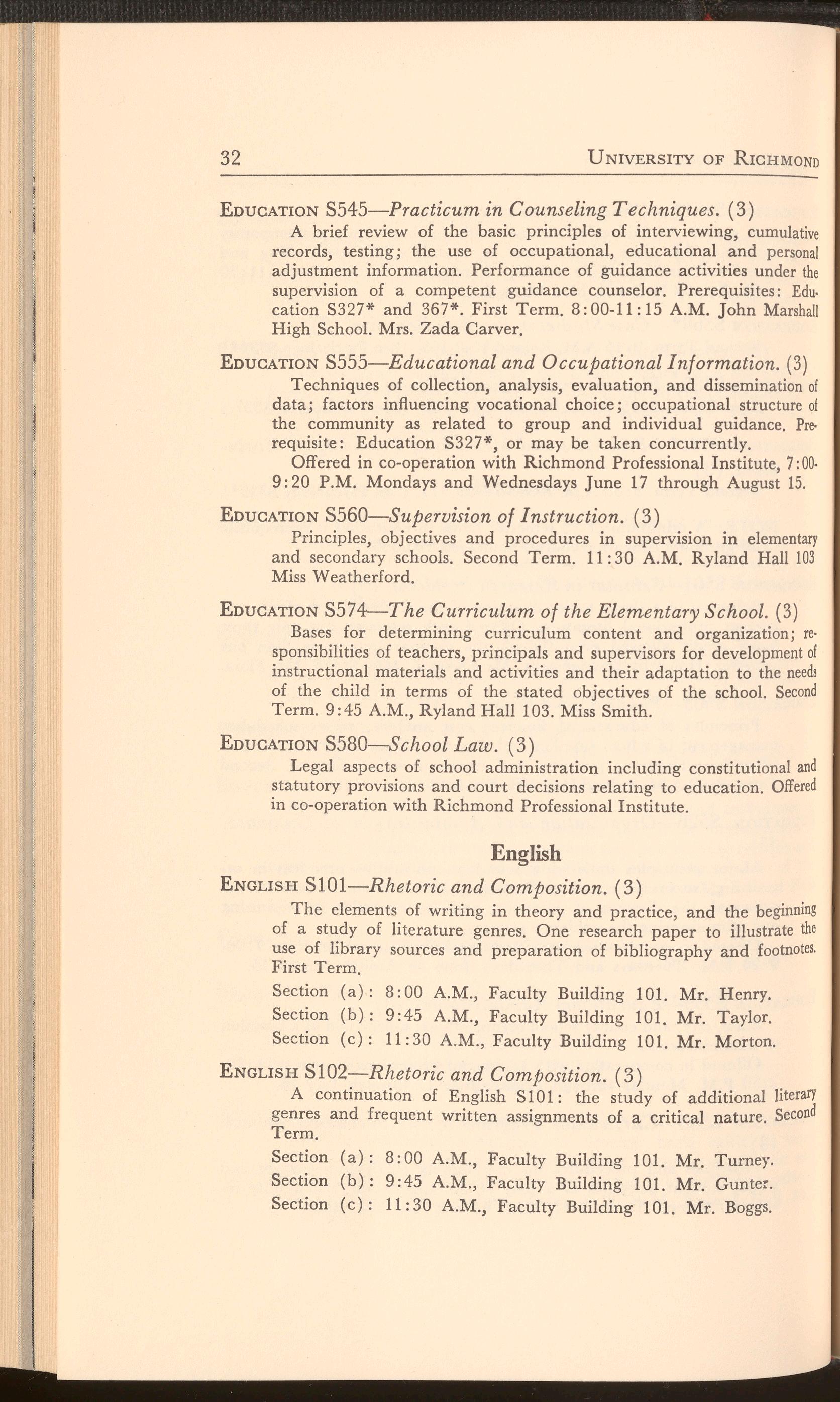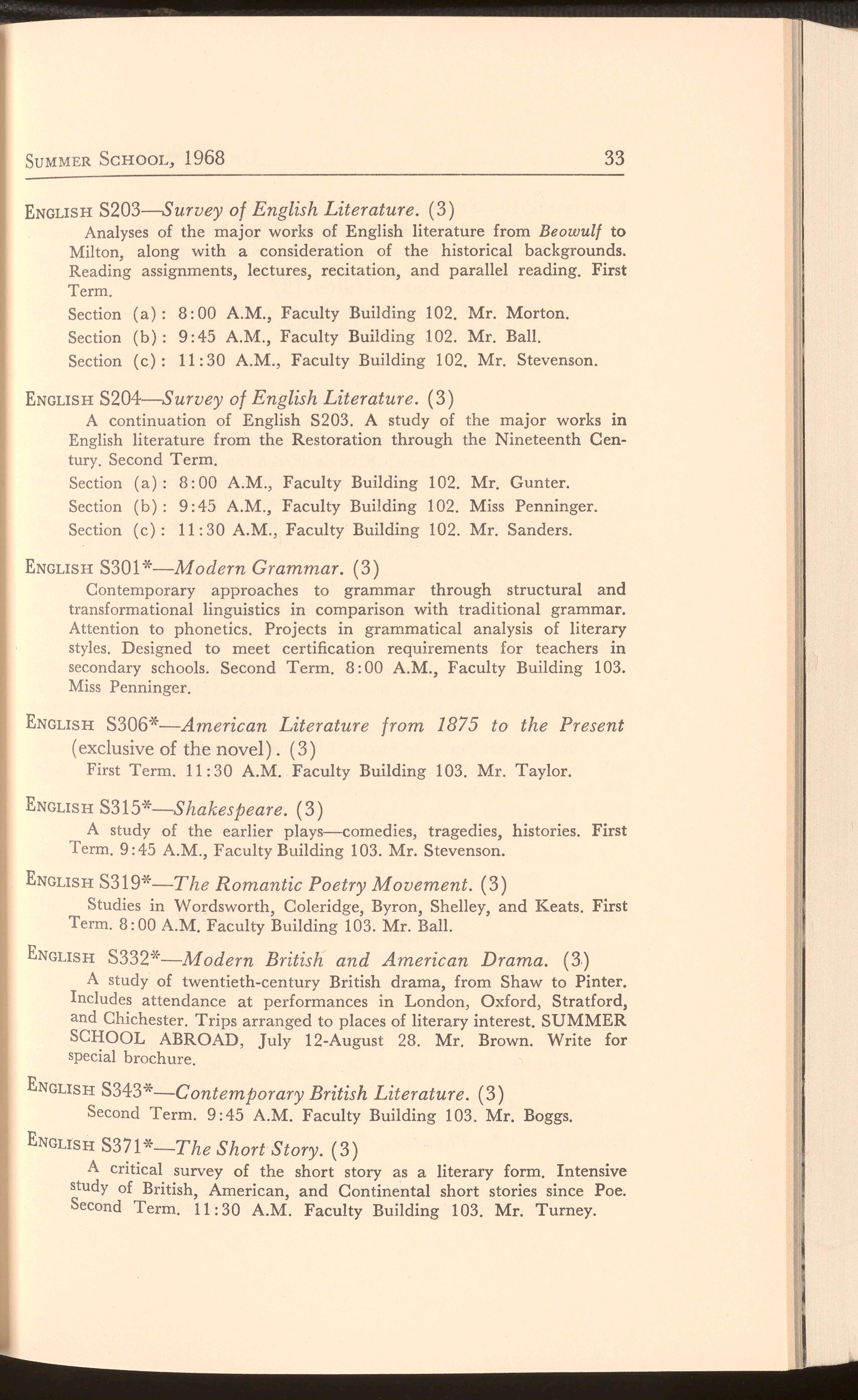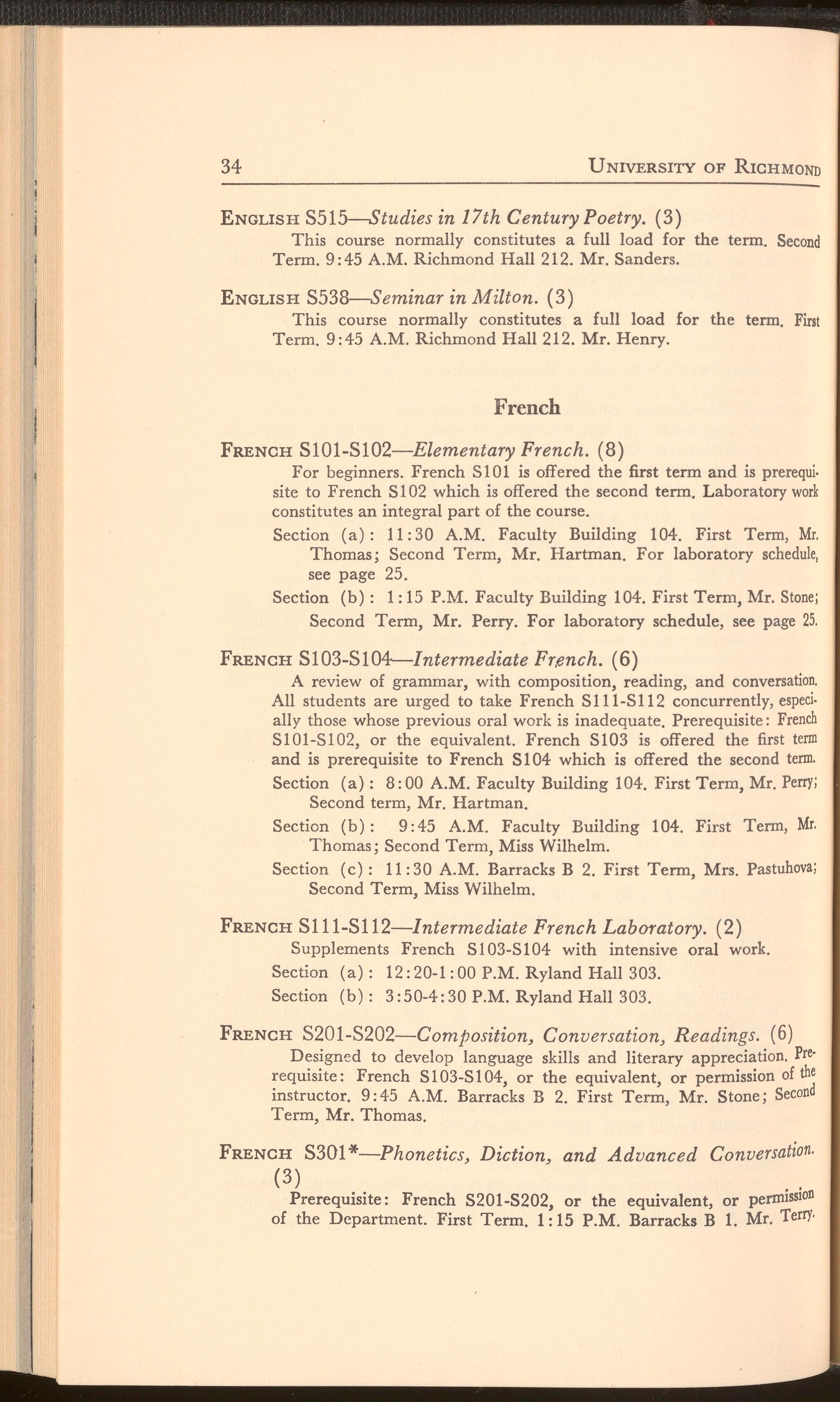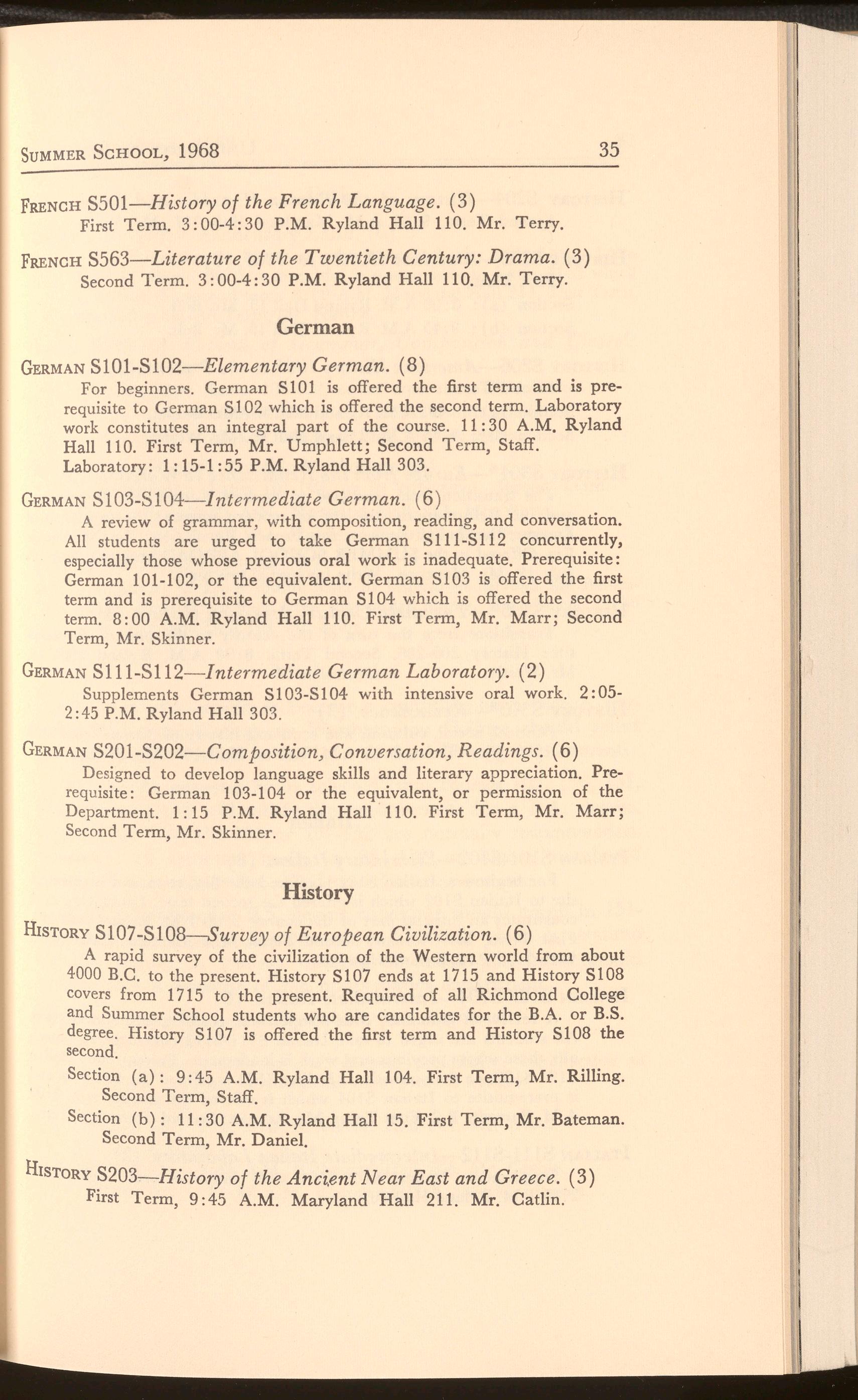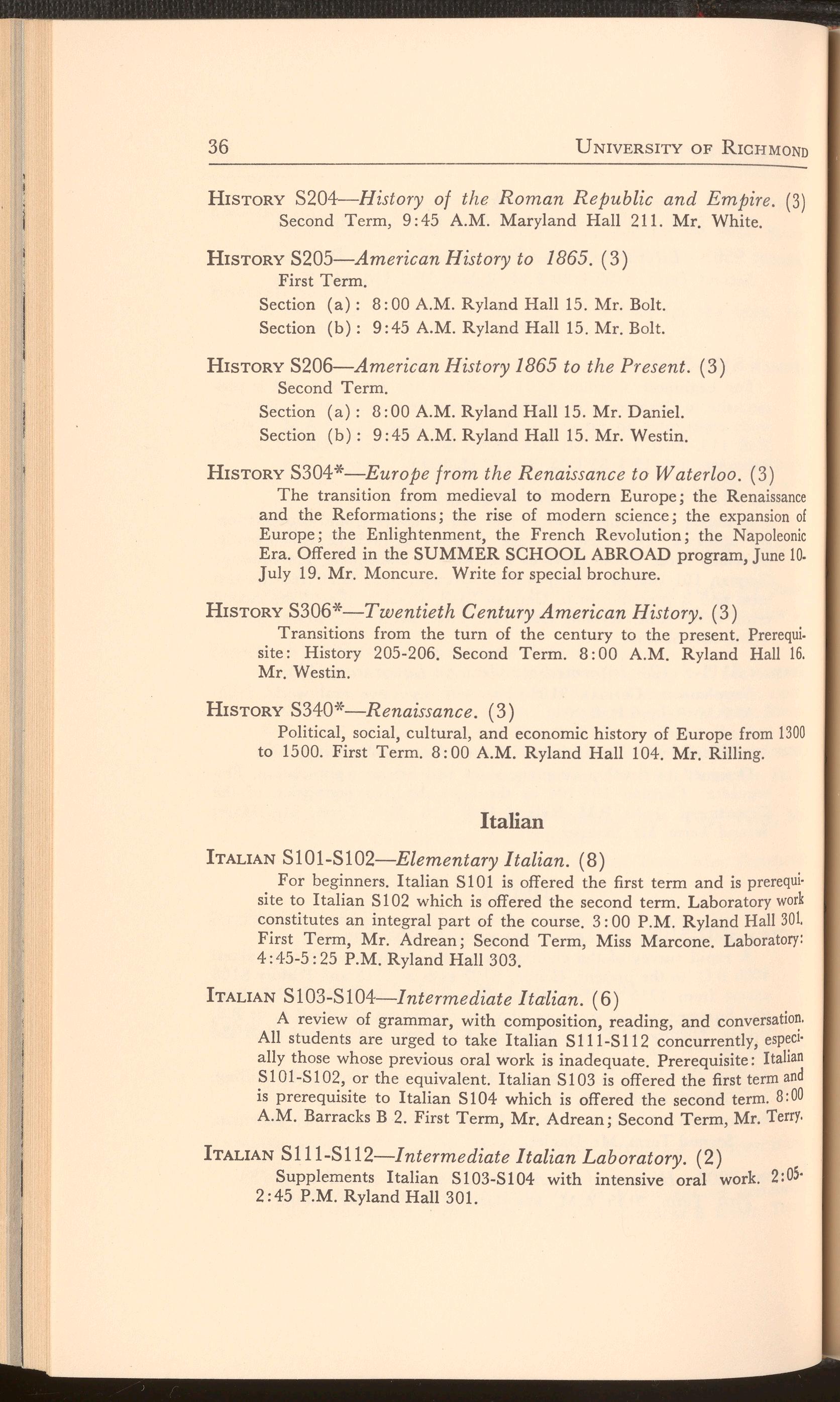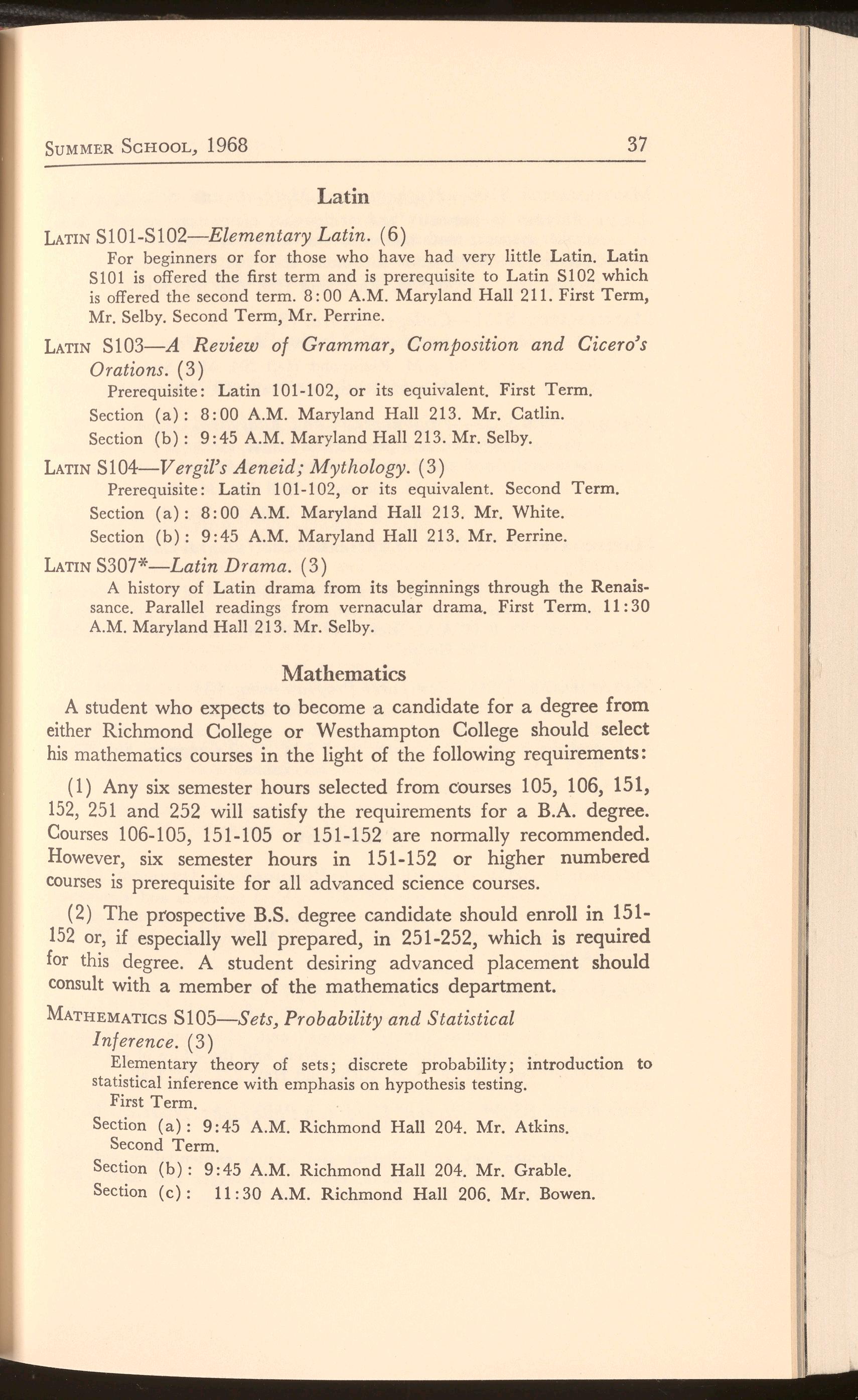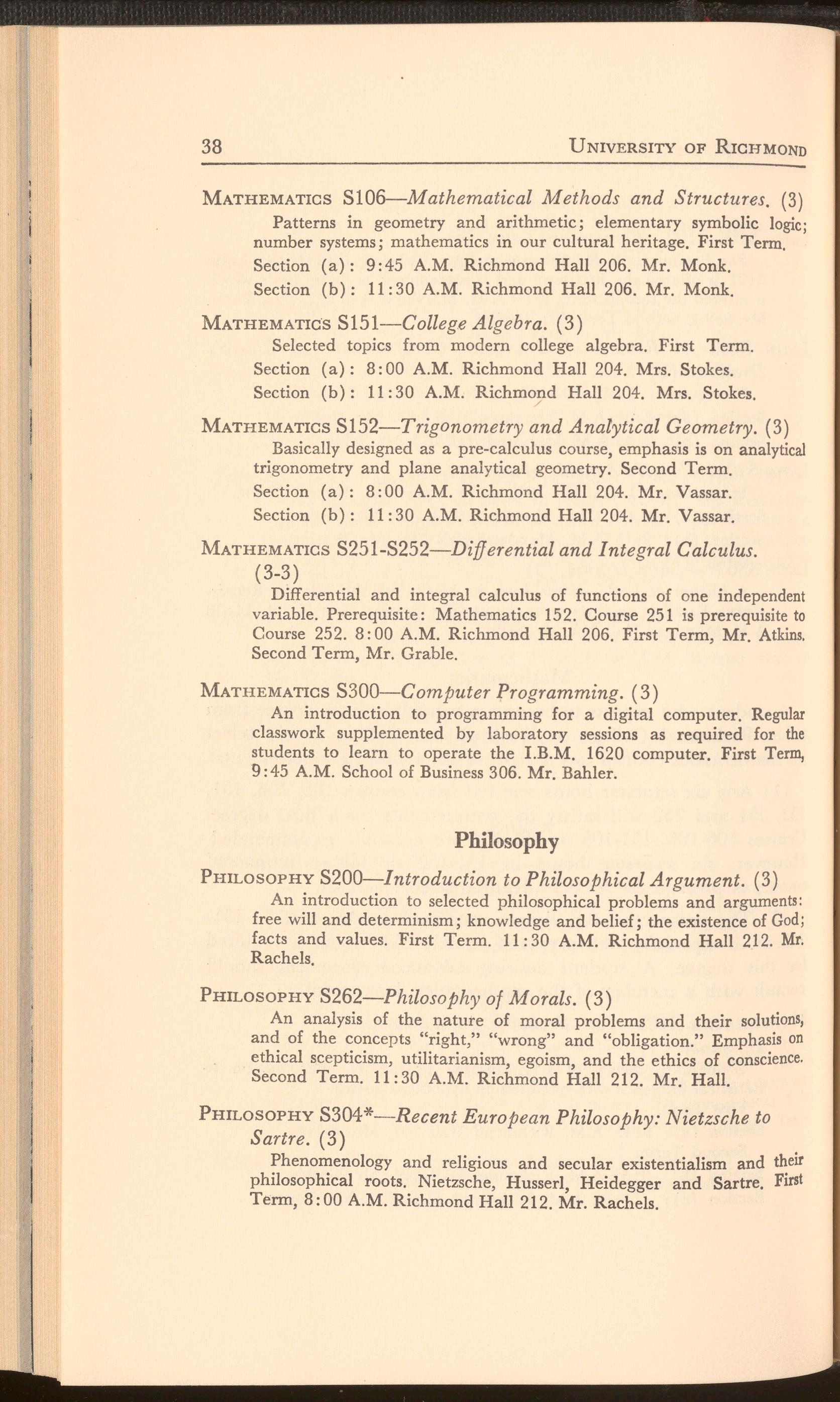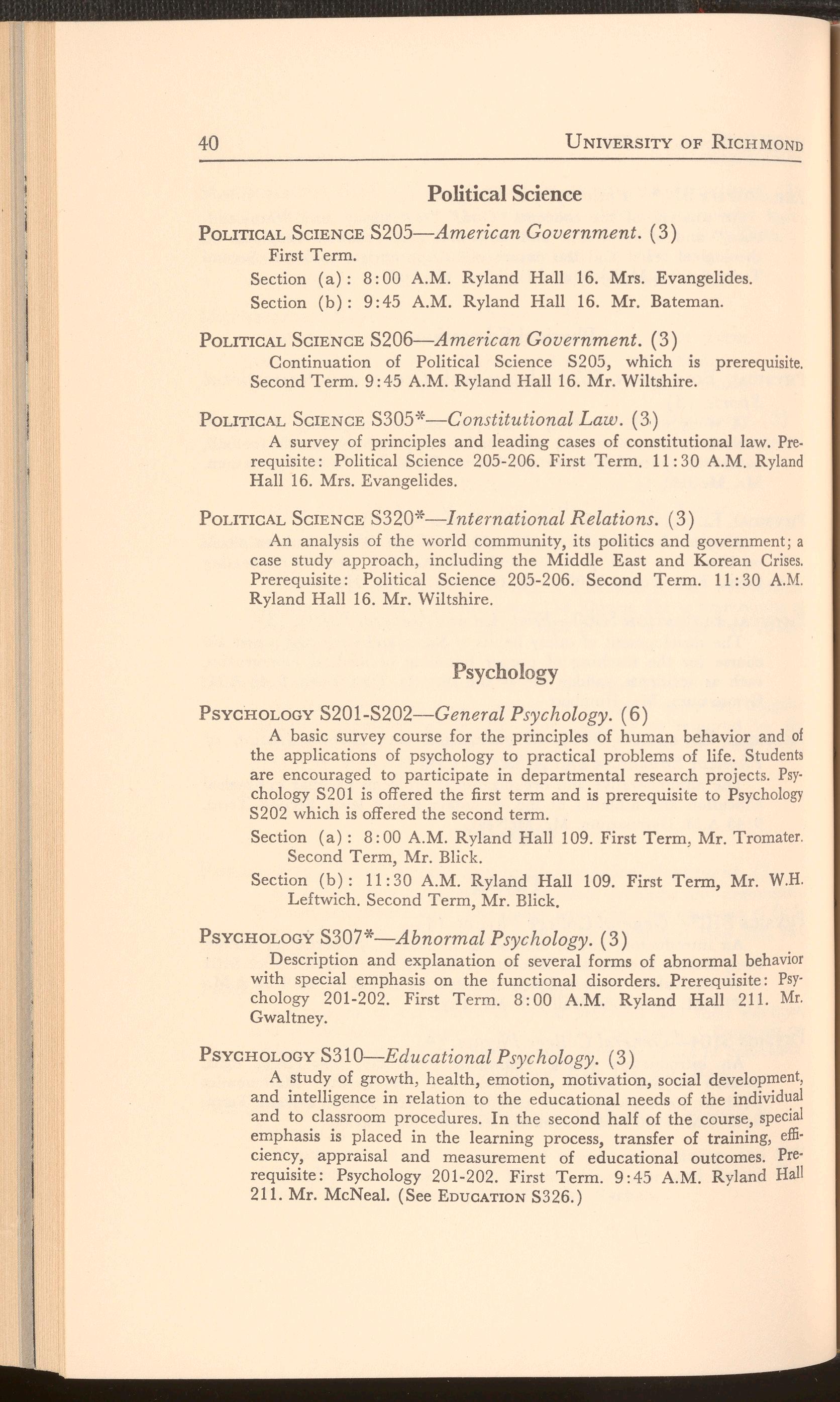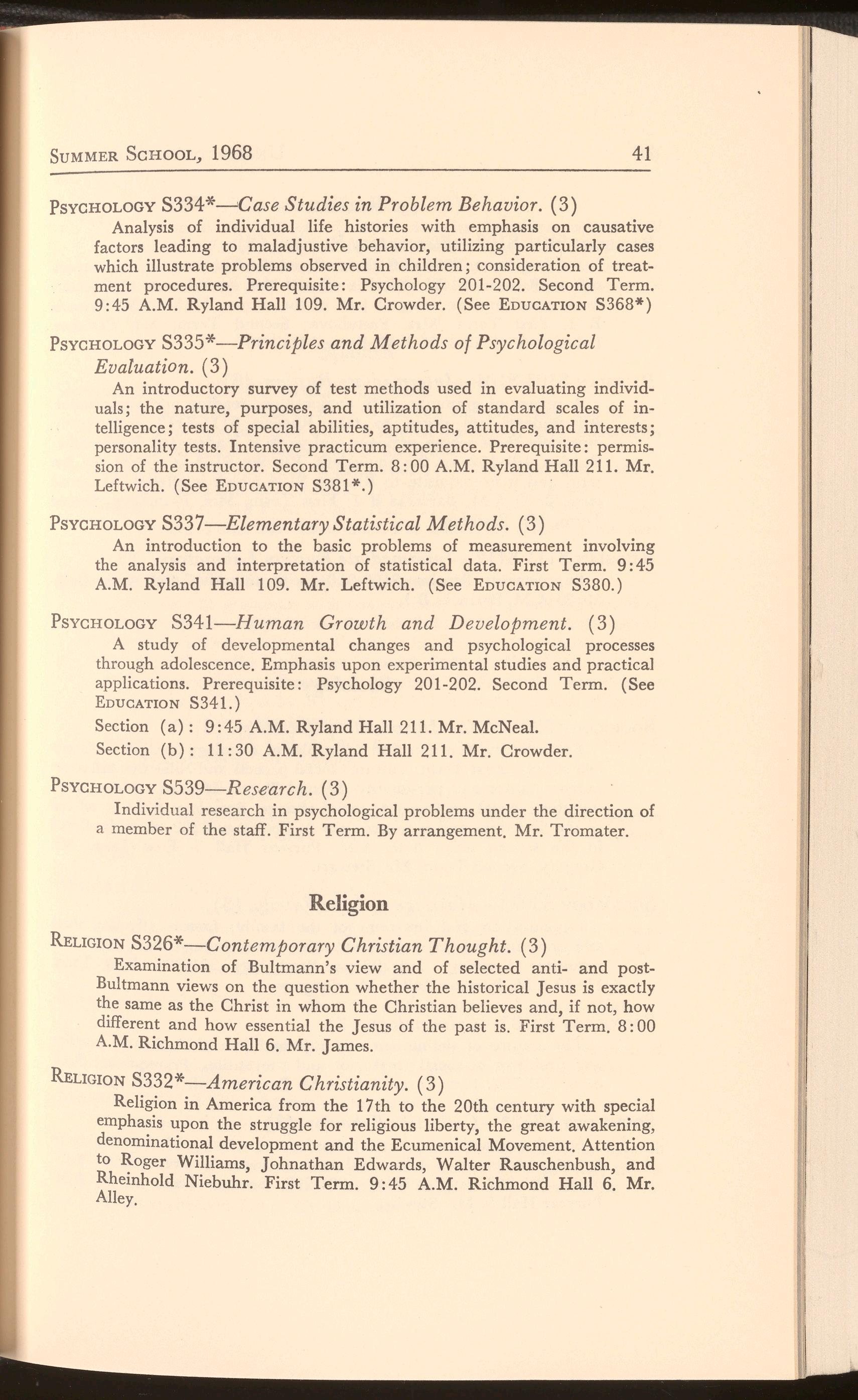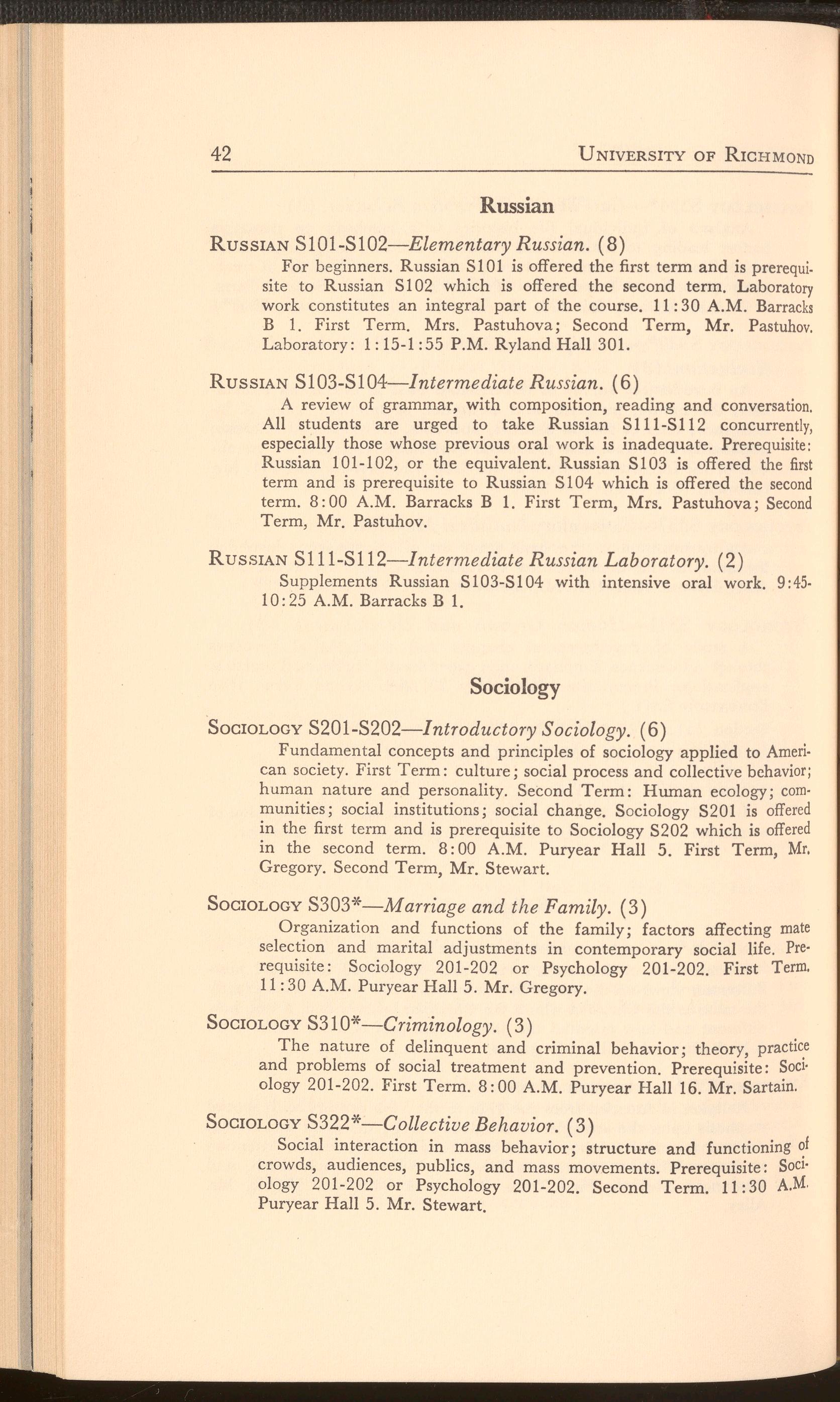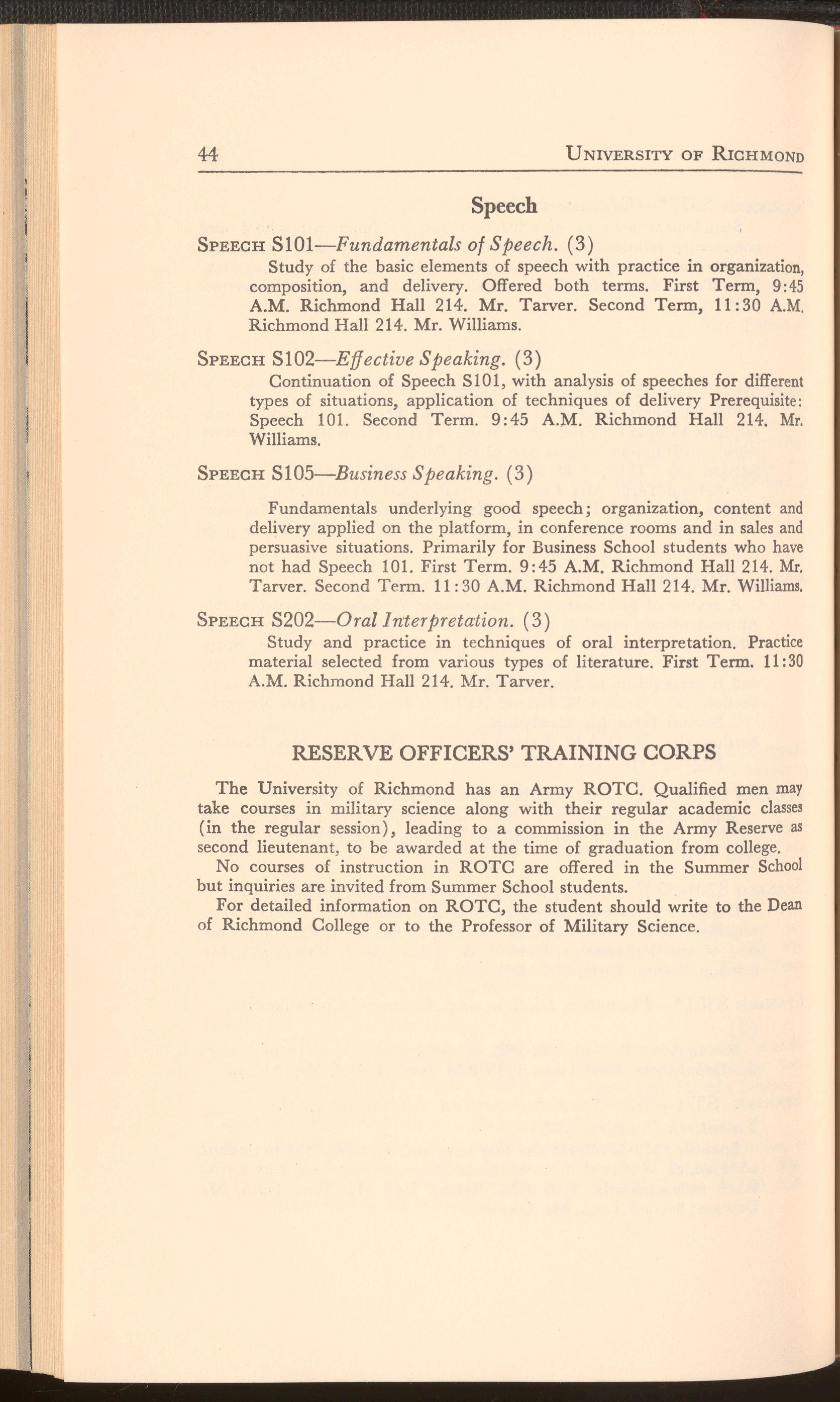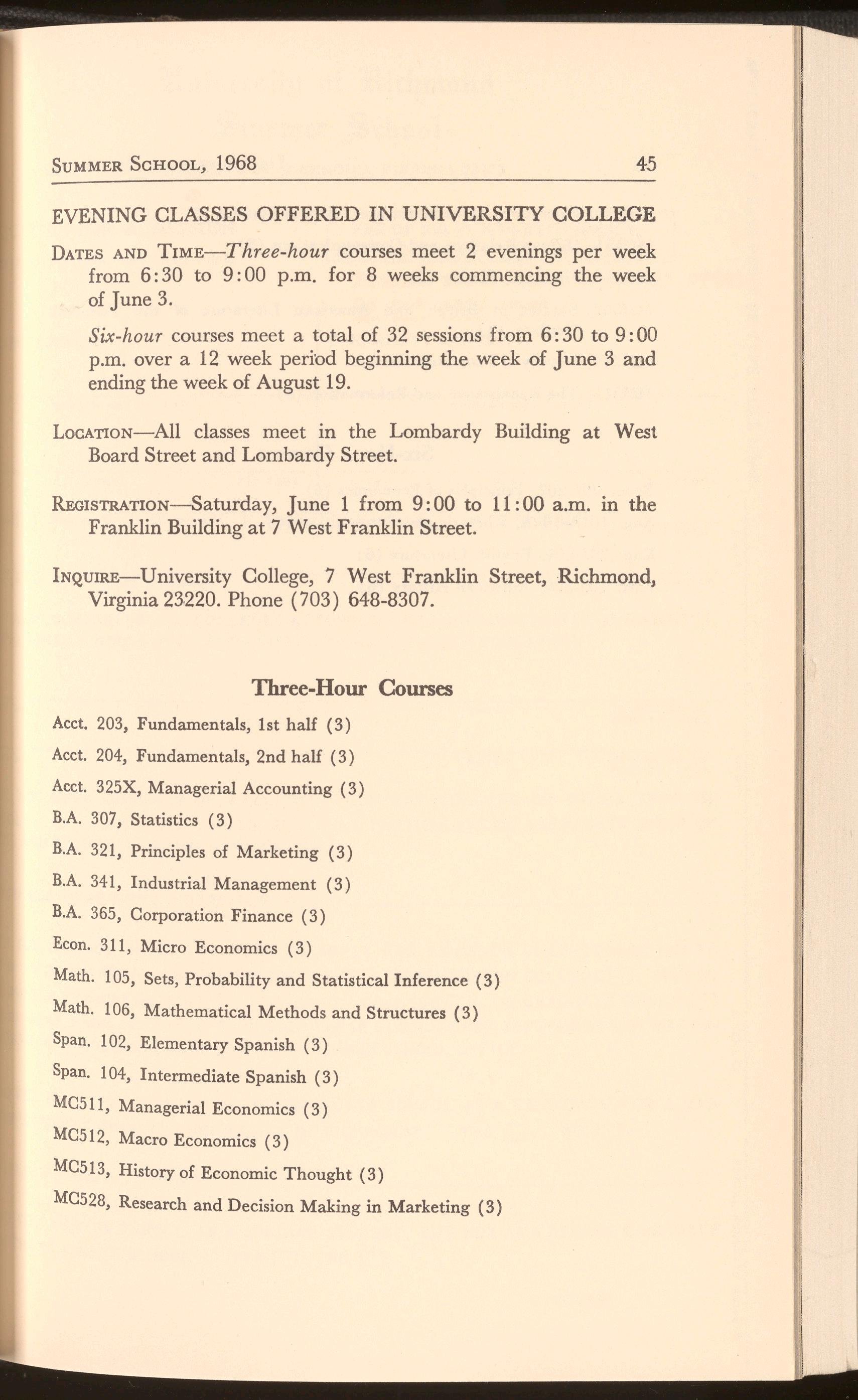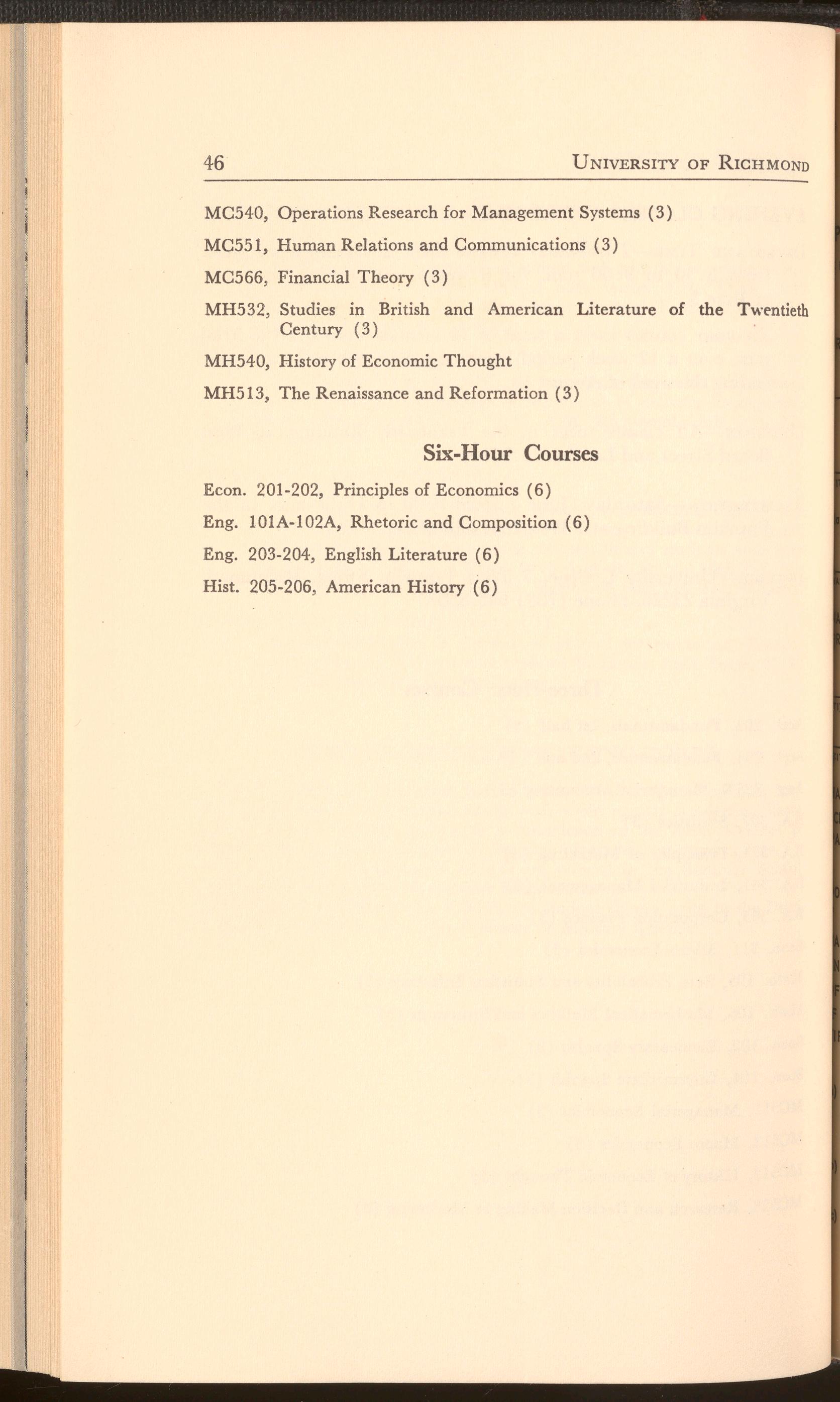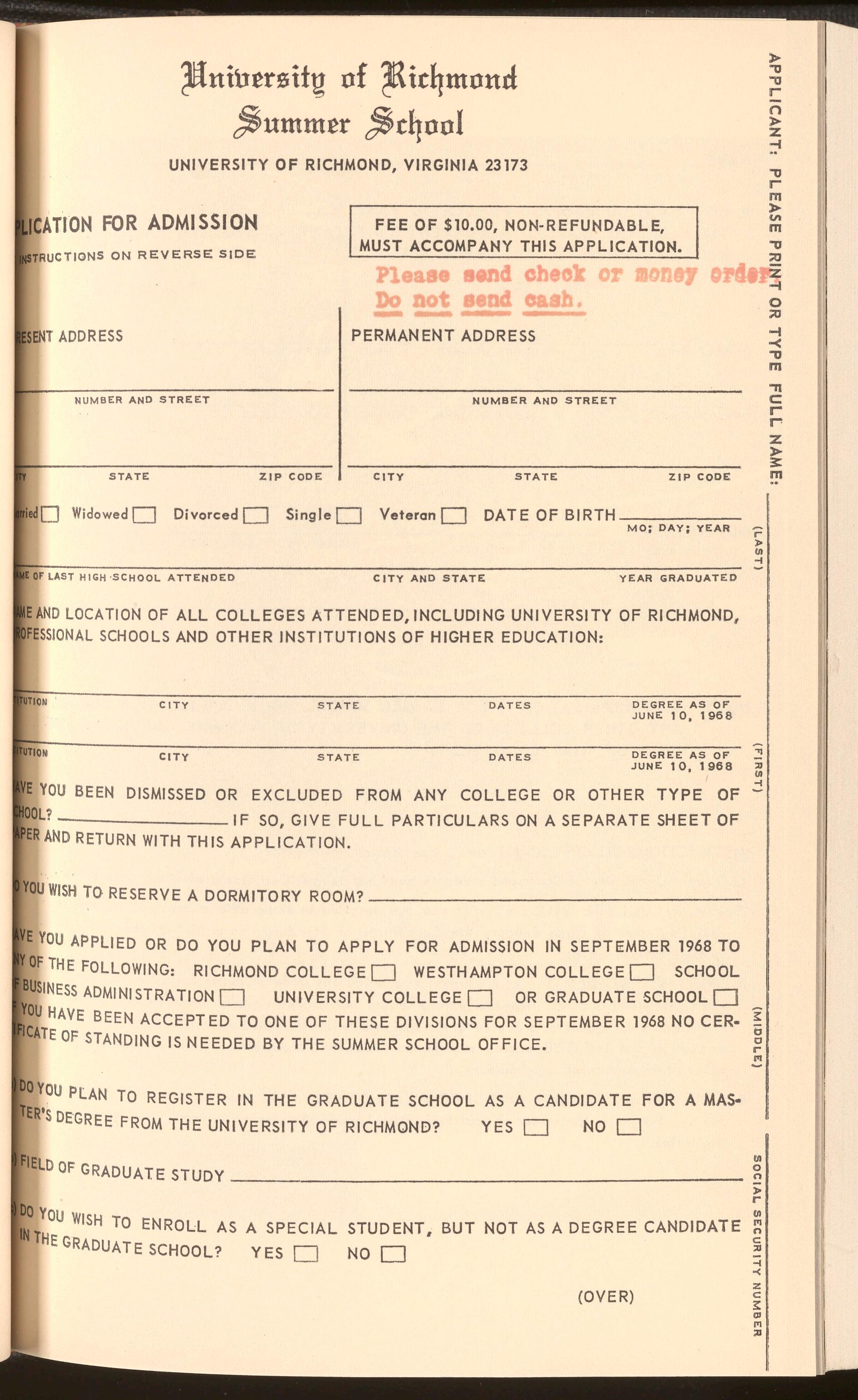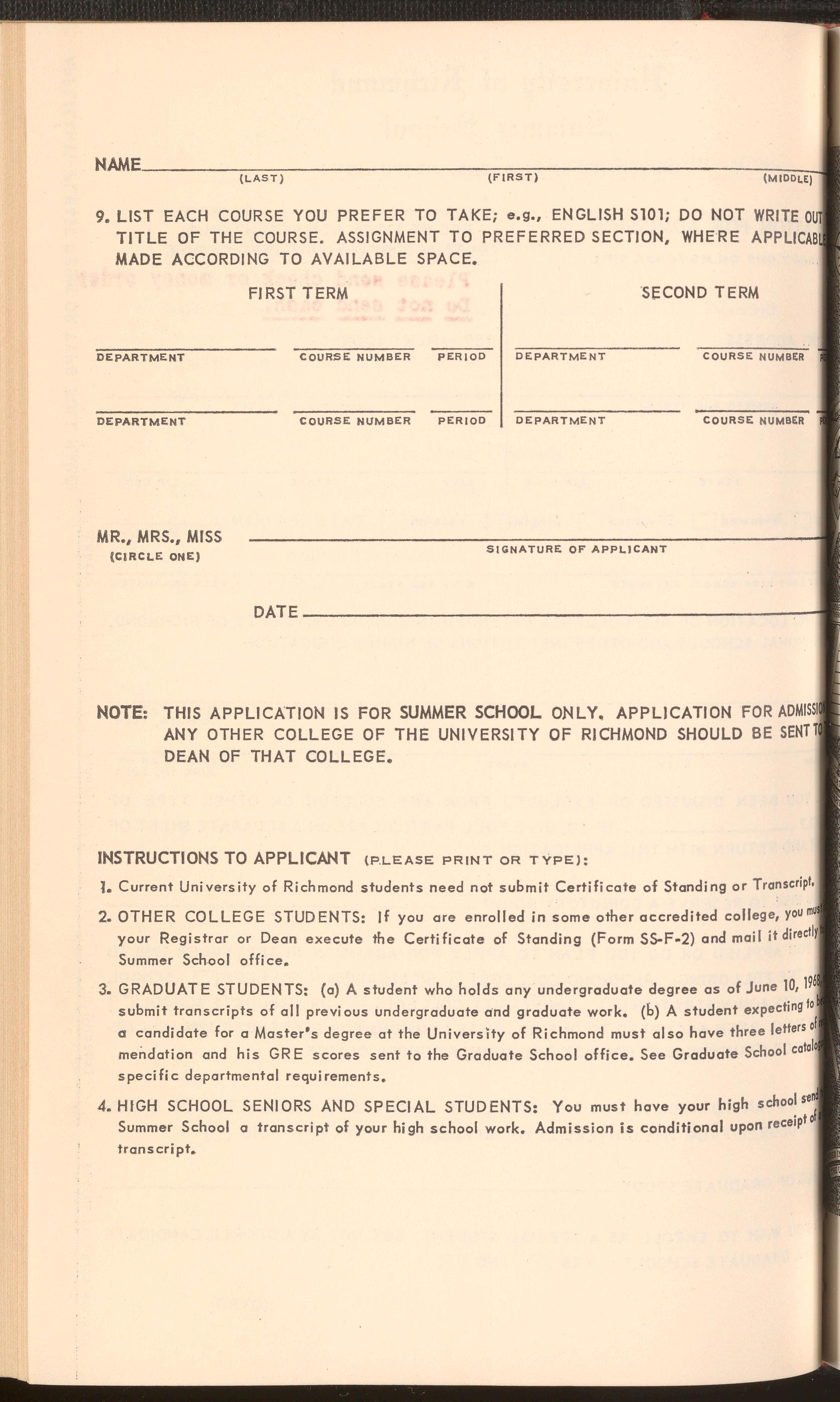Summer School Catalogue
ELEVEN-WEEK SESSION
]un.e 10 to August 23
First Term: June 10-July 16
Second Term: July 17-August 23
UNIVERSITY of RICHMOND
VIRGINIA
1968
Term
1st Term 2nd Term
Sub-Total
SUMMER SCHOOL CALENDAR-1968
JuNE 10, MoNDAY-Registration in Millhiser Gymnasium, 8:00 A.M.-11 :30 A.M. and 1 :00 P.M.-2:00 P.M.
JuNE 11, TUESDAY-Classes begin at 8:00 A.M.
JUNE 12, WEDNESDAY-Last day to make any change in classes. (Late fee: $10.00.) Applications for degrees filed with Registrar.
JUNE 15, SATURDAY-Classesmeet to make up registration day.
JULY 4, THURSDAY-Independence Day Holiday.
JuLY 15 AND 16, MoNDAYANDTUESDAY-First-t erm examinations.
JuLY 16, TUESDAY-First term ends.
JULY 17, WEDNESDAY-Registration and changes in classes for second term, Millhiser Gymnasium, 1 : 00 P.M.3: 30 P.M .
JULY 18, THURSDAY-Classesbeginat8:00A.M.
JuLY 19, FRIDAY-Last day for changes in classes. ( Late fee: $10.00.)
AuGusT 1, THURSDAY-Last day for submitting bound copies of theses by applicants for Masters' degrees in August.
AuGUST 20 AND 21, TUESDAYANDWEDNESDAY-Examinations for degree candidates.
AUGUST 22 AND 23, THURSDAYAND FRIDAY-Second-term examinations.
AUGUST23, FRIDAY-Commencement, 7: 30 P.M.
Classes will meet daily, Monday through Friday and on Saturday, June 15, to make up registration day.
1967 SUMMER SCHOOL ENROLLMENT
ADMINISTRATIVE OFFICERS
GEORGEMATTHEWSMODLIN,PH.D ., LL.D. President
CHARLESH. WHEELER,III, PH.D., D.Sc. Treasurer
ROBERTFORTESMART,PH.D. Provost
EDWARDFRANKLINOVERTON,PH.D. Dean
CLARENCEJ. GRAY,M.A., ED.D. Dean of Students
THOMASNICHOLASPOLLARD,JR., M.A. Registrar
ARDIEL. KELLY,M.S. IN L.S. Librarian
JOSEPH E. NETTLES Director of Public Relations
ADMINISTRATIVE STAFF
EttENE GRAYLowRY ........................ ... .Secretary to the Dean
MRs. LYSLE R. HAZELGROVE..............
FACULTY OF INSTRUCTION
Gene L. Adrean, Dr. in Lett ......................... Assistant Professor of Italian
Alicia G. R. Aldaya, Dr. en Fil. y Letras ........ Visiting Lecturer in Spanish
Robert S. Alley, B.D., Ph.D ....... Associate Professor of Bible and Religion
H. Pearce Atkins, Ph.D ......................................... Professor of Mathematics
Peter B. Bahler, M.A....... Instructor in Mathematics and Director of the Computer Center
Lewis F. Ball, Ph.D Professor of English
Charles Fred Bateman, M.A. .................. Visiting Lecturer in History and Political Science
Anne C. Beirne, M.A..................................................... Instructor in Biology
Robert H. Bell, B.S., Graduate Student, Medical College of Virginia Instructor in Chemistry
Thomas S. Berry, Ph.D ............... Associate Professor of Economics
John W. Bishop, Ph.D ..................................... Assistant Professor of Biology
Kenneth A. Blick, Ph.D . ........................Associate Professor of Psychology
John C. Boggs, Jr., M.A ............................................... Instructor in English
Ernest C. Bolt, Jr., Ph.D ................................. Assistant Professor of History
Jacob Van Bowen, Jr., Ph.D ................. Assistant Professor of Mathematics
Irby B. Brown, Ph.D ..................................... Assistant Professor of English
Humberto I. Cardounel, Dr. en Dro., Dr. en C.S.P.E. Assistant Professor of Spanish
Zada D. Carver, M.A .. ................................. Visiting Lecturer in Education Head Counselor, John Marshall High School
John S. Catlin, M.A................................... Instructor in Ancient Languages
L. Burke Crowder, M.S ........................................... Instructor in Psychology
W. Harrison Daniel, Ph.D . Associate Professor of History
Albert C. Dawson, M.A. .............................................. Instructor in Spanish
Laila M. Dawson, M.A................................................. Instructor in Spanish
R. Dean Decker, Ph.D ..................................... Assistant Professor of Biology
William A. Dorsey, B.S..................................... Visiting Lecturer in Biology Chief, Richmond Public Health Laboratories
Frank E. Eakin, Jr., B.D., Ph.D ....................... Assistant Professor of Bible
Alice S. Evangelides, M.A., LL.B..... Visiting Lecturer in Political Science
Harry L. Farmer, M.S ................................................. Instructor in Spanish
Judith Overstreet Farmer, M.A....................... Visiting Lecturer in Spanish
Larry D. Flora, Ed.D ................................. Assistant Professor of Education
E. Elwood Ford, M.B.A., LL.B., C.P.A. Associate Professor of Accountint
SUMMER SCHOOL, 1968 5
William Joe Frierson, Ph.D ..................... Visiting Lecturer in Chemistry Professor of Chemistry, Agnes Scott College
E. Sherman Grable, M.A. .................. Associate Professor of Mathematics
E. Wadsworth Gregory, Jr., Ph.D ......................... Professor of Sociology
Garland 0. Gunter, Ph.D ............................. Assistant Professor of English
William B. Guthrie, Ph.D ......................... Associate Professor of English
Henry 0. Gwaltney, Ed.D . Associate Professor of Psychology
James H. Hall, Jr., Ph.D ......................... Associate Professor of Philosophy
Philip R. Hart, B.D., Ph.D ..................... Associate Professor of Bible and Religious Education
Dan Hartman, B.A., Graduate Student, Yale University Visiting Lecturer in French
Nathaniel H. Henry, Ph.D ............................. Associate Professor of English
Richard E. Humbert, Ed.D ......................... Professor of Physical Education
Robison B. James, B.D., Ph.D. Associate Professor of Bible and Religion
FrancisB. Leftwich, Ph.D ............................. Associate Professor of Biology
William H. Leftwich, Ph.D ..................... Associate Professor of Psychology
Thomas C. Little, Ed.D ...............................
Visiting Lecturer in Education Assistant Superintendent, Richmond Public Schools
Jon Longaker, M.A. .................................................. Visiting Lecturer in Art Professor of Art, Randolph-Macon College
Robert A. MacDonald, Ph.D ..................................... Professor of Spanish
WeaverM. Marr, Jr., Ph.D ......................... Associate Professor of German
RoseMarie Marcone, Ph.D ....... Associate Professor of Spanish and Italian
Richard A. Mateer, Ph.D ........................... Assistant Professor of Chemistry
HuguesR. Mathieu, Baccalaureat ................................ Instructor in French
John R. McClenon, Ph.D .........................
Visiting Lecturer in Chemistry Assistant Professor of Chemistry, Sweetbriar College
Leonard D. McNeal, M.A Assistant Professor of Physical Education
James A. Moncure, Ph.D ............................................. Professor of History
Associate Dean of Liberal Arts, University College
Clarence Monk, Ph.D ..................... Associate Professor of MathematicJ
HelenAM II MA L"tt D v· · · L t · Ed t· . onse , ., 1 • • •...•........... zsztzng ec urer zn uca zon
Jerry D. Morton, M.A. .................................................. Instructor in English
Edward F. Overton, Ph.D. ................................ Professor of Education and Dean of the Summer School
SergePastuhov, M.A. ........................................Visiting Lecturer in Russian
CatherineA. Pastuhova, Ph.D ....... Visiting Lecturer in Modern Languages
F. Elaine Penninger, Ph.D ............................. Associate Professor of English
WilliamC. Perrine, A.M. ..........................Instructor in Ancient Languages
ErnestC. Perry, M.A. ....................................................Instructor in French
I I I I
UNIVERSITY OF RICHMOND
J. Stanton Pierce, Ph.D., D.Sc ............................. Professor of Chemistry
W. Allan Powell, Ph.D ............................................... Professor of Chemistry
James W. Rachels, Jr., Ph.D ................... Assistant Professor of Philosophy
Willie M. Reams, Jr., Ph.D ......................... Associate Professor of Biology
0. William Rhodenhiser, Th.D ......................................... Professor of Bible
Nolan E. Rice, Ph.D ....................................................... Professor of Biology
John R. Rilling, Ph.D ..................................... Associate Professor of History
F. David Sanders, Ph.D ................................. Associate Professor of English
James A. Sartain, Ph.D ............................. Associate Professor of Sociology
Gerald C. Schaefer, M.S ............................................. Instructor in Biology
Talbot R. Selby, Ph.D ............................... Professor of Ancient Languages
N. Wilford Skinner, M.A ............................. Associate Professor of German
Helen Louise Smith, M.A., C.A.S., Harvard University Assistant Professor of Education
Howard M. Smith, M.A ............................................... Instructor in Biology
1Samuel W. Stevenson, Ph.D ......................................... Professor of English
Henry H. Stewart, M.A. ............................ Assistant Professor of Sociology
Marion J. Stokes, M.A. ........................ Assistant Professor of Mathematics
Carter W. Stone, M.A ..................................................... Instructor in French
Jerry L. Tarver, Ph.D ................................... Associate Professor of Speech
Jackson J. Taylor, M.S ................................. Associate Professor of Physics
Welford D. Taylor, Ph.D ............................... Assistant Professor of English
Robert M. Terry, Ph.D ................................. Associate Professor of French
Haley F. Thomas, M.A. ............................ Instructor in Modern Languages
Herman P. Thomas, Ph.D ......................................... Professor of Economics
L. James Tromater, Ph.D ......................... Assistant Professor of Psychology
Charles Turney, Ph.D ................................... Associate Professor of English
Robert H. Umphlett, M.A. .......................................... Instructor in German
Thomas B. Vassar, II, M.S ................................... Instructor in Mathematics
L. Charleen Weatherford, M.A ................... Visiting Lecturer in Education Assistant Principal, Fairfield Junior High School
John D. Welsh, Ph.D ....... Assistant Professor of Speech and Dramatic Arts
Warwick R. West, Jr., Ph.D ......................................... :. Professor of Biology
R. Barry Westin, Ph.D ................................... Assistant Professor of History
Joseph S. White, A.B., Graduate Student, University of North Carolina Assistant Professor of Ancient Languages
Sarah E. Wilhelm, B.A., Graduate Student, Vanderbilt University Instructor in Modern Languages
Alton Williams, M.A. Associate Professor of Speech and Dramatic Arts
Charles F. Wiltshire, M.A. ................ Visiting Lecturer in Political Science
William S. Woolcott, Jr., Ph.D ................................. Professor of Biology
GENERAL INFORMATION
• Organization
Established in 1920, the Summer School became the fourth division in the University of Richmond. The first of the seven divisions of the University of Richmond was Richmond College, founded in 1830as a college of liberal arts and sciences for men. The remaining divisions are the T. C. Williams School of Law ( 1870); Westhampton College, a college of liberal arts and sciences for women (1914); the Graduate School (1921); the School of Business Administration ( 1949); and University College ( 1962). Each school has its own dean, its own faculty, and its own institutional life. The University Senate, on which sit representatives of all the faculties, provides for intercollegiate cooperation.
The legal name of the corporation is University of Richmond. It was founded by and is affiliated with the Baptists of Virginia. The Board of Trustees of the University of Richmond controls all endowment and other funds and makes all appropriations. The several collegesaward no degrees, but all degrees for work done in any one of the colleges are conferred by the University of Richmond. Ultimate authority is vested in the Board of Trustees and the President of the University.
The University of Richmond, one of the affiliated institutions of the University Center in Virginia, benefits from the several cooperative programs of the Center.
Accreditation
The University of Richmond is accredited by the Virginia State Board of Education and the Southern Association of Colleges and Schools.It is a member of the Southern University Conference, the ~ssociation of American Colleges, the American Council on Education, and the National Association of College and University Summer Sessions.
Purpose
Th~ University of Richmond, related to the Baptist General Associati'onof Virginia, strives to provide a challenging and com-
prehensive academic program in a Christian atmosphere in which students of all faiths may apply themselves individually and collectively to developing their intellectual, spiritual, social, and physical potentialities. It seeks to give each student an intellectual experience that will widen his vision, deepen his faith, strengthen his character, and equip him to think and act rationally in our complex society. It fosters intellectual understanding, it defends freedom of discussion, and it prom'otes an objective search for truth; for without these conditions true education does not exist.
In pursuing these general purposes the University recognizes specific areas 'Of obligation and opportunity. Primarily a teaching institution in the liberal arts tradition, it seeks to provide a basis of sound learning and teaching and opportunities in research for the intellectual and cultural development of its students and faculty; as a church-related institution, it must prepare s·ome students for full-time Christian vocation and must provide for all students opportunities for the development of a satisfying personal faith, ethical maturity, and morally responsible leadership; as a privately endowed and privately controlled institution, it should develop human personality for its fullest expression through individual freedom without political pressures and control; and as an urban institution, it recognizes its obligation to prepare responsible citizens not only for useful careers in the City and State but also for leadership in a democratic society.
Groundsand Buildings
The main campus of the University of Richmond, often referred to as one of the most beautiful natural college campuses in the United States, contains three hundred and fifty acres of lawns and woodlands. It is situated on the hills above the historic James River, ah'out six miles west of downtown Richmond and may be reached by buses operating on frequent schedules.
All permanent buildings are of substantial fireproof construction, and everywhere attention has been paid to safety, health, and com· fort in surroundings of striking landscape and architectural beauty.
The Summer School is usually conducted in the buildings of Richmond College, the office of the Dean of the Summer School be• ing located on the ground floor of Robert Ryland Hall. The Uni• versity Administrative offices of the President, Treasurer, and Provost are located on the ground floor (lake side) of the Boat· wright Library. The science departments are in Puryear Hall (chemistry), Richmond Hall (physics and mathematics), and
Maryland Hall (biology). The School of Business Administration and the T. C. Williams School of Law occupy their respective buildings on the main campus. The downtown campus of University Collegeis located at 7 West Franklin Street.
Library Facilities
The libraries of the University contain over 185,000 volumes. The main collection is housed in the imposing Frederic William Boatwright Memorial Library. The central structure, provided by contributions of the Baptists of Virginia, is equipped with the most modern facilities for study and research. A wing of the building contains the valuable collection of the Virginia Baptist Historical Society. In addition to the main collection there are divisional and departmental collections housed in other buildings on the campus, such as: law, business, biology and chemistry.
The University collections are classified by the Dewey Decimal System,and the students have direct access to the shelves. Instruction in the use of the Library is given to all freshmen.
The collections in the Richmond Public Library, Virginia State Library, Medical College of Virginia Library, the Virginia Institute for Scientific Research Library, and the Virginia Historical Society Library afford exceptional additional facilities for research.
LIBRARY HOURS
The regular library hours begin on Tuesday, the day following Summer School Registration Day.
Monday through Thursday ..... ................... 8: 00 A.M.- 5: 00 P.M. and 6:30 P.M.-10:00 P.M.
Friday ............................................................ 8: 00 A.M.-5: 00 P.M.
Saturday ........................................................ 8: 30 A.M.-12: 30 P .M.
The library will be closed on Sundays and on July 4. There will be no evening hours on July 16 and 17.
Scope of Offering
Coursesare offered to meet the needs of the following:
1. Qualified high school students wishing to begin their college studies before the fall term.
2 · Qualified high school juniors who wish to enrich their academic background. This special opportunity is explained on page 12.
3. Regular college students, as well as those working on an accelerated program.
4. Pre-professional students desiring to meet entrance requirements of medical, law, and other professional and technical schools.
5. Students in the T. C. Williams School of Law.
6. Students in University College.
7. Teachers needing to revive or renew their certificates, or broaden their teaching fields in foreign languages, mathematics, science, history, English, and elementary education.
8. Graduate students desiring work leading to the degrees of Master of Arts, Master of Science, and Master of Science in Education.
9. Students interested in traveling abroad to intensify and enrich their study of history, art, English literature and drama.
Length of Session
The 1968 summer session will extend through a period of eleven weeks. In the first term of five and one-half weeks, from June 10 through July 16, classes will meet daily Monday through Friday with a holiday on July 4. Classes will meet one Saturday (June 15) to make up registration day. In the second term of five and one-half weeks, beginning July 17, classes will meet daily Monday through Friday. The length of the class periods will be ninety minutes net time.
The Honor System
One of the outstanding traditions of the University of Richmond is the concept of honor held by the students in its several colleges. The Honor System requires that a person shall in all relations of student life act honorably. The essence of the Honor System is that a student's word as a member of the Summer School can be accepted without question as the truth and that any violation of a student's word is an offense against the entire student body. Breaches of the Honor Code include cheating, violation of a signed pledge, lying, stealing, failure to report one's own or witnessed violations of the Honor Code, failure to appear before the Honor Council when summoned, and, in general, breaking one's word of honor in any circumstances.
When a student matriculates for either term of the Summer
School, he is given an explanation of the Honor Code, by which he must agree to abide before he can finally complete his matriculation.
University Center for Psychological Services
The University Center for Psychological Services will be in operation during both terms of the Summer School. The Center will provide testing and counseling services and work in reading improvement for students of the Summer School. No special fees will be charged for such services to full-time Summer School students. Center services are provided also on a special fee basis to individuals not enrolled in the Summer School.
Post Office and Telegraph Address
The post office address is University of Richmond, Virginia 23173. The telegraph address is Richmond, Virginia. The telephone number is (703) 288-1921.
ADMINISTRATION
Requirements for Admission
For admission to the Summer School, the applicant must be at leastsixteen years of age, and the graduate of an accredited secondary school, except that students twenty-one years of age and over who are not graduates of accredited secondary schools, but who meet other qualifications, may enter as Special Students, but not as candidates for degrees.
All applicants who have not previously been enrolled in the University of Richmond must present their entrance credentials. Students planning to enter Summer School directly after graduat'.ng from high school must submit transcript of high school work, including scores on the Scholastic Aptitude Test and three Achievement Tests of the College Entrance Examination Board. The Achievement Tests must be in English, mathematics (level I or level II), and a third one of the student's choice. Students who have had a copy of their high school transcript and the above test data sent to Richmond College or Westhampton College need not send duplicates to the Summer School. For information concerning test dates and testing centers for the College Entrance Examination Board, the candidate should inquire of his high school counseloror principal, or write to the Educational Testing Service, Box592, Princeton, New Jersey 08540.
UNIVERSITY OF RICHMOND
Those applying for admission from accredited colleges or universities need not send a complete transcript of their college work unless they also wish to apply for admission to some other division of the University of Richmond. For admission to the Summer School only, the applicant must present a Certification of Standing form containing a statement from the dean or registrar of the institution in which he is currently enrolled to the effect that he is in good standing and that his proposed summer courses are approved. If a student's status changes after this statement is issued, his admission to the Summer School is governed accordingly. A student who wishes to remove a scholastic deficiency must be certified as eligible to return to his college in September 1968, upon successful completion of his Summer School work.
All applications, together with other necessary papers, such as transcripts or Certification of Standing form, should be received in the Summer School office not later than one week prior to the opening of Summer School. Of course, the earlier an application is cleared, the greater are the applicant's chances of getting the classes he desires.
Summer School Abroad
In 1968, the University of Richmond will ·offer its sixth Study Abroad Program in Europe. Under the direction of Dr. James A. Moncure, Professor of History and Associate Dean of University College, and Mr. Jon Longaker, Visiting Lecturer in Art and Profess-orof Art at Randolph-Macon College, this program will include two courses: History S304*-Europe from the Renaissance to Waterloo and Art S312-European Art from the Renaissance to Modern Times. Students will visit Madrid, Athens, Rome, Florence, Turin, Geneva, Berlin, London and Paris. The courses will be conducted in English. Enrollment is open to undergraduates and graduates for either credit or non-credit. Final examination will be given upon return to the United States.
In addition to the History and Art Appreciation courses, two new courses will be offered in cooperation with the University ·of Reading in England. Dr. Irby B. Brown, Assistant Professor of English, will conduct a course in Modern British and American Drama and Dr. John D. Welsh, Assistant Professor of Speech and Dramatic Arts, will offer Introduction to the Theatre. Students wiU travel to Oxford, Stratford-upon-Avon, London, Chichester and Edinburgh. Write for special brochure on either of the above programs.
Special Opportunity for High School Students
The University will admit qualified high school students who will have completed the work of the junior year by the close of the current session.
The Summer School affords to those accepted an opportunity to enrich their academic background by participating in college level courses for full credit. It also introduces the student to the stimulating college community, and presents an academic challenge to the ambitious student.
All freshman level courses are open to those high school students whose scholastic achievement and aptitude clearly indicate preparedness for such work. Students will enroll as full time Summer School students subject to all rules and regulations of the University of Richmond Summer School. Credit earned in this program will be kept on file to be applied to the student's degree program if he is accepted to Richmond College or Westhampton College upon graduation from high school, or a transcript will be forwarded to another college if requested by the student. It is always the receiving institution which has the right to evaluate any credits presented to it. The credits are not transferable to a secondary school.
Special admission requirements for students in this program include the following: ( 1) rank in the top fifth of the junior class; (2) aptitude and achievement test scores that clearly indicate capacity for college level study; ( 3) evidence of interest and determination to meet the challenge of college level work; and ( 4) recommendation of the high school principal (or headmaster) or guidance counselor.The Summer School cannot guarantee consideration of any application for this special program received after June 1, 1968.
Application Procedure
High school juniors should request their high school to send transcript of their high school work through the first semester of their junior year, together with appropriate test data. A supple~e~tary transcript showing the work of the final semester of their Jumor year should be forwarded as soon as possible prior to June 10.
High school graduates should request their high school to send transcript of their high school work through the first semester of their senior year, together with College Board scores and other test data. A supplementary transcript showing the work of their final semester of_h1ghschool and the date of their graduation should be forwarded prior to June 10.
UNIVERSITY OF RICHMOND
Applicants from accredited coll eges must have their dean or registrar send a Certificate of Standing form in lieu of a transcript.
Holders of a Bachelor's degree must have transcript of all college work undertaken sent to the Dean of the Graduate School regardless of whether they intend to take work for graduate or undergraduate credit.
All applicants: An application fee of $10.00, which is not refundable, must accompany every application for admission.
Matriculation
Students who have been accepted for admission register for either term or for both terms Monday, June 10 in Millhiser Gymnasium from 8: 00 A.M. to 11: 30 A.M., and from 1: 00 P.M. to 2: 00 P.M. Students attending the second term only will register on Wednesday, July 17, from 1 :00 P.M. to 3:30 P.M. if they did not register previously on June 10.
Regular class work will begin at 8:00 A.M. Tuesday, June 11, for the first term and Thursday, July 18, for the second term. Class absences count from the first day.
After registration has been completed, no student is permitted to change from one course to another or from one section of a class to another without the approval of the Dean. No such change will be permitted for the first term after Wednesday, June 12, or for the second term after Friday, July 19. The fee for changing classes or sections is $10.00. No change from credit to audit status or from audit to credit status can be made after the second day of classes. No matriculations will be accepted for a first-term class after Tuesday, June 11 or for a second term class after 4: 00 P.M. Thursday, July 18. Students who fail to complete matriculation for the first term by 2: 30 P.M. June 10, in Millhiser Gymnasium or by 4:00 P.M. the same day through the Treasurer's office will have to pay a late matriculation fee of $10.00. Late registrants for the second term are also subject to the $10.00 late matriculation fee.
In matriculating students, the University reserves the right to require the immediate withdrawal of any student from the Summer School whenever the administration decides that such action is desirable. In matriculating, the student agrees that the University has such a right.
Absences
Because of the shortness of the terms in Summer School, no absences from classes or laboratory periods are allowed except for
1968 15 emergencies. Such emergencies will be considered individually by the Dean or the Dean of Students.
Grading
The achievement of students in class work and in examinations is indicated as follows: The letter A indicates that the work has been excellent (95-100); B, that it has been very good (88-94); C, that it has been average (80-87) ; D, that it has been just passing (75-79) ; "E" and "F" are failing grades; "O" indicates failure because of excess absences; "W" and "M" indicate withdrawal; and "I" means incomplete. The grade of "E" may be raised to a passing grade of "D" by such method as the professor may indicate in writing to the Registrar, but it automatically becomes an "F" unless it is successfully removed within twelve months or before the course on which it was incurred is offered again. The grade of "I" may be removed upon satisfactory completion of the incomplete work. The final grade of "I" (Incomplete) shall become a final grade of "F" within one week after the official close of the term in which the grade was incurred. The only exceptions shall be those approved by the Dean upon request if the instructor designates a specified period ·of time for the removal of the grade of "I." Where the grade is "F," the course must be repeated and passed if the student is to obtain credit. If a student withdraws from the Summer School or drops a class after the third day of the term, a grade of "M" (Withdrew-Failing) will be recorded unless in the judgment of the Dean ·or Dean of Students and the professor concerned the grade should be recorded as "W" ( WithdrewPassing). If the withdrawal is made on the recommendation of the Dean or Dean of Students, a grade of "W" will be recorded. Special examinations on work in the summer session may be taken on September 16, 1968. Applications for such special examinations must be made, in writing, to the Registrar's office at least two weeks before the examination date. Each application must be accompanied by the Treasurer's receipt for the special examination fee of two dollars.
Limits of Work
The normal amount of work which a student may take is two 3-semester hour courses (or one 3-semester hour course and one 4-semester hour course) each term. Students who wish to take more than this amount of work must include with their re-
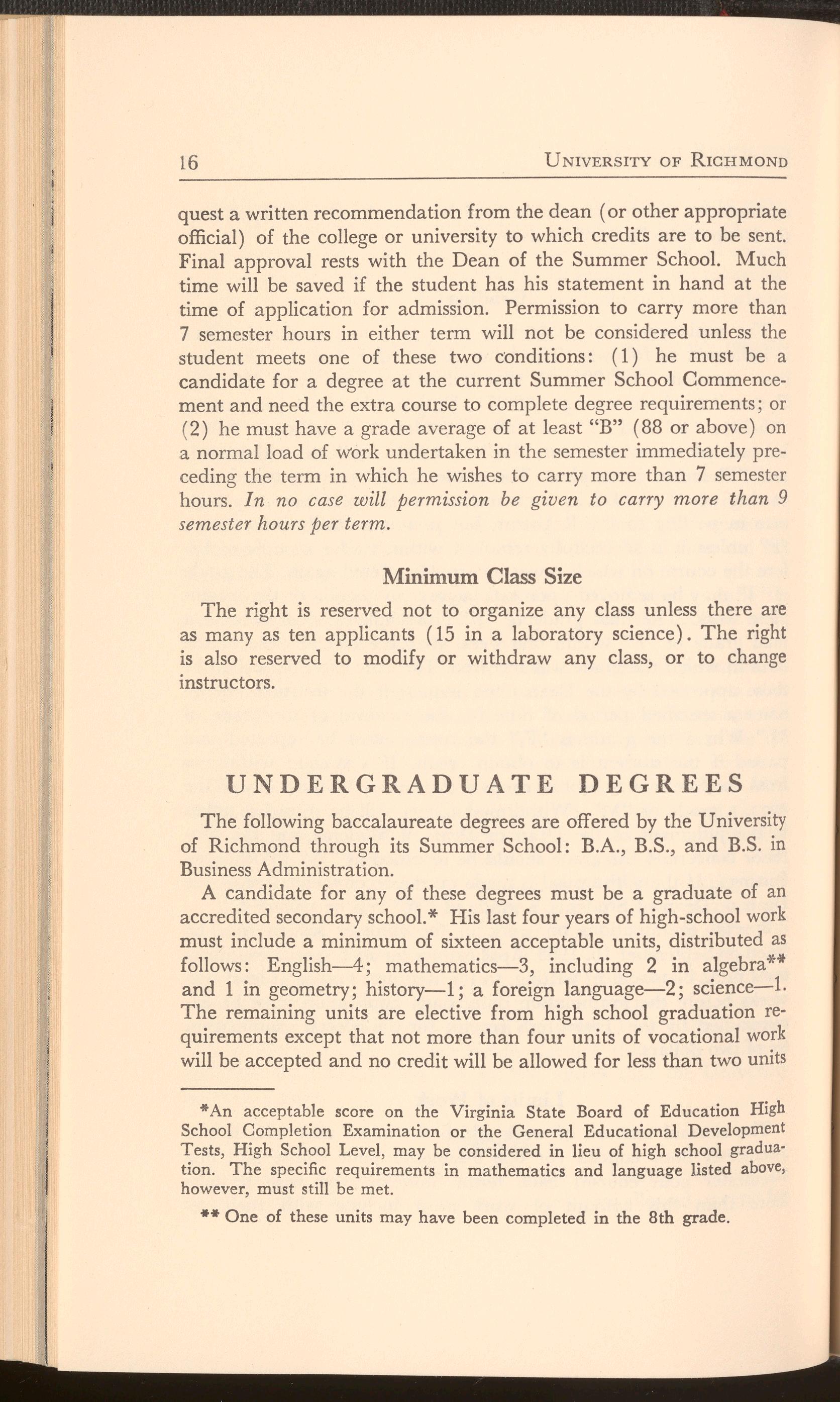
quest a written recommendation from the dean ( or other appropriate official) of the college or university to which credits are to be sent. Final approval rests with the Dean of the Summer School. Much time will be saved if the student has his statement in hand at the time of application for admission. Permission to carry more than 7 semester hours in either term will not be considered unless the student meets one of these two c·onditions: ( 1) he must be a candidate for a degree at the current Summer School Commencement and need the extra course to complete degree requirements; or (2) he must have a grade average of at least "B" (88 or above) on a normal load of work undertaken in the semester immediately preceding the term in which he wishes to carry more than 7 semester hours. In no case will permission be given to carry more than 9 semester hours per term.
Minimum Class Size
The right is reserved not to organize any class unless there are as many as ten applicants ( 15 in a laboratory science). The right is also reserved to modify or withdraw any class, or to change instructors.
UNDERGRADUATE DEGREES
The following baccalaureate degrees are offered by the University of Richmond through its Summer School: B.A., B.S., and B.S. in Business Administration.
A candidate for any of these degrees must be a graduate of an accredited secondary school.* His last four years of high-school work must include a minimum of sixteen acceptable units, distributed as follows: English-4; mathematics-3, including 2 in algebra** and 1 in geometry; history-1; a foreign language-2; science-!. The remaining units are elective from high school graduation requirements except that not more than four units of vocational work will be accepted and no credit will be allowed for less than two units
*An acceptable score on the Virginia State Board of Education High School Completion Examination or the General Educational Development Tests, High School Level , may be considered in lieu of high school gradua· tion. The specific requirements in mathematics and language listed above, however, must still be met.
** One of these units may have been completed in the 8th grade.
in any foreign language. A student who enters college without two units in foreign language will be required to take in college without degree credit a first-year foreign language to remove his deficiency.
The academic requirements for the several degrees are stated in semester hours. Grade points are calculated from academic hours on the following basis: each semester hour passed with grade A shall c·ount four grade points; with grade B, three grade points; with grade C, two grade points; with grade D, one grade point; and with grade F, no grade point.
B.A. and B.S.-During the second semester of his sophomore year, a student must select a field of concentration which will include not less than twenty-four hours in one department and courses in related subjects to bring his total in the field of concentration to a minimum of forty-two semester hours. His program of studies in this field must be made out under the guidance of the chairman of the department in which he wishes to concentrate, and be filed in the Registrar's office. In the majority of cases, the field of concentration will consist of twenty-four hours in one department and eighteen hours in related subjects approved by the chairman of the department. In the laboratory sciences, these will be from twentyeight to thirty-three and twenty semester hours respectively. For the B.S. degree the whole field of concentration will be chosen from the laboratory sciences and mathematics.
B.S. in Business Administration-Students who wish to enter the School of Business Administration as full-time students must have completed sixty semester hours and must have earned a minimum of a true "C" average on total hours attempted. In selecting applicants for admission, the School of Business Administration is interested in men and women with well-rounded liberal arts backgrounds who have given evidence of earnestness of purpose and have demonstrated leadership qualities.
At least sixty semester hours of approved junior and senior courses, including all those taken during the senior year, must be passed with credit at the University of Richmond; and at least forty-five of these sixty semester hours must be selected from the curriculum offered by the School of Business Administration. For a detailed explanation of this degree, consult the catalogue of the School of Business Administration.
DEGREE REQUIREMENTS
A candidate for a degree must offer at least 124 semester hours, including not less than 120 academic hours. A student who offers only this minimum amount of work must earn at least twice as many grade points as the total number of semester hours of academic work attempted during his college career, this total to be computed semester by semester.
Bachelor of Arts
I. REQUIRED COURSES
ENGLISH 101-102, 203-204
MATHEMATICS,One of the following combinations: 106-105;
FOREIGNLANGUAGES:The second year in each of two foreign languages
NATURALSCIENCES(Biology, Chemistry, Physics): The first year in one of the above sciences ..........................
BIBLE: Course 203 and one additional course selected from 207, 305, 306, 310, and 311
OTHER SOCIALSCIENCES.Six hours in each of two of the following: Economics 201-202, Education, Philosophy, Political Science 205-206, Psychology 201-202, Sociology 201-202
Bachelor of Science
(Mathematics 151-152 or equivalent is prerequisite to Mathematics 251-252.)
FOREIGNLANGUAGES:The second year in each of two foreign languages or two years in one foreign language above course 101-102
NATURALSCIENCES(Biology, Chemistry, Physics): The first year in two of the above sciences .......................... 16 BIBLE: Course 203 and one
SCHOOL, 1968
OTHER SocIAL SCIENCES. Six hours in one of these social sciences: Economics 201-202, Education, Philosophy, Political Science 205-206, Psychology 201-202, Sociology 201-202 BIOLOGY109-110
It is possible for a student who has a standard B.A. or B.S. degree to take the degree of Master of Science in Education by work in the Summer School, provided his work as an undergraduate has been of such quality as to put him in the upper half of his class. Some graduate work may be done in the Summer School toward the degrees of Master of Arts and Master of Science, but not enough work in these fields is offered at present to allow a person to complete the requirements for the degree in the Summer School only.
Certain courses in a limited number of subjects will be offered on a graduate level in the Summer School. For this summer, these courses will be in the fields of Bible, Biology, Chemistry, Education, English, French, History, Latin, Philosophy, Political Science, Psychology, Religion, Sociology, and Spanish.
A candidate for the Master's degree must complete a minimum of 27 semester hours of approved work and submit a satisfactory thesis in his major subject. The whole program of study, including the thesis, must be completed in not less than three and not more than five summers. Only grades of "A" or "B" may be counted toward a graduate degree. Deficiencies in their work as undergraduates may be made up, but this will, of course, require a longer time and a greater number of courses.
The requirements for the degree of Master of Science in Education are similar to the requirements for the Master of Arts except that the student does his major work in the field of Education.
Those interested in taking the Master's degree by work in the Summer School should write to Dr. E. C. Peple, Dean of the Graduate School, University of Richmond, Virginia 23173.
for change of class or section after
All charges are due at the time of registration. Checks should be made payable to University of Richmond.
A student is not fully matriculated for either term until satisfactory arrangements have been made with the Treasurer for the fees for that term and his full course of study and schedule of classes have been finally approved by the Dean's Office. Students who fail to complete matriculation for the first term by M·onday, June 10, 1968, or Wednesday, July 17, 1968, for the second term, will be charged an extra fee of $10.00. For changing a class or section after matriculation is completed ( except for administrative changes), a fee of $10.00 is charged.
Students are matriculated for a full term. In case of withdrawal for whatever cause, no refund of fees or any part of fees is made. In the event of withdrawal on account of student's sickness, proportionate deductions may be made in the charge for board.
A veteran attending under Public Law 894 should have his Certificate of Eligibility and Entitlement when he registers. If he does not have a valid certificate, he will be required to make a deposit which will be equivalent to his fees and the cost of books and supplies.
A veteran attending under any other Public Law must present a Certificate of Education and Training. These veterans will be required to pay their fees in the same manner as non-veteran students. The courses in which veterans enroll must be acceptable for satisfying degree requirements.
Students must register at matriculation all motor vehicles used on the campus and must abide by regulations concerning the use and parking of such vehicles. Failure to register a motor vehicle or abide by the regulations will subject the student to penalties. These regulations are given to the student at the time of matriculation.
Graduate Scholarships
In the Summer School of 1968, the University offers several ':"illiams Graduate Scholarships of $100.00 each to qualified fulltime graduate students who have been accepted as candidates for the Master's degree. Application for these scholarships should be made to Dr. E. C. Peple, Chairman, Scholarship Committee, University of Richmond, Virginia 23173, not later than April 30, 1968.
Room and Board
The University has ample provision for room and board for both men and women students. Although it does not provide apartments
for married couples, the Dean's office maintains a list of apartments and rooms available off campus to Summer School students.
The College dormitories open for students Sunday afternoon, June 9, for the first term and Wednesday, July 17, for those who attend second term only. Students are advised not to arrive earlier than this date.
It is important that students who wish to live in the dormitories make early application for rooms. Rooms in dormitories will be assigned in the order in which the complete application with deposit is received in the Dean's office. A deposit of twenty dollars must be made by each applicant in order to reserve a particular room. This fee will be refunded only if written notice releasing the room is received by the Dean before May 20, 1968. Checks should be made payable to University of Richmond and enclosed with dormitory application. If a student occupies the room, the above deposit of twenty dollars is returnable after the close of the session, less any charges for damage to the building or its furniture not previously paid. A student will be billed promptly for any damages to the building or its furniture.
The dormitories and boarding department are conducted as a unit and assignments made by the term. Ordinarily no adjustment is made on account of withdrawal. In case of sickness, however, a refund may be made for board. Notice of withdrawal must be given in advance in writing and approved by the Dean 'Or Dean of Students and the Treasurer before any adjustment is made.
The college supplies students' rooms with bedstead, mattress, pillow, dresser, study desk, chairs, and clothes closet. Each student provides his own bed furnishings and linens.
The number and type of electric lamps and appliances in a room are to be limited, and in no instance may the total power rating exceed 650 watts in any room. Television sets are not permitted in dormitory room~.
It is understood that a single occupant of any room intended for two students shall be responsible for the full rent of the room. No student is allowed to sublet his room, take another student in with him, or move from one room to another without permission ,from the Dean or Dean of Students. A charge of five dollars is made for changing from one room to another after June 10, except that stu· dents are permitted, without paying this charge, to change roorr:s at the end of the first term, provided request for such change ,15 filed with the Dean's office on or before July 15. The charge will be enforced after the ·opening of the second term.
SCHEDULE OF CLASSES
8:00-9:30
Course-First Term
Accounting S301 (a)
Biology S101 (a)
Biology S101 (b)
Biology S101 ( d)
Chemistry S 101 Class
Chemistry S305 Class
Economics S201 (a)
Education S323
Education S545
English S 101 ( a)
English S203 (a)
English S319*
French S103(a)
German S103
History S205(a)
History S340*
Italian S103
Latin S101
Latin S103(a)
Mathematics S151 (a)
Mathematics S251
Philosophy S304*
Physical Education S355
Political Science S205(a)
Psychology S201 (a)
Psychology S307*
Religion S326*
Russian S103
Sociology S201
Sociology S310*
Spanish S103(a)
Accounting S301 (b)
Biology S101 (a)
Biology Sl0l(b)
B!ology S101 (c)
Biology Sl0l(d)
Biology S210
Room
SBA 210
RH 6
MH 102
MH 202
UC
PH 108
PH 13
SBA 212
RyH 103
RyH 301
RyH 303
RyH 211
RyH 104
JMHS
FB 101
FB 102
FB 103
FB 104
RyH 110
RyH 15
RyH 16
RyH 104
BB 2
MH 211
MH 213
RH 204
RH 206
RH 212 Gym
RyH 16
RyH 109
RyH 211
RH 6
BB 1
PH 5
PH 16
RyH 111
9:45-11 :15
SBA 210
RH 6
MH 102
MH 202
MH 2
UC
MH 13
Course-Second Term
Accounting S302 (a)
Bible S310*
Biology Sl02(a)
Biology S 102 (b)
Biology S102(d)
Chemistry S102 Class
Chemistry S306 Class
Economics S202(a)
Education S324
Education S350*
Education S381 *
Education S503
English S 102 (a)
English S204(a)
English S301 *
French Sl04(a)
German Sl04
History S206(a)
History S306*
Italian Sl04
Latin Sl02
Latin Sl04(b)
Mathematics Sl52(a)
Mathematics S252
Philosophy S3 71 *
Physical Education S339
Psychology S202 (a)
Psychology S335*
Russian Sl04
Sociology S202
Spanish Sl04(a)
Accounting S302 (b)
Bible S307*
Biology Sl02 (a)
Biology Sl02(b)
Biology Sl02(c)
Biology S 102 ( d)
Course-First Term
Chemistry Sl0l Laboratory
Chemistry S209 Class
Chemistry S305 Laboratory
Economics S201 (b)
Economics S301
Education S326
Education S329*
Education S380
Education S545
English Sl0l(b)
English S203 (b)
English S315*
English S538
French Sl03(b)
French S201
History S107(a)
History S203
History S205 (b)
Latin S103(b)
Mathematics S105(a)
Mathematics Sl06(a)
Mathematics S300
Physical Education S360
Physics S103
Political Science S205 (b)
Psychology S310
Psychology S337
Religion S332*
Sociology S329*
Spanish S103(b)
Spanish S201
Speech Sl0l
Speech Sl05
Bible S203
Biology Sl0l (c)
Biology Sl0l (e)
Biology S210
Chemistry S209 Laboratory
Economics S315
Education S327*
Room
MH 4
PH 103
PH 16
PH 204
SBA 218
SBA 212
RyH 211
PH 5
RyH 109
RyH 301
JMHS
RyH 103
FB 101
FB 102
FB 103
RH 212
FB 104
BB 2
RyH 104
MH 211
RyH 15
MH 213
RH 204
RH 206
SBA 306
Gym
RH 101
RyH 16
RyH 211
RyH 211
RyH 211
RH 6
PH 5
RyH 111
RyH 110
RH 214
RH 214
11 :30-1 :00
RH 6
MH 2
MH 102
MH 13
MH 4
PH 208
SBA 212
SBA 106
RyH 103
UNIVERSITY OF RICHMOND
Course-Second Term
Biology S3 l l *
Chemistry Sl02 Laboratory
Chemistry S210 Class
Chemistry S306 Laboratory
Economics S202(b)
Economics S3 l 2
Education S341 (a)
Education S368*
Education S535
Education S574
English S 102 (b)
English S204(b)
English S343*
English S515
French Sl04(b)
French S202
History S 108 (a)
History S204
History S206 (b)
Latin S104(b)
Mathematics Sl05(b)
Physical Education S364
Physics Sl04
Political Science S206
Psychology S334*
Psychology S341 (a)
Spanish Sl04(b)
Spani sh S202
Sp eech Sl02
Bible S207
Biology Sl02(c)
Biology Sl02(e)
Biology S31 l *
Chemistry S2 l 0 Laboratory
Economics S309
SUMMER SCHOOL, 1968 25
Course-First Term
English Sl0l (c)
English S203(c)
English S 306*
French SlOl (a)
French S 103 (c)
German Sl0l
History S 107 (b)
Latin S307*
Mathematics S 106 (b)
Mathematics S151(b)
Philosophy S200
Physics S103
Political Science S305*
Psychology S201 (b)
Russian Sl0l
Sociology S303*
Spanish Sl0l (a)
Speech S202
Biology Sl0 1( e)
French Sl0l(b)
French S301 *
German S201
Spanish Sl0l(b)
Spanish S301 *
French S501
Italian S 10 1
Spanish S571
Room
RyH 211
RyH 104
RyH 103
FB 101
FB 102
FB 103
FB 104
BB 2
RyH 110
RyH 15
MH 213
RH 206
RH 204
RH 212
RH 101
RyH 16
RyH 109
RyH 211
BB 1
PH 5
RyH 111
RH 214
RH 214
1 :15-2:45
MH 102
FB 104
BB 1
RyH 110
RyH 111
BB 2
3:00-4:30
RyH 110
RyH 301
RyH 111
Course-Second Term
Education S341 (b)
Education S351 *
Education S560
English Sl02(c)
English S204 (c)
English S3 71 *
French Sl02(a)
French S 104 ( c)
German S102
Histor y S108(b)
Mathematics S105(c)
Mathematics S152(b)
Philosophy S262
Physics S 104
Political Science S320*
Psychology S202 (b)
Psycho logy S341 (b)
Russian Sl02
Sociology S322*
Sp an ish S102(a)
Spe ech SlOl
Speech Sl05
Biology Sl02(e)
French S102(b)
German S202
Spanish Sl 02 (b)
French S563
Italian Sl02
Spanish S572
Modem Foreign Language Laboratories
Course-First Term
French S101 (a)
French Sl0l(b)
French S111 (a)
French S111 (b)
German Sl0l
Time
8:50-9:30
10:35-11: 15
12.20-1: 00 3:50- 4:30
1:15-1:55 Room
RyH 303
RyH 303
RyH 303
RyH 303
RyH 303
Course-Second Term
French S102(a)
French S102(b)
French Sll2(a)
French S112(b)
German S102
UNIVERSITY OF RICHMOND
Course-First Term Time Room Course-Second Term
German Slll 2: 05-2 :45 RyH 303 German Sll2
Italian Sl0l 4:45-5:25 RyH 303 Italian S 102
Italian Slll 2:05-2:45 RyH 301 Italian S112
Russian SlOl 1:15-1:55 RyH 301 Russian Sl02
Russian Slll 9:45-10:25 BB 1 Russian Sl12
Spanish Sl0l(a} 8:00-8:40 RyH 303 Spanish S102(a)
Spanish Sl0l(b} 9:45-10:25 RyH 303 Spanish S102(b}
Spanish Sll 1 (a) 11: 30-12: 10 RyH 303 Spanish Sll 2 (a}
Spanish Slll(b} 3: 00-3 :40 RyH 303 Spanish S112(b)
* Courses may be taken for graduate credit.
The small letters (a), (b), etc., indicate sections of the same class.
BB indicates Barracks B; FB, Faculty Building; MH, Maryland Hall; PH, Puryear Hall; RH, Richmond Hall; RyH, Ryland Hall; SBA, School of Business Administration; UC, University College, 7 West Franklin St.
COURSES OF INSTRUCTION
Courses numbered 100-199, inclusive, are intended primarily for freshmen; those numbered 200-299, inclusive, for sophomores; those numbered 300-399, inclusive, for juniors and seniors and, in some cases, for graduate students; those numbered 400-499 require work of a research nature for graduate credit; those numbered 500-599 are for graduate students only. Courses numbered 300-399 whose number is followed by an asterisk (-1·) may be taken by graduate students for graduate credit as one of the "400" courses mentioned above.
The figure in parentheses following the title of a course indicates the number of semester hours credit allowed for that course. Where two numbers, separated by a hyphen, follow the title of a full year course, either half of the course may be taken without the other half except where a prerequisite is stated.
Accounting
AccouNTING S301-S302-Fundamentals of Accounting. (6)
Basic accounting theory and procedures; adjusting and closing en· tries; working papers; journals and ledgers; financial statements, analysis of financial statements; individual proprietorships, part~er· ships, and corporations; accounting controls and concepts. Required of all B. S. in Business Administration degree candidates.
Section (a): 8:00 A.M., School of Business 210. First Term, Mr. Ford, Second Term, Staff.
Section (b) : 9: 45 A.M., School of Business 210. Staff.
Art
ARTS312-History and Appreciation of Art. (3)
European Art from the Renaissance to Modern Times. Byzantine art which preceded the Renaissance and the classical spirit which helped shape it. The works of the major artists between 1300 and 1900. STUDY ABROAD PROGRAM, June 10-July 19. Mr. Longaker. Write for special brochure.
Bible
BIBLE S203-An Introduction to th,e Bible. (3)
A study of its general content, unique character, great ideas, historical continuity, relevance, and nature of its books. A study of the origin and translation of the Bible is included. First Term. 11: 30 A.M., Richmond Hall 6. Mr. Eakin.
BIBLE S207-The Life and Teachings of Jesus. (3)
A study of the life and teachings of Jesus, as presented in the Gospels. Second Term. 11: 30 A.M. Richmond Hall 6. Mr. Hart.
BIBLE S307*-The Religion of the Hebrew Prophets. (3)
The Hebrew prophets and the relevance of their messages to our world today. Second Term. 9: 45 A.M., Richmond Hall 6. Mr. Rhodenhiser.
BIBLE S310*-The Life and Letters of Paul. (3,)
The letters of Paul, their background, and their meaning for today. Second Term. 8: 00 A.M., Richmond Hall 6. Mr. Eakin.
Biology
BIOLOGY S101-S102-Principles of Biology. (8)
The fundamental principles of biology and their application to man. Biology Sl0l is offered in the first term and is prerequisite to Biology Sl02 which is offered in the second term. All sections meet in Maryland Hall unless otherwise indicated.
Section (a): 8: 00-11: 15 A.M., Room 102. First Term, Mr. Decker. Second Term, Mr. West.
Section (b) : 8: 00-11: 15 A.M., Room 202. First Term, Mr. West. Second Term, Mr. F. B. Leftwich.
Section (c): 9:45 A.M.-1 :00 P.M., Room 2. First Term. Mr. Bishop. Second Term, Mr. Bishop,
Section ( d) : 8: 00-11: 15 A.M., University College Laboratory. First Term, Mr. Schaefer. Second Term, Mr. Schaefer.
Section (e): 11:30-2:45 P.M., Room 102. First Term, Mr. H. M. Smith. Second Term, Miss Beirne.
UNIVERSITY OF RICHMOND
BIOLOGY S210-Comparative Vertebrate Anatomy. ( 4)
The comparative anatomy and biology of the several systems of organs of representative vertebrate animals. Prerequisite: Biology 101 and 102 or equivalent. First Term. 9:45 A.M.-1:00 P.M., Maryland Hall 13. Mr. Woolcott.
BIOLOGY S311·ll--Histology. (4)
The microscopic structure of animal tissues and organs. Prerequisite: Biology 101-102 or equivalent. Second Term. 9:45 A.M.-1:00 P.M., Maryland Hall 4. Mr. Rice.
BIOLOGY S341-S342-Public Health Laboratory Methods. (8) Laboratory work provided by the Public Health Laboratory of the City of Richmond. A limited number of qualified biology majors ap, proved by the joint staffs of the Public Health Laboratory and the University of Richmond may register for this course. Richmond Public Health Laboratory. Mr. Dorsey.
BroLOGYS525-Seminar: Neurobiology. (1)
First Term. Time arranged. Mr. Reams.
BIOLOGY S528-Topic to be selected. ( 1) Second Term. Time arranged. Staff.
BIOLOGY S545-S550-Thesis. (2-2)
A research problem pursued under the guidance of a member of the staff. By arrangement.
Chemistry
CHEMISTRY S101-S102-lntroductory Chemistry. (8)
Chemistry SlOl is offered in the first term and is prerequisite to Chemistry S 102 which is offered in the second term. Prerequisite: high school algebra and geometry. Lecture 8: 00-9: 30 A.M., Puryear Hall 108. Laboratory 9: 45-11 : 15 A.M., Puryear Hall 103. First Term, Mr. Mateer; Second Term, Mr. Bell.
CHEMISTRY S209-Chemical Principles. (4)
A study of important principles of chemistry including stoichiometry, properties of solutions, equilibrium, a~d electrochemistry. Qualitative inorganic analysis is included and is uesd to illustrate the principles discussed. Prerequisite: Chemistry 101-102. First Term. Lecture 9:45-11: 15 A.M., Puryear Hall 16. Laboratory, 11:30 A.M.· 1: 00 P.M., Puryear Hall 208. Mr. Powell.
CHEMISTRY
S210-Quantitative Anal 11sis.( 4)
A study of the methods and techniques of gravimetric, volumetr'.c, spectrophotometric, and potentiometric analysis Prerequisite: Chemis• try 209. Second Term. Lecture, 9 :45-11: 15 A.M. Puryear Hall 16Laboratory 11: 30 A.M.-1: 00 P.M., Puryear Hall 208. Mr. Frierson.
CHEMISTRY
S215-Quantitative Analysis. (2)
Laboratory experiments for students who need two additional hours of quantitative analysis beyond Chemistry 210 which is prerequisite. First or Second Term. By arrangement. Mr. Po~ell.
SUMMER SCHOOL, 1968 29
CHEMISTRY S305-S306-Organic Chemistry. (8)
Prerequisite: Chemistry Sl01-Sl02. Chemistry S305 is offered the first term and is prerequisite to Chemistry S306 which is offered the second term. Lecture, 8: 00-9: 30 A.M., Puryear Hall 13. Laboratory, 9:45-11:15 A.M., Puryear Hall 204. First Term, Mr. Pierce; Second Term, Mr. McClenon.
Note: Students taking this course will find it to their advantage to have completed a course in Analytical Chemistry although this is not required.
CHEMISTRY S320-lntroduction to Research. (3) By arrangement.
CHEMISTRY S320A-lntroduction to Research. (2) By arrangement.
CHEMISTRY S520, S520A, S520B-Research. (Maximum credit of five semester hours per term for a total of ten semester hours.) By arrangement.
A letter following the number indicates the course is being continued for the second or third semester.
Dramatic Arts
DRAMATIC ARTS S215-lntroduction to the Theater. (3)
Survey of contemporary theatre in relation to its historical development, dramatic literature and aesthetics. STUDY ABROAD PROGRAM, July 12-August 28. Mr. Welsh. Write for special brochure.
Economics
ECONOMICSS201-S202-Principles of Economics. (6)
A survey course covering production, managerial economics, value and distribution, money and banking, international economics, and economic systems. Not open to freshmen.
Section (a): 8:00 A.M., School of Business 212. First Term, Staff. Second Term, Staff.
Section (b) : 9: 45 A.M. , School of Business 218. First Term, Staff. Second Term, Staff.
EcoNoMics S301-Money and Banking. (3)
The money system, credit and credit instruments, the commercial banking system, monetary policy, and specialized banking, as applied in the United States. Required of all B.S. in Business Administration degree candidates. First Term. 9:45 A.M., School of Business 212. Mr. Thomas.
EcoNoMrcs S309-Government Regulation of Business. ( 3)
The economic bases for the regulation of private business; the dev:elopment of federal regulation of industry; the elements of sound policy toward business. Second Term. 11: 30 A.M., School of Business 212. Staff.
UNIVERSITY OF RICHMOND
EcoNoMics S312-C ontem porary Economic Theory. ( 3)
An analysis of current economic thought with particular emphasi! on the contributions of Marshall, Chamberlain, Keynes, and other economists of the twentieth century. Required of all B.S. in Busines; Administration degree candidates. Second Term. 9 :45 A.M., School of Business 212. Mr. Berry.
EcoNOMICS S315-Economic History of the United States. (3)
The economic development of the United States from the Colonial Period to the present with emphasis upon the forces contributing to the growth of the American free enterprise system. First Term. 11:30 A.M., School of Business 106. Staff.
Education
EDUCATION S323-Principles of Secondary Education. (3) Characteristics, objectives and scope of secondary education; its attempts to meet the needs of adolescents through administrative, curricular, and extra-cl a ss activities. First Term. 8: 00 A.M., Ryland Hall 103. Mr. Flora.
EDUCATION S324-Problems of the High School Teacher. (3) Instructional procedures; evaluation of pupil progress; participation in the total school program; community responsibilities; professional ethics. Second Term, 8: 00 A.M., Ryland Hall 301. Staff.
EDUCATION S326-Educational Psychology. ( 3) First Te r m 9:45 A.M., Ryland Hall 211. (See Psychology S310.)
EDUCATION S327*-Guidance in the Secondary School. (3) Philos ophy and functions of guidance; principles and techniques of individual and group guidance, counseling, placement; organization of guidance programs; orientation programs and procedures; records and reports; case studies; use of occupational information; role of the classroom teacher in guidance. First Term. 11 : 30 A.M. Ryland Hall 103. Mr. Flora.
EDUCATION S329*-Educational Sociology. (3) First Term. 9 : 45 A.M., Puryear Hall 5 (See Sociology S329* )
EDUCATION S341-Human Growth and Development. (3) Second T erm.
Section (a): 9:45 A.M., Ryland Hall 211. Section (b) : 11: 30 A.M., Ryland Hall 211. (See Psychology S341.)
EDUCATION S350*-The Teaching of Reading. (3) Reading readiness ; techniques to develop basic skills in word analysis; comprehension skills in the content subjects; diagnostic an1 remedial techniques. A broad coverage of the field including relate< communications skills. Second Term. 8: 00 A.M. 'Ryland Hall !03. Miss Smith.
SUMMER SCHOOL, 1968 31
EDUCATION S351 *-Children's Literature. (3)
A survey of children's literature with emphasis upon contemporary material; the place of literature in a child's life; storytelling and creative dramatics. Wide reading is required. Second Term. 11: 30 A.M., Ryland Hall 104. Miss Monsell.
EDUCATION S368*-Case Studies in Problem Behavior. (3)
Second Term. 9:45 A.M. Ryland Hall 109. (See Psychology S334*)
EDUCATION S380-Elementary Statistical Methods. (3)
First Term. 9:45 A.M. Ryland Hall 109. (See Psychology S337.)
EDUCATION S381*-Principles and Methods of Psychological Evaluation. ( 3)
Second Term. 8:00 A.M. Ryland Hall 211. (See Psychology S335*)
NOTE: A minimum of 18 semester hours in education is prerequisite to all graduate education courses numbered 500-599.
EDUCATION S501~eminar in Research Problems. (3)
Selection of a thesis topic; direction of the study; review of selected current professional literature. Offered each semester, but only three hours credit allowed even though the seminar lasts more than one semester. Hours by arrangement. Mr. Overton, Miss Smith, Mr. Flora.
EDUCATION S503-Public School Finance. (3)
Principles of educational finance; cost analysis; salary schedules; management of school supplies and property; State and Federal aid to education; taxation; practices and trends in school finance. Second Term. 8:00 A.M. Ryland Hall 104. Mr. Little.
EDUCATION S526--Organization and Administration of Guidance. (3)
Major principles underlying sound administrative practices in organizing, supervising and evaluating guidance services; role of the principal, the director of guidance, and the counselor in organizing and administering the guidance services.
Offered in co-operation with Richmond Professional Institute, 7: 009: 20 P.M. Tuesdays and Thursdays, June 18 through August 15.
EoucATION S533-Educational Administration. ( 3)
State, city, and county school organizations; supervision as a function of administration.
Offered in co-operation with Richmond Professional Institute, 1: 302: 50 P.M. Monday through Friday, June 17 through July 26.
EnucATION S535-Curriculum Program of the Secondary School. (3)
Principles and procedures for determining curriculum content and scope; student activities as a part of the curriculum; community resources. Second Term. 9: 45 A.M. Ryland Hall 301. Staff.
UNIVERSITY OF RICHMOND
EDUCATION S545-Practicum in Counseling Techniques. (3)
A brief review of the basic principles of interviewing, cumulative records, testing; the use of occupational, educational and personal adjustment information. Performance of guidance activities under the supervision of a competent guidance counselor. Prerequisites: Education S327* and 367*. First Term. 8: 00-11: 15 A.M. John Marshall High School. Mrs. Zada Carver.
EDUCATION S555-Educational and Occupational Information. (3) Techniques of collection, analysis, evaluation, and dissemination of data; factors influencing vocational choice; occupational structure of the community as related to group and individual guidance. Pre• requisite: Education S327*, or may be taken concurrently. Offered in co-operation with Richmond Professional Institute, 7 :009: 20 P.M. Mondays and Wednesdays June 17 through August 15.
EDUCATION S560-Supervision of Instruction. (3)
Principles, objectives and procedures in supervision in elementary and secondary schools. Second Term. 11: 30 A.M. Ryland Hall 103 Miss Weatherford.
EDUCATION S574-The Curriculum of the Elementary School. (3) Bases for determining curriculum content and organization; re· sponsibilities of teachers, principals and supervisors for development of instructional materials and activities and their adaptation to the needs of the child in terms of the stated objectives of the school. Second Term. 9: 45 A.M., Ryland Hall 103. Miss Smith.
EDUCATION S580-School Law. (3)
Legal aspects of school administration including constitutional and statutory provisions and court decisions relating to education. Offered in co-operation with Richmond Professional Institute.
English
ENGLISH S101-Rhetoric and Composition. (3)
The elements of writing in theory and practice, and the beginning of a study of literature genres. One research paper to illustrate the use of library sources and preparation of bibliography and footnotes. First Term.
Section (a): 8:00 A.M., Faculty Building 101. Mr. Henry.
Section (b): 9:45 A.M., Faculty Building 101. Mr. Taylor.
Section (c): 11 :30 A M., Faculty Building 101. Mr. Morton.
ENGLISH S102-Rhetoric and Composition. (3)
A continuation of English Sl0l: the study of additional literary genres and frequent written assignments of a critical nature. Second Term.
Section (a): 8:00 A.M., Faculty Building 101. Mr. Turney.
Section (b): 9:45 A.M., Faculty Building 101. Mr. Gunter.
Section ( c) : 11: 30 A.M., Faculty Building 101. Mr. Boggs.
SUMMER SCHOOL, 1968 33
ENGLISH S203--Survey of English Literature. (3)
Analyses of the major works of English literature from Beowulf to Milton, along with a consideration of the historical backgrounds. Reading assignments, lectures, recitation, and parallel reading. First Term.
Section (a): 8:00 A.M., Faculty Building 102. Mr. Morton.
Section (b): 9:45 A.M., Faculty Building 102. Mr. Ball.
Section ( c) : 11: 30 A.M., Faculty Building 102. Mr. Stevenson.
ENGLISH S204--Survey of English Literature. ( 3)
A continuation of English S203. A study of the major works in English literature from the Restoration through the Nineteenth Century. Second Term.
Section (a): 8: 00 A.M., Faculty Building 102. Mr. Gunter.
Section (b) : 9: 45 A.M., Faculty Building 102. Miss Penninger.
Section (c): 11:30 A.M., Faculty Building 102. Mr. Sanders.
ENGLISH S301·*-Modern Grammar. (3)
Contemporary approaches to grammar through structural and transformational linguistics in comparison with traditional grammar. Attention to phonetics. Projects in grammatical analysis of literary styles. Designed to meet certification requirements for teachers in secondary schools. Second Term. 8:00 A.M., Faculty Building 103. Miss Penninger.
ENGLISH S306*-American Literature from 1875 to the Present (exclusive of the novel) . ( 3)
First Term. 11: 30 A.M. Faculty Building 103. Mr. Taylor.
ENGLISH S315*-Shakespeare. (3)
A study of the earlier plays-comedies, tragedies, histories. First Term. 9: 45 A.M., Faculty Building 103. Mr. Stevenson.
ENGLISH S319-Y.·-The Romantic Poetry Movement. (3)
Studies in Wordsworth, Coleridge, Byron, Shelley, and Keats. First Term. 8: 00 A.M. Faculty Building 103. Mr. Ball.
ENGLISH S332·X·-Modern British and American Drama. (3.)
A study of twentieth-century British drama, from Shaw to Pinter. Includes attendance at performances in London, Oxford, Stratford, and Chichester. Trips arranged to places of literary interest. SUMMER SCHOOL ABROAD, July 12-August 28. Mr. Brown. Write for special brochure.
ENGLISH S343*-Contemporary British Literature. (3) Second Term. 9:45 A.M. Faculty Building 103. Mr. Boggs.
ENGLISH S371*-The Short Story. (3)
A critical survey of the short story as a literary form. Intensive study of British, American, and Continental short stories since Poe. Second Term. 11 : 30 A.M. Faculty Building 103. Mr. Turney.
UNIVERSITY OF RICHMOND
ENGLISH S515-Studies in 17th Century Poetry. (3)
This course normally constitutes a full load for the term. Second Term. 9:45 A.M. Richmond Hall 212. Mr. Sanders.
ENGLISH S538-Seminar in Milton. (3)
This course normally constitutes a full load for the term. Firat Term. 9:45 A.M. Richmond Hall 212. Mr. Henry.
French
FRENCH S101-S102-Elementary French. (8)
For beginners. French SlOl is offered the first term and is prerequisite to French Sl02 which is offered the second term. Laboratory work constitutes an integral part of the course.
Section (a): 11: 30 A.M. Faculty Building 104. First Term, Mr. Thomas; Second Term, Mr. Hartman. For laboratory schedule, see page 25.
Section (b): 1: 15 P.M. Faculty Building 104. First Term, Mr. Stone; Second Term, Mr. Perry. For laboratory schedule, see page 25.
FRENCH S103-S104-Intermediate Fr,ench. (6)
A review of grammar, with composition, reading, and conversation. All students are urged to take French S 111-S 112 concurrently, especially those whose previous oral work is inadequate. Prerequisite: French S101-S102, or the equivalent. French S103 is offered the first term and is prerequisite to French Sl04 which is offered the second term.
Section (a) : 8: 00 A.M. Faculty Building 104. First Term, Mr. Perry; Second term, Mr. Hartman.
Section (b) : 9: 45 A.M. Faculty Building 104. First Term, Mr. Thomas; Second Term, Miss Wilhelm.
Section ( c) : 11 : 30 A.M. Barracks B 2. First Term, Mrs. Pastuhova; Second Term, Miss Wilhelm.
FRENCH S111-S112-Intermediate French Laboratory. (2) Supplements French S103-S104 with intensive oral work.
Section (a): 12: 20-1: 00 P.M. Ryland Hall 303.
Section (b): 3:50-4:30 P.M. Ryland Hall 303.
FRENCH S201-S202-Composition, Conversation, Readings. (6) Designed to develop language skills and literary appreciation. Pre• requisite: French S103-Sl04, or the equivalent, or permission of the instructor. 9: 45 A.M. Barracks B 2. First Term, Mr. Stone; Second Term, Mr. Thomas.
FRENCH S301 *-Phonetics, Diction, and Advanced Conversation. (3)
Prerequisite: French S201-S202, or the equivalent, or permission of the Department. First Term. 1: 15 P.M. Barracks B 1. Mr. Terr)',
SUMMER SCHOOL, 1968
FRENCH S501-History of the French Language. (3) First Term. 3: 00-4: 30 P.M. Ryland Hall 110. Mr. Terry.
FRENCH S563-Literature of the Twentieth Century: Drama. (3) Second Term. 3:00-4:30 P.M. Ryland Hall 110. Mr. Terry.
German
GERMAN S101-Sl02-Elementary German. (8)
For beginners. German Sl0l is offered the first term and is prerequisite to German S102 which is offered the second term. Laboratory work constitutes an integral part of the course. 11 : 30 A.M. Ryland Hall 110. First Term, Mr. Umphlett; Second Term, Staff. Laboratory: 1: 15-1 :55 P.M. Ryland Hall 303.
GERMAN S103-S104-Intermediate German. (6)
A review of grammar, with composition, reading, and conversation. All students are urged to take German Slll-S112 concurrently, especially those whose previous oral work is inadequate. Prerequisite: German 101-102, or the equivalent. German S103 is offered the first term and is prerequisite to German S104 which is offered the second term. 8:00 A.M. Ryland Hall 110. First Term, Mr. Marr; Second Term, Mr. Skinner.
GERMAN Sll 1-Sl12-Intermediate German Laboratory. (2) Supplements German Sl03-S104 with intensive oral work. 2:052:45 P.M. Ryland Hall 303.
GERMAN S20l-S202-Composition, Conversation, Readings. (6)
Designed to develop language skills and literary appreciation. Prerequisite: German 103-104 or the equivalent, or permission of the Department. 1: 15 P.M. Ryland Hall 110. First Term, Mr. Marr; Second Term, Mr. Skinner.
History
HISTORY Sl07-Sl08-Survey of European Civilization. (6)
A rapid survey of the civilization of the Western world from about 4000 B.C. to the present. History S 107 ends at 1715 and History S 108 covers from 1715 to the present. Required of all Richmond College and Summer School students who are candidates for the B.A. or B.S. degree History Sl07 is offered the first term and History Sl08 the second.
Section (a): 9:45 A.M. Ryland Hall 104. First Term, Mr. Rilling. Second Term Staff
Section (b) : 11: 30 A.M. Ryland Hall 15. First Term, Mr. Bateman . Second Term, Mr. Daniel.
liisToRv S203-History of the Ancient Near East and Greece. (3) First Term, 9:45 A.M. Maryland Hall 211. Mr. Catlin.
UNIVERSITY OF RICHMOND
HISTORY S204-History of the Roman Republic and Empire. (3) Second Term, 9: 45 A.M. Maryland Hall 211. Mr. White.
HISTORY S205-American History to 1865. (3) First Term.
Section (a): 8:00 A.M. Ryland Hall 15. Mr. Bolt.
Section (b): 9:45 A.M. Ryland Hall 15. Mr. Bolt.
HISTORY S206-American History 1865 to the Present. (3) Second Term.
Section (a): 8:00 A.M. Ryland Hall 15. Mr. Daniel.
Section (b): 9:45 A.M. Ryland Hall 15. Mr. Westin.
HISTORY S304*-Europe from the Renaissance to Waterloo. (3)
The transition from medieval to modern Europe; the Renaissance and the Reformations; the rise of modern science; the expansion of Europe; the Enlightenment, the French Revolution; the Napoleonic Era. Offered in the SUMMER SCHOOL ABROAD program, June 10. July 19. Mr. Moncure. Write for special brochure.
HISTORY S306*-Twentieth Century American History. (3)
Transitions from the turn of the century to the present. Prerequi. site: History 205-206. Second Term. 8: 00 A.M. Ryland Hall 16. Mr. Westin.
HISTORY S34Q«·-Renaissance. ( 3)
Political, social, cultural, and economic history of Europe from 1300 to 1500. First Term. 8:00 A.M. Ryland Hall 104. Mr. Rilling.
Italian
ITALIAN S101-S102-Elementary Italian. (8)
For beginners. Italian Sl0l is offered the first term and is prerequi• site to Italian Sl02 which is offered the second term. Laboratory work constitutes an integral part of the course. 3: 00 P.M. Ryland Hall 301. First Term, Mr. Adrean; Second Term, Miss Marcone. Laboratory: 4: 45-5: 25 P.M. Ryland Hall 303.
ITALIAN S 103-S104-Intermediate Italian. ( 6)
A review of grammar, with composition, reading, and conversatio~. All students are urged to take Italian Sll l-Sl 12 concurrently, espect· ally those whose previous oral work is inadequate. Prerequisite: Italian Sl01-Sl02, or the equivalent. Italian Sl03 is offered the first term and is prerequisite to Italian S104 which is offered the second term. 8:00 A.M. Barracks B 2. First Term, Mr. Adrean; Second Term, Mr. Terr)'.
ITALIAN S111-S112-Intermediate Italian Laboratory. (2)
Supplements Italian Sl03-Sl04 with intensive oral work. 2:05· 2:45 P.M. Ryland Hall 301.
SCHOOL, 1968
37
Latin
LATIN S101-S102-Elementary Latin. (6)
For beginners or for those who have had very little Latin. Latin SlOl is offered the first term and is prerequisite to Latin Sl02 which is offered the second term. 8: 00 A.M. Maryland Hall 211. First Term, Mr. Selby. Second Term, Mr. Perrine.
LATIN S103-A Review of Grammar, Composition and Cicero's Orations. (3)
Prerequisite: Latin 101-102, or its equivalent. First Term.
Section (a): 8:00 A.M. Maryland Hall 213. Mr. Catlin.
Section (b): 9:45 A.M. Maryland Hall 213. Mr. Selby.
LATIN S104-Vergil's Aeneid; Mythology. (3)
Prerequisite: Latin 101-102, or its equivalent. Second Term.
Section (a): 8:00 A.M. Maryland Hall 213. Mr. White.
Section (b): 9:45 A.M. Maryland Hall 213. Mr. Perrine.
LATIN S307*-Latin Drama. (3)
A history of Latin drama from its beginnings through the Renaissance. Parallel readings from vernacular drama. First Term. 11: 30 A.M. Maryland Hall 213. Mr. Selby.
Mathematics
A student who expects to become a candidate for a degree from either Richmond College or Westhampton College should select his mathematics courses in the light of the following requirements:
(1) Any six semester hours selected from courses 105, 106, 151, 152, 251 and 252 will satisfy the requirements for a B.A. degree. Courses 106-105, 151-105 or 151-152 are normally recommended. However, six semester hours in 151-152 or higher numbered courses is prerequisite for all advanced science courses.
(2) The prospective B.S. degree candidate should enroll in 151152 or, if especially well prepared, in 251-252, which is required for this degree. A student desiring advanced placement should consult with a member of the mathematics department.
MATHEMATICS S105-Sets, Probability and Statistical Inference. (3)
Elementary theory of sets; discrete probability; introduction to statistical inference with emphasis on hypothesis testing. First Term.
Section (a): 9:45 A.M. Richmond Hall 204. Mr. Atkins. Second Term.
Section (b): 9:45 A.M. Richmond Hall 204. Mr. Grable.
Section (c): 11 :30 A.M. Richmond Hall 206. Mr. Bowen.
UNIVERSITY OF RICHMOND
MATHEMATICS S106--Mathematical Methods and Structures. (3)
Patterns in geometry and arithmetic; elementary symbolic logic; number systems; mathematics in our cultural heritage. First Term.
Section (a): 9:45 A.M. Richmond Hall 206. Mr. Monk.
Section (b) : 11: 30 A.M. Richmond Hall 206. Mr. Monk.
MATHEMATICS S151-College Algebra. (3)
Selected topics from modern college algebra. First Term.
Section (a): 8:00 A.M. Richmond Hall 204. Mrs. Stokes.
Section (b) : 11: 30 A.M. Richmo;1d Hall 204. Mrs. Stokes.
MATHEMATICS S152-Trigonometry and Analytical Geometry. (3)
Basically designed as a pre-calculus course, emphasis is on analytical trigonometry and plane analytical geometry. Second Term.
Section (a): 8:00 A.M. Richmond Hall 204. Mr. Vassar.
Section (b): 11: 30 A.M. Richmond Hall 204. Mr. Vassar.
MATHEMATICS S251-S252-Differential and Integral Calculus. (3-3)
Differential and integral calculus of functions of one independent variable. Prerequisite: Mathematics 152. Course 251 is prerequisite to Course 25 2. 8: 00 A.M. Richmond Hall 206. First Term, Mr. Atkins. Second Term, Mr. Grable.
MATHEMATICS
S300--Computer Programming. (3)
An introduction to programming for a digital computer. Regular classwork supplemented by laboratory sessions as required for the students to learn to operate the I.B.M. 1620 computer. First Term, 9:45 A.M. School of Business 306. Mr. Bahler.
Philosophy
PHILOSOPHY S200--Introduction to Philosophical Argument. (3)
An introduction to selected philosophical problems and arguments: free will and determinism; knowledge and belief; the existence of God; facts and values. First Term. 11: 30 A.M. Richmond Hall 212. Mr. Rachels.
PHILOSOPHY S262-Philosophy of Morals. (3)
An analysis of the nature of moral problems and their solutions, and of the concepts "right," "wrong" and "obligation." Emphasis on ethical scepticism, utilitarianism, egoism, and the ethics of conscience. Second Term. 11: 30 A.M. Richmond Hall 212. Mr. Hall.
PHILOSOPHY S304*-Recent European Philosophy: Nietzsche to Sartre. (3)
Phenomenology and religious and secular existentialism and their philosophical roots. Nietzsche, Husserl, Heidegger and Sartre. First Term, 8:00 A.M. Richmond Hall 212. Mr. Rachels.
PHILOSOPHY 371*-Philosophy of Religion. (3)
An analysis of the concepts "God," "revelation," and "transcendence," and of knowledge and faith and their relations. Emphasis on theological belief and the nature of its appropriate evidence. Second Term, 8:00 A.M. Richmond Hall 212. Mr. Hall.
Physical Education
PHYSICAL EDUCATION S339-Individual, Group and Recreational Sports. (3)
A study of the teaching techniques and the acquiring of skills in such activities as tennis, golf, badminton, archery, touch football, basketball, speedball, soccer, etc. Second Term. 8: 00 A.M. Gymnasium. Mr. McNeal.
PHYSICAL EDUCATION S355--Health Problems. (3)
A comprehensive survey of health problems of man with emphasis on identfying these problems and understanding methods of treating them. First Term. 8: 00 A.M. Gymnasium. Mr. Humbert.
PHYSICAL EDUCATION S360-First Aid and General Safety. (3)
The development of safety habits at home and work and a first aid course for the teaching of proper handling of medical emergencies, such as accidents, sudden illness and disaster. First Term. 9: 45 A.M. Gymnasium. Mr. Humbert.
PHYSICAL EDUCATION S364-0rganization and Administration of Physical Education and Athletics. ( 3)
The administrative and organizational problems peculiar to physical education and athletics at the secondary school level. Second Term. 9:45 A.M. Gymnasium. Mr. McNeal.
Physics
PHYSICS S103-General College Physics. (4)
An introductory course embracing mechanics, properties of matter, heat, sound. Lecture and laboratory. Prerequisite: Mathematics Sl51 or its equivalent (or permission of instructor). First Term. 9: 45 A.M.1 :00 P.M. Richmond Hall 101. Mr. Taylor.
PHYSICS S104-General College Physics. (4)
An introductory course embracing electricity, magnetism, light, modern physics. Lecture and laboratory, Prerequisite: Mathematics S151 or its equivalent (or permission of instructor). Second Term. 9:45 A.M.-1 :00 P.M. Richmond Hall 101. Mr. Taylor.
UNIVERSITY OF RICHMOND
Political Science
POLITICAL SCIENCE S205-American Government. (3) First Term.
Section (a): 8:00 A.M. Ryland Hall 16. Mrs. Evangelides. Section (b): 9:45 A.M. Ryland Hall 16. Mr. Bateman.
POLITICAL SCIENCE S206-American Government. (3)
Continuation of Political Science S205, which is prerequisite. Second Term. 9 :45 A.M. Ryland Hall 16. Mr. Wiltshire.
POLITICAL SCIENCE S305*-Constitutional Law. (3,)
A survey of principles and leading cases of constitutional law. Prerequisite: Political Science 205-206. First Term. 11 : 30 A.M. Ryland Hall 16. Mrs. Evangelides.
POLITICAL SCIENCE S320*-International Relations. (3)
An analysis of the world community, its politics and government; a case study approach, including the Middle East and Korean Crises. Prerequisite: Political Science 205-206. Second Term. 11: 30 A.M Ryland Hall 16. Mr. Wiltshire.
Psychology
PSYCHOLOGY S201-S202-General Psychology. (6)
A basic survey course for the principles of human behavior and of the applications of psychology to practical problems of life. Students are encouraged to participate in departmental research projects. Psy• chology S201 is offered the first term and is prerequisite to Psychology S202 which is offered the second term.
Section (a): 8: 00 A.M. Ryland Hall 109. First Term, Mr. Tromater. Second Term, Mr. Blirk.
Section (b) : 11: 30 A.M. Ryland Hall 109. First Tenn, Mr. W.H. Leftwich. Second Term, Mr. Blick.
PSYCHOLOGY S307*-Abnormal Psychology. ( 3)
Description and explanation of several forms of abnormal behavior with special emphasis on the functional disorders. Prerequisite: Psychology 201-202. First Term. 8: 00 A.M. Ryland Hall 211. Mr. Gwaltney.
PSYCHOLOGY S310-Educational Psychology. (3)
A study of growth, health, emotion, motivation, social development, and intelligence in relation to the educational needs of the individual and to classroom procedures. In the second half of the course, special emphasis is placed in the learning process, transfer of training, effi· ciency, appraisal and measurement of educational outcomes. Pre· requisite: Psychology 201-202. First Term. 9 :45 A.M. Ryland Hall 211. Mr. McNeal. (See EDUCATIONS326.)
SUMMER SCHOOL, 1968 41
PsYCHOLOGY S334*---'Case Studies in Problem Behavior. (3)
Analysis of individual life histories with emphasis on causative factors leading to maladjustive behavior, utilizing particularly cases which illustrate problems observed in children; consideration of treatment procedures. Prerequisite: Psychology 201-202. Second Term. 9:45 A.M. Ryland Hall 109. Mr. Crowder. (See EDUCATIONS368*)
PSYCHOLOGY S335*-Principles and Methods of Psychological Evaluation. ( 3)
An introductory survey of test methods used in evaluating individuals; the nature, purposes, and utilization of standard scales of intelligence; tests of special abilities, aptitudes, attitudes, and interests; personality tests. Intensive practicum experience. Prerequisite: permission of the instructor. Second Term. 8: 00 A.M. Ryland Hall 211. Mr. Leftwich. (See EDUCATIONS381 *.)
PSYCHOLOGY S337-ElementaryStatistical Methods. (3)
An introduction to the basic problems of measurement involving the analysis and interpretation of statistical data. First Term. 9: 45 A.M. Ryland Hall 109. Mr. Leftwich. (See EDUCATIONS380.)
PSYCHOLOGY S341-Human Growth and Development. (3)
A study of developmental changes and psychological processes through adolescence. Emphasis upon experimental studies and practical applications. Prerequisite: Psychology 201-202. Second Term. (See EDUCATIONS34 l.)
Section (a): 9:45 A.M. Ryland Hall 211. Mr. McNeal.
Section (b): 11 :30 A.M. Ryland Hall 211. Mr. Crowder.
PSYCHOLOGY S539-Research. (3)
Individual research in psychological problems under the direction of a member of the staff. First Term. By arrangement. Mr. Tromater.
Religion
RELIGION S326*-Contemporary Christian Thought. (3)
Examination of Bultmann's view and of selected anti-and postBultmann views on the question whether the historical Jesus is exactly the same as the Christ in whom the Christian believes and, if not, how different and how essential the Jesus of the past is. First Term. 8: 00 A.M. Richmond Hall 6. Mr. James.
RELIGION S332*-American Christianity. (3)
Religion in America from the 17th to the 20th century with special emphasis upon the struggle for religious liberty, the great awakening, denominational development and the Ecumenical Movement. Attention to ~oger Williams, Johnathan Edwards, Walter Rauschenbush, and Rhemhold Niebuhr. First Term. 9: 45 A.M. Richmond Hall 6. Mr. Alley.
UNIVERSITY OF RICHMOND
Russian
RussIAN S101-S102-Elementary Russian. (8)
For beginners. Russian Sl0l is offered the first term and is prerequi. site to Russian Sl02 which is offered the second term. Laboratory work constitutes an integral part of the course. 11: 30 A.M. Barracks B 1. First Term. Mrs. Pastuhova; Second Term, Mr. Pastuhov, Laboratory: 1: 15-1 :55 P.M. Ryland Hall 301.
RussIAN S103-S104-lntermediate Russian. ( 6)
A review of grammar, with composition, reading and conversation. All students are urged to take Russian Sl 11-Sl 12 concurrently, especially those whose previous oral work is inadequate. Prerequisite: Russian 101-102, or the equivalent. Russian Sl03 is offered the first term and is prerequisite to Russian S104 which is offered the second term. 8: 00 A.M. Barracks B 1. First Term, Mrs. Pastuhova; Second Term, Mr. Pastuhov.
RussIAN Slll-S112-lntermediate Russian Laboratory. (2)
Supplements Russian Sl03-Sl04 with intensive oral work. 9:4510: 25 A.M. Barracks B 1.
Sociology
SocIOLOGY S201-S202-lntroductory Sociology. (6)
Fundamental concepts and principles of sociology applied to American society. First Term: culture; social process and collective behavior; human nature and personality. Second Term: Human ecology; com· munities; social institutions; social change. Sociology S201 is offered in the first term and is prerequisite to Sociology S202 which is offered in the second term. 8: 00 A.M. Puryear Hall 5. First Term, Mr. Gregory. Second Term, Mr. Stewart.
SocIOLOGY
S303*-Marriage and the Family. (3)
Organization and functions of the family; factors affecting mate selection and marital adjustments in contemporary social life. Pre• requisite: Sociology 201-202 or Psychology 201-202. First Term. 11: 30 A.M. Puryear Hall 5. Mr. Gregory.
SomoLOGY
S310*-Criminology. (3)
The nature of delinquent and criminal behavior; theory, practice and problems of social treatment and prevention. Prerequisite: Soci• ology 201-202. First Term. 8: 00 A.M. Puryear Hall 16. Mr. Sartain.
SocIOLOGY
S322'1.·-Collective Behavior. (3)
Social interaction in mass behavior; structure and functioning ~f crowds, audiences, publics, and mass movements. Prerequisite: Socl• ology 201-202 or Psychology 201-202. Second Term. 11: 30 A.M. Puryear Hall 5. Mr. Stewart.
SCHOOL, 1968 43
SocroLOGY S329*-Educational Sociology. ( 3)
Sociological analysis of education and its functions; school and community relationships; problems of social change and educational adjustment. Prerequisite: Sociology 201-202 or six hours in education. First Term. 9:45 A.M. Puryear Hall 5. Mr. Sartain. (See EDUCATION S329*.)
Spanish
SPANISH S101-S102-Elementary Spanish. (8)
For beginners. Spanish Sl0l is offered the first term and is prerequisite to Spanish Sl02 which is offered the second term. Laboratory work constitutes an integral part of the course.
Section (a): 11: 30 A.M. Ryland Hall 111. First Term, Mrs. Aldaya ; Second Term, Mrs. Farmer. For laboratory schedule, see page 26 .
Section (b) : 1: 15 P.M. Ryland Hall 111. First Term, Miss Marcone; Second Term, Mr. Cardounel. For laboratory schedule, see page 26.
SPANISH S103-S104-Intermediate Spanish. (6)
A review of grammar, with composition, reading, and conversation
All students are urged to take Spanish Sl 11-Sll 2 concurrently, especially those whose previous oral work is inadequate. Prerequisite: Spanish 101-102, or the equivalent. Spanish S103 is offered the first term and is prerequisite to Spanish S104 which is offered the second term
Section (a): 8:00 A.M. Ryland Hall 111. First Term, Miss Marcone ; Second Term, Mr. Cardounel.
Section (b): 9:45 A.M. Ryland Hall 111. First Term, Mrs. Dawson ; Second Term, Mr. Farmer.
SPANISH S111-S112-Intermediate Spanish Laboratory. (2)
Supplements Spanish Sl03-S104 with intensive oral work. Section (a): 11 :30-12: 10, Ryland Hall 303. Section (b): 3:00-3:40, Ryland Hall 303.
SPANISH S201-S202-Composition, Conversation, Readings. (6)
Designed to develop language skills and literary appreciation. Prerequisite: Spanish 103-104 and 111-112, or the equivalent, or permission of the Department, 9: 45 A.M. Ryland Hall. First Term, Mr. Dawson. Second Term, Mr. McDonald.
SPANISH S301 *-Phonetics, Diction, and Advanced Conversation. (3)
Prerequisite: Spanish 201-202, or the equivalent, or permission of the Department. First Term. 1: 15 P.M. Barracks B 2. Mrs. Aldaya.
SPANISH S571-S572-Spanish-American Literature of the Twentieth Century. (3-3)
Spanish S5 71 is offered the first term and is prerequisite to Spanish S572 which is offered in an abbreviated second term and may not be taken independently. 3: 00 P.M. Ryland Hall 111. First Term, Mr Dawson; Second Term, Mr. Dawson.
UNIVERSITY OF RICHMOND
Speech
SPEECH SlOl-Fundamentals of Speech. (3)
Study of the basic elements of speech with practice in organization, composition, and delivery. Offered both terms. First Term, 9:45 A.M. Richmond Hall 214. Mr. Tarver. Second Term, 11: 30 A.M. Richmond Hall 214. Mr. Williams.
SPEECH S102-Effective Speaking. (3)
Continuation of Speech Sl0l, with analysis of speeches for different types of situations, application of techniques of delivery Prerequisite: Speech 101. Second Term. 9:45 A.M. Richmond Hall 214. Mr. Williams.
SPEECH S105-Business Speaking. (3)
Fundamentals underlying good speech; organization, content and delivery applied on the platform, in conference rooms and in sales and persuasive situations. Primarily for Business School students who have not had Speech 101. First Term. 9:45 A.M. Richmond Hall 214. Mr. Tarver. Second Term. 11: 30 A.M. Richmond Hall 214. Mr. Williams.
SPEECH S202-0ral ln'terpreta'tion. ( 3)
Study and practice in techniques of oral interpretation. Practice material selected from various types of literature. First Term. 11:30 A.M. Richmond Hall 214. Mr. Tarver.
RESERVE OFFICERS' TRAINING CORPS
The University of Richmond has an Army ROTC. Qualified men may take courses in military science along with their regular academic classes (in the regular session) , leading to a commission in the Army Reserve as second lieutenant, to be awarded at the time of graduation from college. No courses of instruction in ROTC are offered in the Summer School but inquiries are invited from Summer School students. For detailed information on ROTC, the student should write to the Dean of Richmond College or to the Professor of Military Science.
SUMMERSCHOOL,1968 45
EVENING CLASSES OFFERED IN UNIVERSITY
COLLEGE
DATESANDTIME-Three-hour courses meet 2 evenings per week from 6: 30 to 9: 00 p.m. for 8 weeks commencing the week of June 3.
Six-hour courses meet a total of 32 sessions from 6: 30 to 9: 00 p.m. over a 12 week peri·od beginning the week of June 3 and ending the week of August 19.
LoCATION-All classes meet in the Lombardy Building at West Board Street and Lombardy Street.
REGISTRATION-Saturday, June 1 from 9: 00 to 11 : 00 a.m. m the Franklin Building at 7 West Franklin Street.
INQUIRE-University College, 7 West Franklin Street, Richmond, Virginia 23,220. Phone (703) 648-8307.
Three-Hour Courses
Acct. 203, Fundamentals, 1st half (3)
Acct. 204, Fundamentals, 2nd half (3)
Acct. 325X, Managerial Accounting ( 3)
B.A. 307, Statistics ( 3)
B.A. 321, Principles of Marketing (3)
B.A. 341, Industrial Management (3)
B A. 365, Corporation Finance ( 3)
Econ. 311, Micro Economics ( 3)
Math. 105, Sets, Probability and Statistical Inference (3)
Math. 106, Mathematical Methods and Structures ( 3)
Span, 102, Elementary Spanish (3)
Span. 104, Intermediate Spanish (3)
MC511, Managerial Economics ( 3)
MC512, Macro Economics (3)
MC513, History of Economic Thought (3)
MC528, Research and Decision Making in Marketing (3)
UNIVERSITY OF RICHMOND
MC540, Operations Research for Management Systems ( 3)
MC551, Human Relations and Communications (3)
MC566 , Financial Theory (3)
MH532 , Studies in British and American Literature of the Twentieth Century (3)
MH540, History of Economic Thought
MH513, The Renaissance and Reformation ( 3)
Six-Hour Courses
Econ. 201-202, Principles of Economics (6)
Eng. 101A-102A, Rhetoric and Composition (6)
Eng. 203-204, English Literature (6)
Hist. 205-206 , American History (6)
UNIVERSITY OF RICHMOND, VIRGINIA 23173
!CATIONFOR ADMISSION
TRUCTI0NS ON REVERSE SIDE
ENTADDRESS
iedO
FEE OF $10.00, NON-REFUNDABLE, MUST ACCOMPANY THIS APPLICATION.
PERMANENT ADDRESS
EAND LOCATION OF ALL COLLEGES ATTENDED, INCLUDING UNIVERSITY OF RICHMOND, FESSIONALSCHOOLS AND OTHER INSTITUTIONS OF HIGHER EDUCATION:
TION
TION
E YOUBEEN DISMISSEDOR EXCLUDED FROM ANY COLLEGE OR OTHER TYPE OF -i COL ? _______ IF SO, GIVE FULL PARTICULARS ON A SEPARATE SHEET OF ERANDRETURN WITH TH IS APPLICATION.
YOUWISHTO RESERVE A DORMITORY ROOM?----------------
E YOUAPPLIED OR DO YOU PLAN TO APPLY FOR ADMISSION IN SEPTli:MBER 1968 TO OFTHE FOLLOWING: RICHMOND COLLEGE O WESTHAMPTON COLLEGE O SCHOOL BUSINESSADMINISTRATION O UNIVERSITY COLLEGE O OR GRADUATE SCHOOL 0 OUHAVE BEEN ACCEPTED TO ONE OF THESE DIVISIONS FOR SEPTEMBER 1968 NO CER• i CATE OF STANDING IS NEEDED BY THE SUMMER SCHOOL OFFICE. j
OYQUPt.AN TO REGISTER IN THE GRADUATE SCHOOL AS A CANDIDATE FOR A MAS• ER'SD EGREE FROM THE UNIVERSITY OF RICHMOND? YES O NO 0 !!
IELD OF GRADUATE STUDY _______________________ r \:ouWISHTo ENROLL As A SPECIAL STUDENT, BUT NOT As A DEGREE CANDIDATE E E GRADUATE SCHOOL? YES O NO O
9. LIST EACH COURSE YOU PREFER TO TAKE; e.g., ENGLISH S101; DO NOT WRITEO TITLE OF THE COURSE. ASSIGNMENT TO PREFERRED SECTION, WHERE APPLICAB MADE ACCORDING TO AVAILABLE SPACE.
DEPARTMENT
DEPARTMENT
MR., MRS., MISS (CIRCLE ONE)
SIGNATURE OF' APPLICANT
DATE---------------------~
NOTE: THIS APPLICATION IS FOR SUMMERSCHOOLONLY. APPLICATION FOR ADMISSI ANY OTHER COLLEGE OF THE UNIVERSITY OF RICHMOND SHOULD BE SENTT DEAN OF THAT COLLEGE.
INSTRUCTIONS TO APPLICANT IP LEASE PRINT OR TYPE):
J. Current University of Richmond students need not submit Certificate af Standing or Transcript, 2. OTHER COLLEGE STUDENTS: If you are enrolled in some other accredited college, youmu your Registrar or Dean execute the Certificate of Standing (Form SS-F-2) and mail it direclll Summer School office.
3. GRADUATE STUDENTS: {a) A student who holds any undergraduate degree as of June 10,19 submit transcripts of all previous undergraduate a nd graduate work. (b) A student expectinglo a candidate for a Master's degree at the University of Richmond must also have three lettersof mendation and his GR E scores sent ta the Graduate School office. See Graduate School cota l specific departmental requirements.
4. HIGH SCHOOL SENIORS AND SPECIAL STUDENTS: You must have your high school 5 e~ Summer School a transcript of your high school work. Admission is conditional upon receipt transcript.
